#the problem tends to be about contempt for the genre
Explore tagged Tumblr posts
Text
I vaguely remember reading this and watching the interview with Bryan and Hugh at some point but can’t find any traces of it here, so to commemorate the heroic sacrifices of everyone working on Season 1 and to preserve the McDonalds bit especially:
For the first season, it was interesting, 'cause I wrote the pilot and it was so closely tuned to what Thomas Harris had written, and there was so much from the books that was going into it. Then I think we had four or five scripts, and then I saw the pilot, and I saw the work that Hugh and Mads were doing, and I saw the work that David Slade was doing, and I looked at those four or five scripts that we had written, and I said that they weren't good enough, and I threw them out. And then we started over. I think we shut down for two weeks between the pilot and the rest of the show. So, after seeing the pilot and going, 'This is actually really good, and this cast is phenomenal and they deserve better material,' [we changed our approach] because the four or five scripts that we had done were very procedural, and very sort of strange.
One of the episodes was about a mass shooting in a McDonald's, and we were trying to make this commentary on fast food culture and gun culture. Now, looking back on that, I'm like, 'What the fuck were we thinking?' 'cause there's no way to skin that and not be offensive to somebody. Not that I care about offending people, but it just was sort of inelegant and cheap and not necessarily elevating the genre. I feel a deep responsibility to try to elevate the genre of whatever I'm doing. So we tossed all of those scripts out, and then it was a scramble for the rest of the season.
And it was really hard on Mads because English is his second language, and a lot of the shit that Hannibal is saying are words that I have to look up, to go like, 'Is that right? Is that a word?' So it was really difficult for him. The first season was insane, it was very depressing, and it felt very much like I was in Will Graham's head a little too far. And I remember there was one time when Hugh and Claire [Danes, Dancy's wife] and I were walking around a park and it was just nice to be with people who weren't expecting something from me that I knew I couldn't give them. To just have general support and go, like I said, when Hugh and I had our first dinner, I was like, 'Oh, this is gonna be my friend. This isn't just a working relationship, this is somebody whose company that I adore.' So those moments kind of got me through the complexities and the real hardships of season one. And then after surviving something you go, like, 'Oh, I can survive.'
bonus:
Truthfully, in the chaos that we experienced and that Bryan was kind of in the frontline of, in retrospect it didn't compromise for me the ability to submerge ourselves in it. I honestly don't know why that should be, except for the fact that... he, and we all, felt that responsibility, right? Not even to anybody else, just to ourselves, right?" Fuller finished Dancy's thought for him: "As artists."
#<3#hannibal#bryan fuller#hugh dancy#choice hanniquotes#idk where to even start with the elevated horror debate#but I don’t think anyone native to the genre referring to a certain approach as elevating is questionable at all#the problem tends to be about contempt for the genre
145 notes
·
View notes
Text
long post about anime which I wrote upon waking up after 4 hours of sleep
I don't watch a lot of anime recently; there is an overall tendency in anime I think that forces you to be detached from reality in a way that I don't care to be. obviously I am detached from reality but it's more granular than that. I'm detached in such a way that I know I don't live in reality but I'm always frantically trying to access what it might feel like if I did, cave-wall-shadows style. I'm obsessed with mimesis.* I think there is a certain type of anime that you can only enjoy if you've displaced yourself so far away from reality that it's not appealing anymore. (how do I explain this without seeming contemptuous or hypocritical? because I feel like I do get that way sometimes, I feel like I might be lying about what makes me different- probably nothing actually makes me different other than my desire to differentiate myself.) I think there is a certain type of anime** that requires you to see the "high school girl" or more specifically the "2d high school girl" not as a subset of human but as some sort of beautiful heavenly creature made of light; a JK is a thing that blushes and squeals and moans and doesn't tend to have any more complex motivations or inner thoughts than maybe "being with friends" or "doing what's right." a big part of the problem I have with certain kinds of anime is that it doesn't "feel real"- obviously I don't need every piece of art to be aimless mumblecore bujalski shit- I mean more like the characters don't feel like actual people, even in stories where they reasonably should be; it's a failure of mimesis, not because it's unsuccessful, but because what it's replicating is not real life but itself.*** so all the tropes and shorthand conventions fold in on themselves and become saturated to the point that it's its own world unrecognizable to anyone who hasn't steeped in it long enough. (try explaining the concept of isekai to someone who doesn't know anything. now try explaining the ways in which certain devices are so central to the genre that you didn't even consider them worth mentioning in the first explanation. now try to get them to understand how actually truly large the genre is.) the high school girl is a species of many breeds, like maybe there's a cat one and a bubbly one and an elegant one and a sleepy one. the personality traits get doled out in heaven and they only get to have two or three apiece. it's comforting, the idea that you can simplify a person into an icon or concept, 3dpd real girls are complicated and confusing and I don't want to try to understand them I want the comfort of knowing that my favourite girl is the Eel Girl because she likes eels and that's all she will ever be. she liked eels as a little girl (another special kind of creature) and in 15 years when she's an office lady (another) she will still like eels and when I die she will be there[4] waiting for me so she can talk with me about eels. I'm not even saying this with as much contempt as you might imagine (although, yeah, it is misogynistic[5]), real life is scary and it scares me and people are scary and I don't want to talk to them, that's why I need to feel like I'm accessing real life through art, so I can see it and understand it fully, it's safer that way- see, it's just a different expression of the same feeling[6]. and then I start to doubt myself, well, is it really that much different from the usual process of character creation? not everything needs to be a perfect recreation of the human spirit, right? even in real life, we simplify the people we know in our heads, whether we try to or not. is it so wrong to have a bunch of characters that are just "types," summed up in three words, so you can pick the one you like most and buy a keychain of her? is it really the miserable world-ending portent of doom you seem to view everything as, isn't it fun? and my answer is, uh, yeah, it is fun I guess. anyway that concludes my review of THE IDOLM@STER: CINDERELLA GIRLS
*as a kid I was engrossed with the concept of a sims-type game where instead of a list of pre-selected actions, you could do anything you could in real life, and have the computer respond to them. this was in the context of only ever wanting my sims to do normal things like make friends and kiss, so it becomes clear that what I actually wanted was to just experience real life, the one caveat being that I'd be interacting with the computer rather than other people (for a long time I didn't consider this a meaningful distinction).
**I'm belaboring this "certain type" verbage because I don't want to seem like the guy who thinks all anime is one thing, which inspires like, "not all anime is bad dude, watch Kaiba" type reactions. I know, I've watched a lot of anime.
***I'm pretty sure miyazaki said something about this once and if I'm right then he certainly said it in a more eloquent and sensical way than I have
[4] ok, the conceptual synthesis of the angelic imagery I've been using is that anime girls in our world are earthly prismatic projections of a kind of Ur-Girl up in heaven, the platonic ideal of joshikousei, so the mimesis is actually of the ur-girl, I lied before
[5] the funny thing though is that I can't even say men are offered the privilege of having inner worlds; in most of the examples I can think of they simply aren't there, or they are intended for the viewer to project onto and thus so lacking in personality as to be basically nonexistent
[6] but so why keep trying? why reach out and get so close I can almost touch it, but not quite? when I could give up on understanding real people, on creating a map of what they are and how they think, and recreate my world in the image of the JK? well I think mainly because I went to an all-girls high school and it disillusioned me towards the whole practice. for one thing no one was feeling each other up all that much and anyway a decent number of us were actually boys
4 notes
·
View notes
Text
I saw a post awhile back that was up in arms at the idea that fandom meta could be considered literary criticism in any sense, without giving much in the way of arguments for why that's wrong beyond "how dare!!! your silly shipping manifesto isn't literary blahblahblah."
It's obviously deeply akin to the gasp! horror! at comparisons of prestigious literature that re-purposes specific characters and events from other sources to fanfic. And the way in which the responses are mostly akin, IMO, is that in nearly all cases, they use vague scorn in the place of substantive argument. The argument is usually phrased along the lines of "how dare!!! your silly A/B/O slash fic isn't literature blahblahblah."
Both arguments (basically the same argument) rely on a) using very specific subtypes of meta/fic that the speaker obviously holds in contempt to stand in for the entirety of the broader genre (e.g., just going with AO3, ~146,000 of its over 10 million works are tagged with A/B/O, while less than half are m/m slash). The point isn't that the genres used are actually representative; rather, they're used to provoke disdain or disgust in place of some kind of coherent criteria for literary criticism/literature that could consistently distinguish fanworks from prestigious works or genres.
I actually agree that some commonly-cited works are not really fanfic (especially religious texts written by adherents of the religion in question), and if you've followed me for awhile, you probably know I have a lot of issues with a ton of popular fandom meta and fanon takes. At the same time, the idea of a hard line between (say) meta and literary criticism in terms of approach or quality just seems kind of absurd to me.
Let's be real, if you're in literary criticism, you know that some of it is really bad, and if you're in fandom, you've probably encountered very insightful meta at some points. There's a lack of quality control as with fanfic, sure, but that doesn't mean that meta is intrinsically inferior or fundamentally different from all forms of literary criticism, just that a higher proportion is likely to have problems that would often (though not always) be caught through peer review. At the same time, it allows people (including literary critics) to reach others without the problems of the journal system (inaccessibility/paywalls, glacial turn-around, etc).
So there are differences on the gatekeeping front, sure. And there are different conventions and certain theoretical approaches that tend to be treated as gospel more often in fandom than in some areas of lit-crit (fandom meta tends strongly towards anti-intentionalism, for instance). I'm not saying that formal literary criticism and fandom meta are customarily identical in style or perspective, but that they are fundamentally related. At the end of the day, they are sustained interpretations of stories, whether they're particularly good ones or not, and the distinction is more of a spectrum than a line anyway. I don't think fanwriters are wrong or mistakenly defensive in seeing a connection there when there so obviously is one.
Additionally, the argument-by-cultural-disdain (in addition to being just generally poor argumentation) is often extremely presentist. It's grounded in contemporary assumptions about the nature of literature, interpretation, and originality, for both meta and fanfic, that are wildly ahistorical when applied to things like early modern English drama. And people who use that argument tend to also be completely uncritical about the modernity of their assumptions, so there's that, too.
Usually, the argument seems to be "and don't mention Shakespeare, that's different" without any evidence or argument for why, beyond sometimes, again, falling back on vague contempt ("so you're saying fanfic is equivalent to Shakespeare now?"). Like, why should originality be a defining quality of literature for some things but not others? Deflecting onto the question of quality doesn't answer that.
(It especially doesn't when you consider that early modern "quality control" for works in English typically involved patronage from aristocrats or being one yourself, and the ability to navigate heavy state censorship—which I assume the "fanfic is not literature, somehow all early modern storytelling of any quality is tho" people are not advocating for.)
Now, I don't personally think Shakespeare et al. wrote fanfic, but for me, it's not a matter of quality but of the fandom context. Fanfic, in my view, intrinsically rises out of fandom, and though it can overlap (sometimes very heavily) with other kinds of derivative works in terms of tropes etc, it has to be part of a fandom's activity (not necessarily Western media fandom, but something recognizable as a fandom) to really "count" as fanfic. It also has to be intended as fiction, even if inspired by real life. Many of the usual examples don't satisfy those criteria for me, so I don't consider them fanfic.
These don't mean that fanfic can't ever qualify as literature, can't be analyzed in literary terms, whatever, but that a lot of other things don't qualify as fanfic. It's a stricter category. And that's my own definition—other people's may differ, though I think mine is pretty common (if often unspoke
#anghraine babbles#general fanwank#fanfiction#anghraine's meta#though this is more#anghraine rants#i actually wrote like four more paragraphs but decided that was probably enough. just maybe.#long post#ivory tower blogging
48 notes
·
View notes
Text
Something I tend to do kind of instinctively when looking at the first three seasons of MASH is peel back the sictom funhouse mirror lens and look at what's underneath. Gags and hijinks often don't have consequences in the first few seasons the way they do later, because the show is simply following the conventions of a different genre. For me, it's easier to view the show as a cohesive whole if I don't take those early seasons quite literally.
Henry Blake can be a bit cartoonish and a bit wacky, but I can see a very believable person at the root of that, who is being exaggerated by the genre. He is genuinely inept and lacks leadership skills and is a poor choice for a commanding officer, but he also has a leadership style.
Henry's philosophy is that if has competent people working for him, he should trust them to do their jobs. He's not interested in managing them or even really in supervising them. This is a terrible fit for the commanding officer of a military hospital, and probably would not be a great fit for a civilian hospital administrator, but it's something that could be successful under the right circumstances. For example, running a small private practice in Bloomington, Illinois. If he had other doctors working for me, they were people he trusted. He trusted his nursing staff to perform their jobs. He trusted his secretaries to make the schedules.
And that's what he does at the 4077th. He knows Margaret runs an excellent nursing staff and he stays hands-off. He knows Hawkeye is a good chief surgeon and he knows Hawkeye and Trapper can both handle themselves and their medical skill and judgment is sound, so in the OR he lets them be. He knows Radar runs the camp with a supernatural ability. For all the jokes about Radar getting one over on Henry, Henry knows what Radar is doing and happily allows him to do it, because Henry does not want the responsibility, and Radar is better at it than he would be. He even makes a joke to a general that Radar runs the place, which doesn't go over well.
There are a lot of ways Henry fails, typically when he runs into someone who doesn't want to cooperate with his everyone just agree to be cool style of leadership. Frank causes problems in a number of ways, Hawkeye and Trapper take their antics too far, a situation comes up that requires a decision from an actual leader. But Henry's ineptness never hurts the patients. Henry is a doctor, the patients are what he cares about, and the patients are always taken care of. That 97% efficiency rating was achieved under Henry's leadership. You can't say that was entirely in spite of him.
It's important to recognize that when I say I don't think Henry would be a good hospital administrator, I am assuming he would behave the same way he does when we know him. I don't think he would be radically different, but we can't be sure he would be the same. I think a somewhat overlooked aspect of Henry is he does not want to be there. He hates the war. He doesn't believe in it. He is fully in agreement with Hawkeye and Trapper, which is why he gets along with them so well, and why they respect him even though they think he's an idiot. I don't think we can say Henry would be exactly the same if he wasn't acting in contempt. Henry's ineptness is an act of rebellion. In essence he's saying "you can make me do this job, but you can't make me do it well." Isn't going fishing better than people shooting at each other? The medicine he does well, because that he believes in. One of his best moments is when he confesses to Hawkeye that as much as he hates the war, he feels like he's making more of a difference as a doctor. He's a good doctor, and they can make him a soldier, but they can't make him a good one.
He still feels the stress of command, though, which is largely because he's trying to protect his people from the Army. And Henry steps up when he needs to. He refuses to endorse Frank's complaint against George. He comes through for Hawkeye in Sometimes You Hear the Bullet and Sticky Wicket. I think if he thought the staff of the 4077th couldn't run themselves he might start trying to run them. But he doesn't want to and he doesn't need to. He can thumb his nose at authority through incompetence and still save lives.
91 notes
·
View notes
Text
Needed Me
Word Count: 1.3k
Genre: smut, angst
Summary: You’re the leader of a gang and Chan is your right hand man, a pretty good one at that. The only problem is that with you being a woman and him being a man, people tend to undermine your authority and snicker behind your back that he’s really the one in charge. It doesn’t help that you let him into your bed... So you make the tough decision to chastise him publicly when he goes against an order of yours to show everyone who is really in charge. Problem is, Chan doesn’t take the humiliation well.
Warnings: mostly dom!reader, service top!chan, degradation.

GIF CREDIT
"I just thought--" Chan argues, trying to defend his decision but you shut him down immediately.
"That's the problem isn't it? You thought!” You say with contempt, shocking the man in front of you. “I don't pay you to think. I give you an order and I expect you to execute it. Or is that too difficult a concept for you to understand?"
Chan gulps, mortified and feeling like the world was spinning around him. He couldn't believe you were treating him that way in front of everyone. You were making a joke out of him in front of all your men.
He calls you by name, trying to get through to you, trying to hang onto something, but you don’t give him even that.
"You forget yourself, Bang. That is not how you address your boss."
He pauses, jaw clenching, then grits out, "I'm sorry, boss."
_____________________ “Took you long enough.” You mutter when he steps into your office. “Strip.”
Chan stares at you incredulously, “Don’t you think we should talk about what happened?”
“I’ve said all I had to say.” You brush him off.
“Well, I didn’t.” He shouts.
“That’s your problem. Now, come here or get out.”
He angrily strides towards you.
You hook a finger in the loop of his jeans and pull him so his crotch is in front of your face. You make quick work of his zipper and pull his length out, putting in your mouth straight away, coaxing him to hardness.
“Ah, shit.” He groans, falling into the pleasure easily. That’s what you loved about him, he had a temper like a firecracker but he was so easy to put out too.
As soon as his hand touches your hair you pull back, making him groan at the loss.
You stand up and pull your pants and underwear down quickly before jumping on the desk and pulling him between your open legs. “Come on, remind me why I keep you around.”
He growls, grabbing your hips and pushing into you roughly, fucking you brutally right away and you loved it.
"They really loved you in the last mission." You gasp, clutching onto his bulging biceps. "The girls were all over you."
"You came to see?" He asks hopefully and you snort. "Yeah, came to see them flock over you like bitches in heat. Can't really blame them when you're such a stud." You run your hands all over his body, plainly admire it, and he moans, liking the praise
"Yeah you like that? Slutty pup loves the attention?" You purr, pulling his white tank up and behind his head, exposing his toned chest and abs to your hungry eyes. You hum appreciatively at the sight, pulling at his nipples and making his hips stutter.
"At least someone has been giving me attention. You haven't been fucking me enough lately." He grunts, picking up his punishing pace.
"Unbelievable." You snort, raking your nails down his sculpted chest. "Do I have to get your dick wet every day so you won't go out and try to stick it in any warm hole you can find?"
"You know I don't do that." He says, staring at you earnestly.
"But you let him flock all over you, hanging off your arms and feeling your tight body up, those fucking sluts." You growl, jealousy filling your veins as you remember the countless times women have tried to get him to fuck them right in front of you.
"How would they know any better when there is no proof of your claim on me?" He goads you, his fingers digging into your hips as he snaps his hips into you hard.
"What do you want, a fucking collar with my name on it?" You snap but then smile, wrapping your hand around his neck and squeezing. "Actually that might not be a bad idea."
Chan frowns, and you could feel the growl building up in his throat underneath your palm. "No. Let me put a baby inside you."
You immediately sober up and try to pull away from Chan holds you in place.
"What the fuck did you say?"
Chan doesn't back away from your deadly tone. "If I knock you up with my child, no one will dare come near me."
"You've lost your damn mind." You snarl, trying to push him away but he pins you to the desk, continuing to rut his hips against you, fucking you deep and hard.
Getting pregnant with your subordinate's baby would absolutely destroy your reputation. You are already being undermined because of him, hearing endless talk about how you're just a woman after all getting tamed by the right dick and he's the one who is really in charge. You won't allow that. Not after all you've worked for.
It's the entire reason you made such a scene earlier. You wanted to show everyone that you're the boss here and he works for you. But it seems like Chan has ulterior motives.
"You think you're the only one who gets jealous? I have to stop myself from kicking someone's skull everyday when they look at you too long. No one respects that you're mine."
"Good. Because I'm not yours. I'm your boss, your master, your god. You exist to worship me. Just like all others." You spit out, making Chan ever angrier.
"Yeah? Do all others make you cream on their dick the way I do? Do they make you cry and claw at their back from how hard they fuck your tight cunt?"
"Shut the fuck up." You stuff your fingers in his mouth, making him choke on whatever he was gonna say. "God, I should've done this way sooner. You're so much hotter when I can't hear you incessant whining."
As if to annoy you, he starts whining loudly around your fingers so you wrap your hand around his neck again and choke off his sounds. "Much better. Now make me cum, you stupid mutt.”
Chan brings his hand between your legs, rubbing at your clit furiously as he glares down at you, not giving you a chance to even breathe.
You cum on his cock, biting down on your tongue to stop yourself from screaming out and alerting everyone to what you were doing. They already knew, but you didn't have to let them hear how good he made you feel.
Slipping your fingers from his mouth, you grab his dick and pull it out of you, pumping it quickly despite his protests and making him cream all over your thighs.
“I wanted to cum inside you.” Chan whines glumly as you milk the last few drops from his cock.
“You’ll take what I give you and thank me or I’ll throw your ass out and find someone else who’ll listen.”
Chan's eyes snap towards you and they narrow in fury. “You can’t do that.”
“Honey, you think too highly of yourself. Just because you've got a hot body, a fat dick and a come-fuck-me face doesn’t mean you’re worth shit to me.”
"I'm your right hand man!" He rages, pulling away fro you. "I'm the second charge after you. I help you run this shit!"
"And what a splendid job you're doing." You laugh mockingly, putting your clothes back on. "You forget yourself, darling. I'm the one who made you who you are. I took you in after you were kicked out of your old gang and I made something out of you. And I could take it away again, make no mistake about it. The next time I see you, I hope you will have forgotten all about your overambitious affections. I don't want to find another pretty boy to replace you."
Chan looked beyond furious. You've never seen him this angry before, and for a moment you wonder if he'll actually attack you.
But then he turns around and walks out, slamming the door behind him so hard it almost comes off its hinges.
__________________________
You're not surprised when you're later told that Chan had defected. It was a possibility you'd considered when you decided to make a spectacle of him in front of your men. He was too damn proud to just sit there and take it.
Still, you wished he hadn't. Because now you had to kill him, along with the others who defected with him.
_____________________________
A/N: This is mostly shit but there you go until I finish the new IYYM chapter. I do have a storyline for this story but idk if I’ll end up continuing it or not.
390 notes
·
View notes
Note
First off, how are you? Your Dabi story was still absolutely amazing. Now for request: A fluffy, lazily romantic day off with your S/O (either Aizawa or Hizashi) :)
I'm doing great, thank you, and I'm so glad you enjoyed it! I did some headcanons for this, I hope you don't mind. There is no choosing between Aizawa and Hizashi, so have both! 🥰

Romantic Day Off HCs
Characters: Shouta Aizawa, Hizashi Yamada
Genre: Fluff (SFW)
CW: None, really.
Requests are OPEN!



• Whenever Aizawa manages to catch a break, don't expect any kind of extravagant outing with him. It's not that he doesn't want to go on dates with you, but being as exhausted as he is, a lazy day off is all he really wants in life.
• You understand the amount of stress and fatigue plaguing your husband that comes with his daytime job as a high school teacher and his nightly duties as a hero, and he's grateful for that.
• But you know what? You work hard as well, and when your schedule blesses you with an off day that you can share with your husband, you'd be damned not to bask in his presence. And I can assure you that Aizawa does the same because although he's not the most vocal about it, he loves you very much and wishes that he could give you more of his time.
• Even though the moments you spend together aren't considered 'exciting' in the eyes of most, Aizawa's mere presence in your shared home adds such a warm feeling.
• Seriously, Aizawa makes doing absolutely nothing perfect.
• Sleeping in is a given. Aizawa's brain does have a bit of a built-in alarm clock, so even though he has a day off, he has a tendency to try to get up at the crack of dawn. But when you tug at his arm and mumble for him to get his ass back beneath the sheets, he's quick to give in.
• Lazy days with Aizawa are primarily spent in bed and not necessarily in a sexual manner. However, if you're both willing to indulge in some soft, sensual intimacy, he'd be happy to oblige.
• There's lots of snuggling, and with his habit of burying his face in the crook of your neck, Aizawa tends to pepper your skin with plenty of barely-noticeable kisses. He just takes in your scent and the feeling of your body against his; contempt sighs galore from the man.
• Plenty of sweet pillow talk. The two of you will be facing one another while you talk about whatever comes to mind; you basically catch up on all the days and nights you couldn't exchange much more than a quick 'good morning,' 'have a nice day,' 'I love you' and 'good night.' Seriously, Aizawa's groggy morning voice is to die for.
• When the two of you finally decide to get out of bed, you'll be joined by the hip practically all day.
• Taking showers together is common. You'll have to actually clean yourselves off at some point, but hell if it's not intoxicating to exchange some soft kisses under the warm water. There's something that's just soothing to be clinging to him, head pressed against his chest as you listen to his heartbeat. Aizawa's not opposed to it one bit.
• Aizawa helps out quite a bit in the kitchen, so you'll be cooking together on your days off. He's a good cook, and he wouldn't want you to do all the work anyway!
• Unfortunately, he might still have a bit of grading to do, even on his days off. That's just the life of a teacher, but he'll do his best not to take too long. He'll give you the biggest heart eyes if you bring him some coffee, encouragement and a quick kiss on his temple during those moments.
• Give this man a massage during his day off, and he'll want to marry you all over again. Aizawa has the back problems of a 60-year-old; constantly being slouched isn't doing him any favours. You'll turn him in a puddle, and he'll appreciate how you're looking after him.
• Really, days off with Aizawa is full of loving, domestic vibes.



• With three jobs, one could only wonder how Hizashi finds time to lay back and relax.
• He's extremely jittery, so you'll have to be the one to get him to simmer down a bit so that he doesn't exhaust himself to near death.
• Hizashi is a morning person, and he'll be clinging to you the moment he's awake. He'll do his best not to be too much of a hellish wake-up call, though his quirk might slip once in a while.
• To make up for it, Hizashi always brings you breakfast in bed. It's one of his ways of thanking you for being so patient and understanding with him — in both the fact that he's a very busy man and for dealing with his loud personality.
• When Hizashi stays home, he leaves his hair down over the wild cockatiel-like updo he usually sports, and he loves letting you play with it. Hizashi doesn't care if you're good at styling hair or not; he'll let you do whatever you want with it, and that's saying something as he's usually reluctant to let anyone near his hair. He just loves the soft touches on your part and how delicate you are with him.
• Even when he's off, Hizashi has energy, and he'll spend it all on you. Get ready for plenty of surprises kisses, and you might find yourself — literally — swept right off your feet and into his arms so he can carry you off.
• The dork sometimes still acts like he's in his flirting phase with you, grabbing your attention so he can shoot at you the absolute worst pick-up lines he can think of just to get you to laugh your ass off at how horrendous they are.
• Hizashi's really all about making you laugh and showering you in praise; he wants to let all his feelings out before he has to be neck-deep in work again.
• As cheesy as it might be, he might whip out a guitar and sing to you. He likes to give you a sneak peek at the music he's working on, and he also likes to serenade you with some romantic songs 100% dedicated to you.
• He does like to go out, even on his days off. The two of you might go to a café or do some window-shopping together. If there's a concert of a singer or band you like that's in town, damn straight he's taking you! Festival? Hell yeah! Whatever works, so long as you're together.
• When he's not in his glaring Present Mic attire, not many people recognize him, though if someone does happen to come up to him, Hizashi tends to politely shoo them away. After all, he wants to give you his undivided attention to make up for his absence.
• Though when you come back from your date, the two of you will be plopped on your couch in your pyjamas as you binge your favourite movies and TV series, all the while being cuddled against one another underneath some blankets.
• Overall, spending your days off with Hizashi is a healthy mix of chill and energetic. But you can be sure that he'll be all over you!

Support me, maybe? 🥺
#my hero academia x reader#aizawa x reader#present mic x reader#hizashi yamada x reader#shouta aizawa fluff#present mic fluff#shouta aizawa x reader#my hero academia imagines#my hero academia#my hero academy fanfiction#my hero academia x you#my hero academia headcanons
312 notes
·
View notes
Text
Torture and World Building: Avoiding Unfortunate Implications
This started out as one masterpost and then I realised it was a monster even by my standards so I’ve split it into three.
First I’m going to talk about details in stories that can suggest (or state) that torture is happening when that isn’t the author’s intent. In the next post I’m going to try and talk about the ways genres commonly use tropes that are (or are close to) torture apologia.
After that I’m going to talk about how the details in fictional torture and abuse scenarios can add to the world you’re creating.
Carefully considered details can really add to the story and the world that’s being created, while poorly thought through details can end up implying things the writer didn’t intend.
So what are some common details that might be implying torture when you didn’t intend to?
Settings and Groups
Stop me if you've heard this one before.
There's an off shoot or splinter group of a major faction holed up in a remote region, usually an inhospitable one. They have almost no oversight and seem more or less self sufficient. They have little respect for outsiders and pride themselves on their toughness, independence and ability to ‘get the hard jobs done’. They may have a maverick commander who 'bends the rules'.
They have a rigid hierarchy, usually one the hero doesn't fit into forcing them to prove themselves worthy. They’re unwelcoming and mostly respect displays of strength, which almost always means violence. They regard their enemies with contempt and disdain.
They seem both physically and culturally separate to the mainstream which they regard with disdain. They don’t have much time for rules or regulations or ‘going by the book’. They see it as a waste of time and a sign of soft bureaucrats who don’t know how to do the work.
They’re prone to sudden mood swings or outbursts of aggression.
I can think of dozens of examples of this sort of setting and these sorts of characters/sub-cultures in fiction. I don't think writers realise just how much it looks like a group of torturers.
Especially when it’s within a larger military or policing organisation.
Oversight is important. Accountability is important. And any armed violent group that rejects and belittles the idea of either probably has a reason for doing so.
Combining this with a remote region sends the message that there isn’t any oversight or accountability for this group. An inhospitable region, such as desert or a remote island, doesn’t just isolate the group. It also isolates any one they’re responsible for.
In reality setting up barracks or prisons in remote regions, tundra, deserts, tiny islands, has been used to quietly get rid of people. It prevents communication with the outside world. It cuts off access to support.
It makes it more likely that anyone attempting to escape will die. And their story will die with them.
The sub-cultures torturers tend to form are insular. They demand that the people they bring in ‘prove themselves’, generally by participating in abusive or otherwise violent acts.
They pride themselves on their toughness and independence. They tell themselves that they know better then the rules and their ‘gut instincts’ are worth more then evidence. They have a tendency to belittle anyone who isn’t a torturer.
They definitely don’t regard their enemies or prisoners as people worthy of respect.
And none of these features in a setting or group are necessarily ‘bad’ things to have in a story. But mixed together they can imply torture.
Which paints these ‘mavericks’ in a rather different light.
Characters
One of the most important things when you’re writing torture or abuse is to appreciate what you’re writing and treat it accordingly.
And a lot of authors don’t seem to realise when they’re writing torturers.
As an example let’s briefly consider one of the most hated torturers in modern children’s fiction. A government official, who uses her position of authority in a school to inflict painful punishments on children. Despite the obvious, scarring nature of some of these punishments she avoids being held accountable because of her government position.
I’m talking about Dolores Umbridge from the Harry Potter series.
I brought her up because discussions of the series often treat her as a ‘bully’, on par with Harry’s abusive peers.
Torture is defined as an intentional, painful act inflicted by a government official for one of the following reasons:
Punishment
An attempt to obtain information
An attempt to force a confession
Intimidation
Think about what you’re writing and what the characters you write do.
An abusive character in a position of power is not equivalent to an abusive peer. A person in a position of authority can do much more harm to a larger number of people then a private individual could.
Police brutality is torture. Corporal punishment in a military or prison context is torture. Painful intimidation tactics in a government hospital or mental institution are torture. And so is corporal punishment in a school.
Consider how bad you want your villainous characters to be. Be honest about what they’re doing and the severity of their crimes.
Fantasy Violence
There’s nothing wrong with cartoonish violence or making the decision to show violence as less harmful then it actually is in your story. Fairy tales where people fall from towers and are unharmed by the fall but blinded by the thorns or shows where characters are crushed by anvils and spring up again dazed but unhurt are not sending the message that assault is harmless. Because these sorts of stories create a consistent setting where the audience accepts that injury and pain don't work the way they do in the real world.
And the key thing there really is consistency. There's nothing wrong with having your story follow rules that don't match with the real world. The problem comes when creators switch back and forth, treating some acts of violence seriously and others as harmless or a joke.
Usually this is an honest mistake. A lot of creators really don't know how damaging the thing they're writing is. They think they're telling a realistic story. It's important to question what you write and double check things when you're not sure. And by sure I mean 'found this injury/symptom pattern confirmed by several reliable sources'.
It’s especially important when we're talking 'clean' (ie non-scarring) attacks because the damage these do is regularly downplayed and underestimated both in fiction and (more importantly) in reality.
These kinds of problems can also come up because of a lack of consistency in the narrative generally. Sometimes you're not quite sure where you want the story to go when you start so the tone and nature of the thing changes as you write. This is a natural part of the process for some writers.
If that’s how you write take the time to go back and check that you have a consistent story. Edit earlier chapters so that things line up.
Think your descriptions, plot and the world you’ve created. Think about what kind of atmosphere you want to create and what kind of world/rules you're trying to establish. And don't be afraid to experiment or edit in order to get something closer to the story you want.
A lot of this boils down to thinking about what you’re writing and what it can imply. It’s a learning process and it gets easier with practice.
If your unsure what torture is like in reality or how to recognise torture apologia I have a post for getting started over here. You can find research tips over here and sources over here.
And if you have any questions I’m here to help :)
Available on Wordpress.
Disclaimer
#writing advice#tw torture#writing torture#masterpost#unfortunate implications#torture apologia#writing torturers#behaviour of torturers#worldbuilding
220 notes
·
View notes
Text
Codename Cupid: Chapter 19
Previous: Harboring Hoseok

Pairing: Jeon Jungkook x OFC
Genre: Secret AgentAU, Government AgentAU
Rating: PG15
Word Count: 1.5K
Warnings: Swearing
Summary: Codename Miss Cuttlefish plays double agent OR OT7 begins revealing their next plan.
Codename: Miss Cuttlefish, If Ya Nasty
Present Day
Sitting around the conference table at OT7 headquarters, the six agents listen and watch as Codename Miss Cuttlefish née Genevieve Yang, does her own song and dance. Daughter of operative Cuttlefish, she is trained in field work, and was pulled as a CI over three years ago when Codename Arrow joined the scope of the investigation. Hating to disappoint her mother, she reluctantly joined the mission and just prayed Codename Bow and Codename Arrow never said anything worthy of reporting.
“She’s not an idiot, she has to know this is connected,” Yoongi remarks, eyes staring at Miss Cuttlefish as she engages with Codename Black Panther.
“She hasn’t made the connection yet,” Namjoon answers.
“Black Panther is starting to see a pattern, that’s the first step,” Hoseok adds.
“I can’t believe you think we can keep this up,” Tiredly, Yoongi sighs.
“Who said I thought we could keep this up? We cannot, in any realm, keep this going any longer. That’s part of the plan,” Namjoon responds.
“How many steps are there to this plan?” Yoongi asks, he’s beyond burned out, drinking coffee by the liter, eating whatever fast food he could grab on his way home, knowing full well his roommates were riding the same bus. This is how Namjoon works, he reminds himself, to plan and over plan every step of a mission, only keying them in when necessary. This mission, it’s length, it’s breadth, had begun to wear them thin. You don’t spend half a decade on a project, and not count the months, weeks and days until you turn in your final paperwork. Yoongi, and the rest of OT7 could see the light at the end of the tunnel, the problem for Yoongi, was whether that light was hope, or the train itself.
“It’s not like we’re withdrawing from Iran,” Seokjin states. “We just need to position her correctly in order for the rest of this to fall into place.”
“Do you want me to actually give her the intel?” Miss Cuttlefish asks, muting the call while Black Panther speaks.
“Tell her you’ll ask,” Namjoon directs.
“Then what?”
“Lie,” Yoongi shrugs.
“She’s moving to search through his followers,” Seokjin says, changing the screen to a live shot of Black Panther’s computer screen. In his years with OT7, he’d picked up a few new skills, including coding. Though he preferred the monotony of financial records, tracing bank accounts and calling foreign ops, there was something a little thrilling about cloning a computer and observing the movements of its owner.
“Everything’s in place?”
“Yes,” Hoseok answers.
“You made the right call,” Jimin tells Namjoon, his voice low as he looks at his leader.
“Did I?” Namjoon asks softly, his uncertainty written in the dark bags decorating his under eye.
“You’re exhausted, you can’t see the forest through the trees,” Jimin offers. “But you did, Taehyung and I know it wasn’t an easy decision to make.”
“He already resents me.”
“Why are you talking about Maknae?” Taehyung asks.
Glancing over at him, Jimin answers, “RM’s worried about him,”
“He’s at headquarters for the week?” Hoseok inquires.
“Yes, some training,” Namjoon responds.
“Hasn’t he perfected everything?” Yoongi snaps.
“Sug-
Miss Cuttlefish hangs up the phone abruptly and stares at the six men. “Did I get what you wanted?”
“You did,” Namjoon snaps his attention away from his hyung, “we’ll monitor Black Panther over the next few days, thank you Miss Cuttlefish.”
Genevieve stands, Taehyung following suit. “I’ll walk you out.”
“You sure that’s all?” Jimin snickers. Taehyung’s cheeks flush, Miss Cuttlefish pinches them lightly before pressing her lips gently against the warm skin.
“Do you want me to post more photos?” She asks Namjoon, eyes still on Taehyung’s.
“Black Panther requested J-Hope, correct?”
“Yes,” Jimin refreshes Hoseok’s page and stares at the pending follow.
“What do we do?” Hoseok asks.
“We accept,” Yoongi answers.
“Then what?”
“We wait,” The finality of his words is met with his actions, and Namjoon doesn’t want any misinterpretation of his movements. He stands from the conference table before retreating into his office and closing the door. Dimming the lights and turning on low music, he tends to his Bonsais and other greenery, giving them a little attention before he extends on his couch. Namjoon wasn’t sure he was making the right decision; wasn’t sure he would be able to salvage whatever would be left after Codename Black Panther came to a head, or if he’d judged accurately. That’s the job of the boss though, isn’t it? He had to make the impossible decisions, the calls that no one else wanted to or could, the ones that decided the fate of a mission.
Some decisions were easy, Taehyung ending his relationship and mission with Cupid had been a no brainer, a decision he knew the minute Tae scheduled the meeting. Using Hoseok in this pedestrian mission was a child’s play, Hobi had the charisma and added bonus of never being seen. He easily could’ve taken Jimin’s role, deftly swaying anyone he came in contact with into falling in love with him. He was precious, intelligent, compassionate and brilliant. Hoseok was always sidelined though because he couldn’t lie, couldn’t withhold, couldn’t tell when someone else was pulling the wool over his exuberant irises. In their early years, it made him a terrible mission lead, but in his forgery work, it made his attention to detail flawless. He had to be so careful, so delicate and exacting otherwise anyone would recognize the faux docs.
Hoseok didn’t have to lie much when he was with Miss Cuttlefish, he could easily weave a tale of working in the fraud department of the FBI, craft old missions into new stories because Codename Bow had never heard them. Playing pretend with another operative was the only time Hoseok felt okay being in the field, he preferred to engage with his group of brothers and his CI’s, collaborating on best practices, creating new protocols for faking passports and White House Stationary.
Other groups within the larger structure of OT7 often wondered why Hoseok and Jimin couldn’t trade, didn’t they have similar skill sets? The nuance of their performances, often lacking the pizazz older, retired agents recognized as skill, set the two apart. Both cunning and sly, charming and friendly, the two men knew they could never trade places, most importantly, Namjoon knew.
The problem arising in this mission, was the sole focus of the project itself. Black Panther presents an element none of them expected, or planned for, or even recognized was part of her personality. Black Panther is deft in her skills, easily adjusting to meet the demand, rising to every occasion and slightly careless in her protections. She’s easy to find, easy to follow, easy to gain access to in every way she boasts not to be. Namjoon couldn’t blame her, everyone was powerless to OT7, after all, that was their goal. No one was out of their reach, no one too far from their grasp regardless of their efforts. He knew it, and soon, she would too.
The complications Black Panther brings to the table are unchallenged, a mountain none of them have yet climbed. Laying in his office, Namjoon wonders if it’s all worth it. If manipulating her will get them where they need to be, or if she’s better off being a casualty none of them blinks an eye over. He could always send Agust D to clean up the mess, but what would that solve? It’d just create another headache for him to manage and another member of his team to be angry with him. Breeding contempt was not his strong suit, but solving it was near impossible.
“Joonie?” Hoseok asks, hand gently rapping the door.
“Hm?” He offers in return.
Poking his head in, Hoseok’s smile relaxes. “Do you want to come over for dinner tonight?”
“Depends, what are you making?”
“Your favorite,” Hoseok chuckles, a welcome sound against the dull lull of the piano.
“You won’t burn it?”
“Seokjin’s going to help,”
“What can go wrong? The two Seok’s battle it out, one too intense, the other too much of a culinary genius,”
“I hope I’m the genius,” Hoseok says sitting down. “You’re welcome to stay the night too, I know how you get,”
“I live in the apartment across from you, Hobi,” Namjoon’s eyes remain closed, his body moving on the couch to accommodate Hoseok.
“I know,”
“With Yoongi and Taehyung,”
“I know,” Hoseok repeats.
“I’m not lonely,”
“You can be in a crowded room and still feel isolated,”
“I’m not isolated with Yoongi, we shared a room for years before moving across the hall,” Fluttering his eyes open, he stares at Hoseok’s worried expression.
“Namjoon,” Hoseok’s eyes give way to the concern beating in his heart. “You’re stressed about something, you don’t have to tell me what, just walk the five paces from your place to ours and spend some time with us. We can watch whatever movie you want.”
“You’re too good to me,” Namjoon offers a soft smile.
“That’s because we’re family, Joonie,” Hoseok gives his hand a squeeze before walking towards the door. “Oh, and if you have Sprite, bring it.”
“You have millions of dollars, buy more,” Namjoon laughs, eyes closing as he settles into the warmth of Hoseok’s generosity. “Will you wake me in twenty, please?”
“Of course, Joon,” Hoseok gently shuts the door, leaving Namjoon to rest in the silence.
Next: Codename Black Panther
#clubjimin#houseofddaeng#BTS#BTS fanfic#BTS fan fic#codename#codename cupid#jeon jungkook#Jeon Jungkook fanfic#kim taehyung#Kim Taehyung / v#kim namjoon#kim namjoon / rm#min yoongi#Min Yoongi / agust d#Min Yoongi / suga#jung hoseok / j hope#jung hoseok#kim seokjin#park jimin#secret agent au#government agent au#BTS agent#thebtswritersclub#ficswithluv#btsgoldnet#bangtanarmynet
3 notes
·
View notes
Text
The Keyblade Graveyard Part 1: Japanese and English Comparison
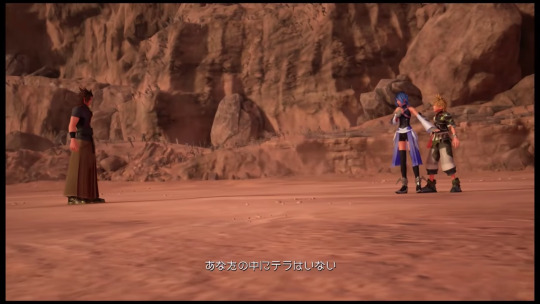
This is the fifth in a series of translation and analysis posts I’ve done about KH3. I’ll be talking about KH3 in the context of Westerns, briefly touch on a possible connection to jidaigeki, go into detail on camera angles and camera shots, and, of course, discuss translation and the social aspects of language.
I’ve broken up this analysis into multiple parts because it was getting so long. This part will cover Aqua and Ven’s interactions with Terranort, the next will cover when he attacks Lea and Kairi, and so on and so forth up through when the Demon Tide sweeps Sora away.
Here’s a general key for the kind of analysis I like to do:
JP: Official Japanese Dialogue
EN: Official English Dialogue
TR: My Translation (usually more literal and thus more stilted than the official English version. I’m not using natural-sounding English in order to stick as close to the Japanese versions of the lines as possible for the purpose of analysis)
Notes: things I found interesting, grammatical points, extra thoughts, etc.
One last note: media doesn’t exist in a vacuum. Every work of art must be viewed through the cultural lens of the people who made it. Kingdom Hearts, for all its ties to Disney, is still very much a Japanese game, so it should be analyzed in light of that.
With that in mind, let’s continue.
Terra’s introduction is like a cowboy in a Western with the dramatic smoke:
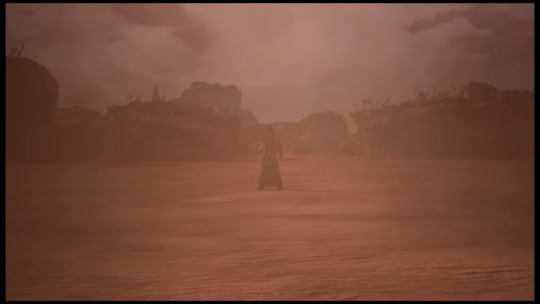
The cinematography of this whole scene strikes me as inspired by Westerns and/or Samurai cinema (chanbara, a subcategory of jidaigeki, or period films). The two genres of film have had a large influence on each other (Akira Kurosawa’s classic Seven Samurai was remade as The Magnificent Seven in the US, for example, and Akira Kurosawa was a fan of the American director John Ford), so this speculation might not be that far off.
This screenshot from the trailer for Seven Samurai, for example, shows a similar “dramatic smoke/dust” moment, which makes me think that this may be a trope in Samurai cinema as well:
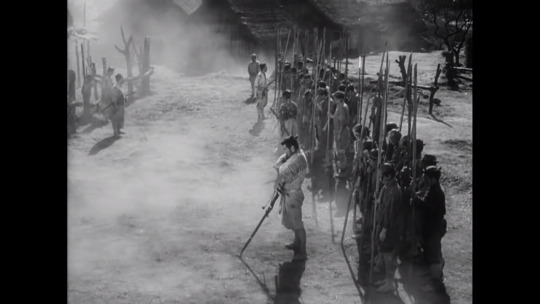
The setting of the Keyblade Graveyard itself calls to mind the setting of a lot of Westerns, with its smoke and dust and craggy hills and desert. The conflict even takes place in a graveyard, much like the final standoff in The Good, The Bad, and The Ugly, one of the most famous Westerns of all time (technically a Spaghetti Western, or a Western made in Italy - in this case directed by Italian director Sergio Leone):
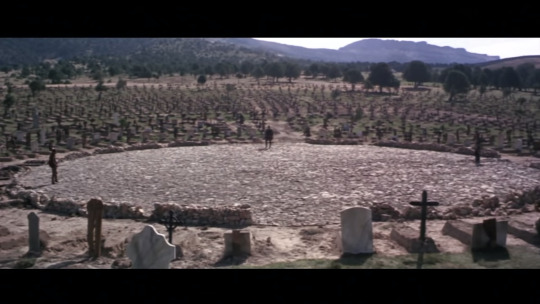
Anyway, continuing on. Terra is here, but he’s looking at the ground and not making eye contact with anyone:
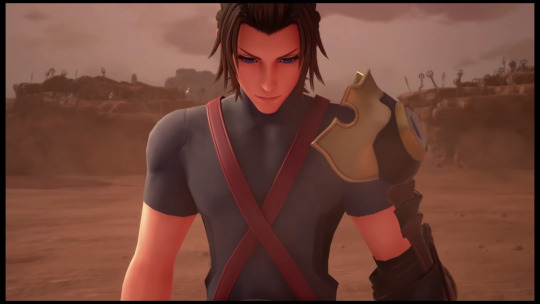
Ven is the first to notice him, and he calls his name...
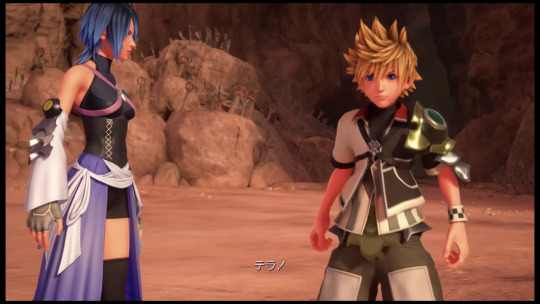
JP テラ!
EN Terra!
TR Terra!
...before taking off after to him, which stresses Aqua out (and rightfully so - can you blame her for being on edge about everyone’s safety here, especially Ven’s?):

JP ヴェン!
EN Ven!
TR Ven!
We get this wide shot of Ven running to Terra while he just sort of stands there:

There are a number of shots like this in the scene that really emphasize the scale of the conflict by showing how small the human players are compared to the setting.
This ties in well to the theme that the characters cannot change their fate - they’re just playthings of it. The Keyblade Graveyard will still be there long after they’re dead, much like how it is still here after all the people who fought in the Keyblade War died. And while Sora does later change fate, he has to face the consequences. Death claims its prize in the end.
Ven latches onto Terra’s wrist, and the camera focuses on their hands:

And then we get this over the shoulder shot that is also at a bit of a high angle to emphasize Ven’s vulnerability:

JP テラやっと会えた!
EN Terra! We found you!
TR Terra! We could meet at last!
Notes: The Japanese phrasing is a little different than the English version, but the same general meaning gets across. Ven is excited to see Terra again. His use of yatto implies it’s been a while, and he uses the potential form for meet, hence why I translated this as “could meet” despite how awkward it sounds in English.
We get this reverse over the shoulder shot from a lower angle to emphasize Terra’s greater size and strength compared to Ven:
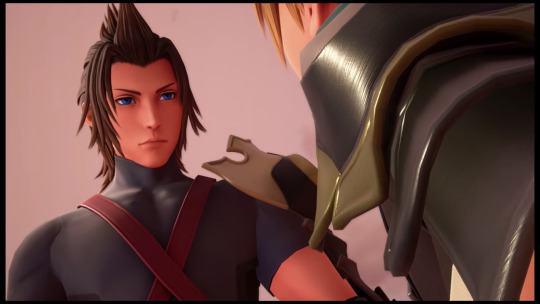
Now, Aqua has Seen Things™ in the Realm of Darkness, and she is quick to ask if this is really the Terra they know and love. No doubt she has in mind the time they met in the Realm of Darkness and Xehanort took control of him:
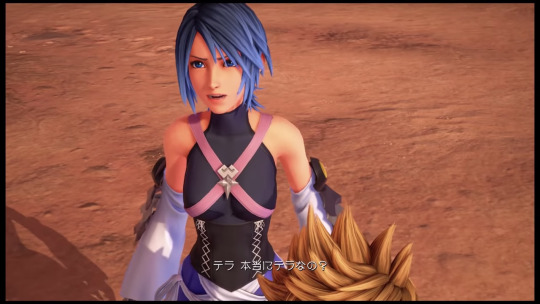
JP テラ 本当にテラなの?
EN Terra, please say you’re in there.
TR Terra, is that really you? (Literally: Is [that] really Terra?)
Notes: Japanese tends to use names more than English does, whereas English favors the use of pronouns, hence why Aqua repeats Terra’s name twice in her question in the Japanese version.
She uses the ~nano construction to check for confirmation - she wants to believe this is Terra, but she has her doubts.
We get this extreme close up shot of Terra’s eyes to emphasize that while yes, they are blue, they seem a little empty and soulless:
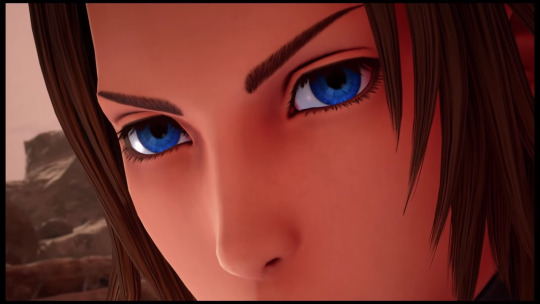
Something I noticed about Kingdom Hearts 3 is that there are a lot of extreme close up shots like this, especially of the characters’ eyes.
Well, as I was doing some research for this analysis, it turns out this type of shot is also sometimes called an Italian shot, named for... you guessed it, Sergio Leone, who popularized it in his Spaghetti Western films.
Here’s an example of this type of shot from The Good, The Bad, and The Ugly:

The emphasis of this type of shot is on the character’s emotions, and it serves to heighten the dramatic tension of the scene. Multiple times throughout the Keyblade Graveyard, we’ll get extreme close up shots like this that have just such an effect.
On a side note, I never noticed this many extreme close up shots in a Kingdom Hearts game before. I wonder if they hired new cutscene director(s) to work on the game who left their unique mark on it, or if the graphics capabilities of UE4 allowed them to experiment around with the cinematography more than they could in the past.
Continuing on, we see Aqua’s reaction to Terra’s soulless gaze:

She immediately moves to put herself between Ven and Terra, selfless to the end:
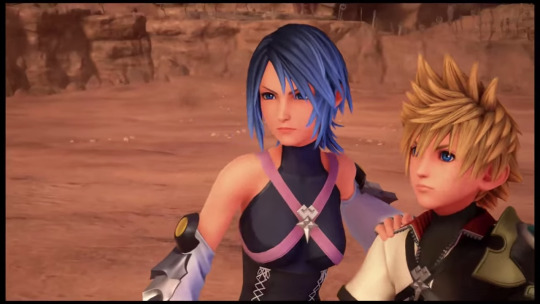
Ven sounds downright annoyed in the Japanese version and confused/questioning in the English version, but Aqua doesn’t care, she’s keeping him safe. Note how tense Sora is in the background:
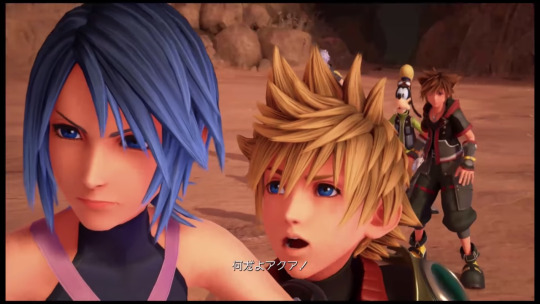
JP 何だよアクア!
EN What gives, Aqua?
TR What(’s going on), Aqua?
Notes: Ven uses the emphatic particle yo in the Japanese version to show his annoyance with Aqua here - they’re finally all together again and yet she’s pushing him away from Terra? What gives?
The camera changes to this wide shot, once again emphasizing the epic scale of this very human conflict:
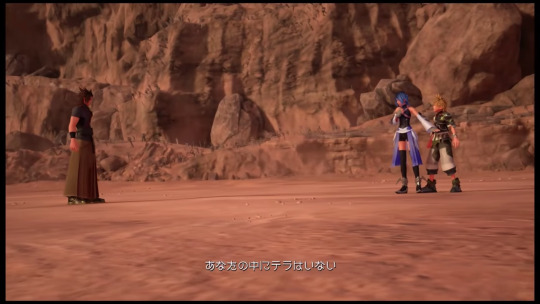
JP あなたの中にテラはいない
EN I know that you’re not him.
TR Terra isn’t inside of you.
Notes: Aqua knows the problem. Terra, or perhaps more specifically, Terra’s heart, is not inside of the body before them now. Aqua sounds angry and frustrated in her delivery in the Japanese version. She’s sick of this happening, sick of Terra still being lost to them.
Ven gasps in this next shot to indicate his surprise:
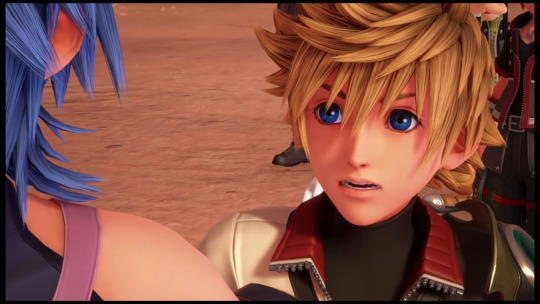
And Aqua sounds very angry/upset in the Japanese version as she commands Xehanort to release Terra. The camera angle is low again to show how Terra is towering over them, to hint at the power imbalance that we will soon see play out:
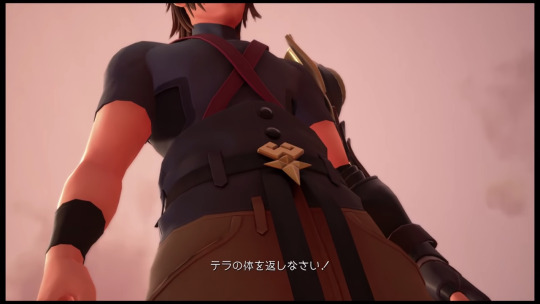
JP テラの体を返しなさい!
EN Now, let our friend go!
TR Return Terra’s body (to him)!
Notes: When Aqua was addressing Terra earlier, she used casual/intimate grammar forms. Japanese has an entire system of conjugation based on social dynamics - there are polite and casual forms of verbs, there are honorifics, humble expressions, rude expressions... all to express the relationship between the speaker and the addressee.
Aqua switches to a more polite form here. This could be because she wants to indicate social distance from Xehanort. It certainly isn’t used to be polite. This isn’t her friend; this is the man who ruined her friends’ lives as well as her own. She commands him to return Terra’s body using the honorific form nasai in a way that sounds like she’s scolding him. It’s possible she also chooses to use this particular command form as a mark of feminine speech, instead of using one of the coarser/more direct command forms at her disposal.
The camera tilts up, still at that low angle to emphasize Terra’s relative size and height advantage, and he (well, more like the heart inside of him) smirks:
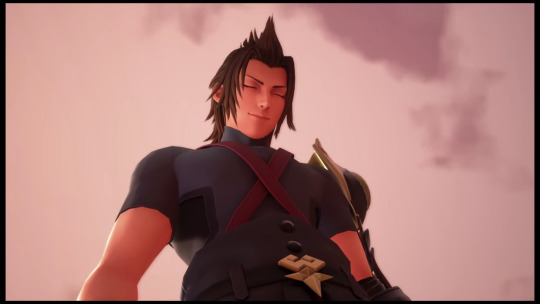
We see his hair change color in a close up shot:
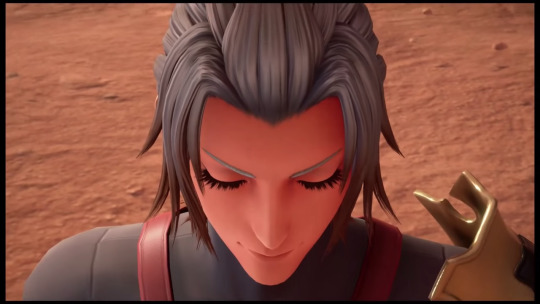
And then Ven’s horrified reaction. After all, he never knew what happened to Terra (as far as I can remember). The shot here really emphasizes his emotions by centering him in the frame head-on:
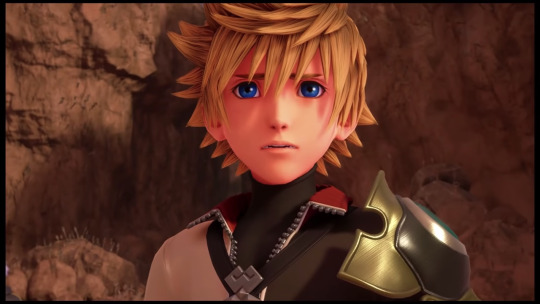
Fate of the Unknown has begun to play, very fitting for this scene, as Terra’s fate smacks Ven in the face (and the audience as well, for that matter). Note how everyone is ready for a fight, even if their Keyblades aren’t out yet. Knees bent, arms outstretched, or, in Goofy’s case, balled into fists:
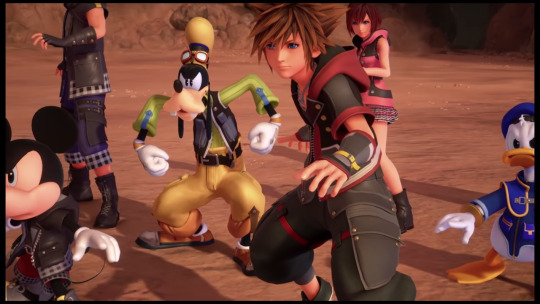
Then we get this close up shot of Terranort’s face. His hair is fully silver and his eyes are yellow, and Mickey proclaims what has become of Terra:

JP これで13人目ー
EN He is their thirteenth.
TR Here is (the) thirteenthー
Notes: Basically saying the same thing in both languages, just worded sligthly differently to sound more natural in English.
Dark smoke wafts off of Terranort as he finally speaks, and it’s not with Terra’s voice:

JP おまえたちはここで敗北する
EN Today is the day you all lose.
TR Here you all (will) lose.
Notes: Terranort uses the derogatory second person plural pronoun omaetachi to refer to them here. He also uses a casual form of the verb suru, indicating familiarity or, in this case, contempt. The word for “lose,” haiboku, can also mean “be defeated.”
Aqua sounds downright angry here in the Japanese version as she responds, and Ven just looks sad. The camera angle is a little off-kilter here (note how Aqua and Ven seem the same height even though they are not, and the characters in the background form a diagonal line): to indicate how “off” this whole situation is (I think this would be an example of a Dutch angle, but in case it’s not, I’ll call this kind of angle a tilted angle throughout this analysis):

JP 何を!
EN What?!
TR What!
Notes: I noticed the dialogue uses a lot of exclamation marks throughout this scene, both in the English version and the Japanese version. Emotions are running high, and all those exclamation marks really serve to show that.
Here we get a shot of Ven’s feet and Aqua’s legs...
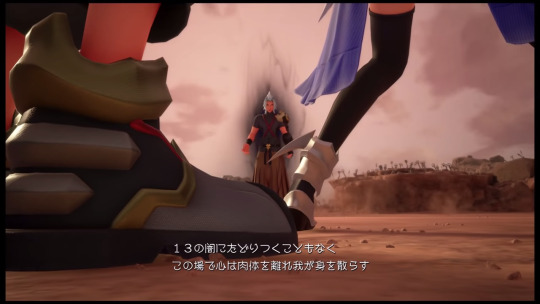
...which is reminiscent of images and posters of famous show-downs in movies, like this one for the 1952 Western High Noon:
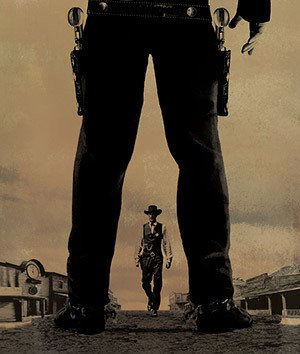
We even see this same sort of shot earlier in this scene, this time with Sora’s legs and Xehanort as the approaching opponent:
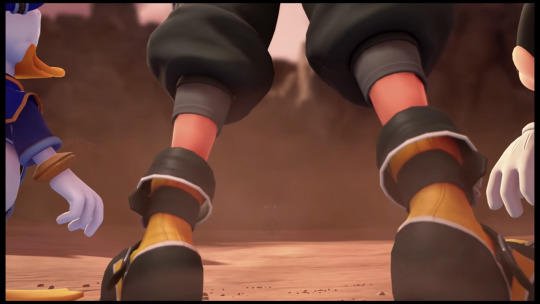
Once again, the framing of the shots calls to mind Westerns.
Moving on to the dialogue:

JP 13の闇にたどりつくこともなく この場で心は肉体を離れ我が身を散らす
EN Before you even face the thirteen, every last one of you will be torn heart from body.
TR Without even reaching the thirteen darknesses, at this place (your) hearts will be separated from (your) bodies (and) I (will) scatter them (literally the bodies).
Notes: Terranort uses a different pronoun than Terra does. He uses ware, which Xehanort sometimes uses (and also sounds kind of old-fashioned), instead of the masculine pronoun ore, which is Terra’s pronoun of choice.
In the Japanese version, two different words are used for “body” here as well, nikutai in the first instance and mi in the second instance, perhaps for poetic effect and/or to avoid redundancy.
Next, he summons his weapon, which is accompanied by more darkness, and delivers this line:

JP だが安心しろ
EN But fear not.
TR But be at peace.
Notes: “Fear not” sounds a little archaic in English, as in modern English we would say “don’t be scared” or “don’t be afraid.” Over time main verbs lost the ability to move in front of negatives in English, and we insert “do” instead, which attaches to “not” to form “don’t,” while leaving the main verb in its spot.
Terranort’s use of an older construction in English like this is very effective at making him sound pompous. In modern English saying “fear not” brings up religious connotations, as a lot of well-known quotes from the Bible are based on older translations (hello, King James version) and thus older forms of the language. Terranort sounds like he’s playing at God, here, in other words. It also makes him sound older, which is fitting for an old man who stole the body of a young one.
In the Japanese version, he uses the command form of the verb suru, shiro, to command them to be at peace. This is a very direct way to command someone to do something, kind of coarse and not at all polite.
The camera cuts to this close up shot of his face:
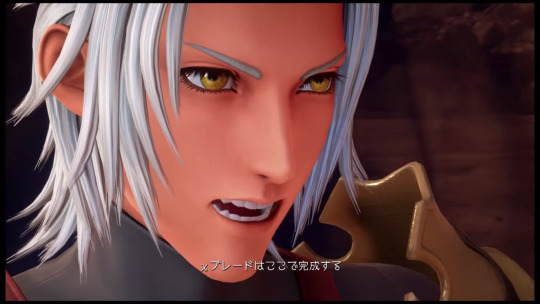
JP χブレードはここで完成する
EN The χ-blade will still be forged.
TR The χ-blade will be completed here.
Notes: Basically saying the same thing in both languages. I like how the English version went with “forged,” though. Fitting for the whole “creating a weapon” thing.
We see, not Aqua and Ven’s reaction to Terranort’s proclamation, but everyone else’s, Sora’s in particular. He is centered in the frame here:
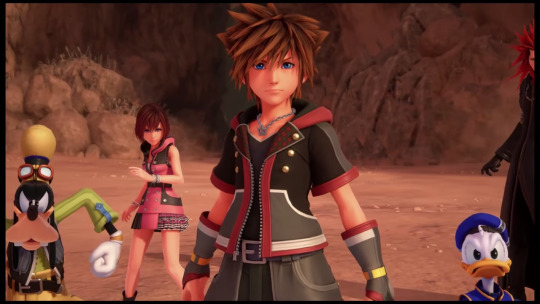
And then we get a closer shot of him to better showcase his reaction. His voice sounds lower here to indicate his determination:

JP おまえたちに負けることはない
EN We’re not gonna lose to you.
TR We’ll never lose to you.
Notes: Sora uses the derogatory second person plural pronoun here, omaetachi. He’s referring to their enemies as a whole as a whole, not just Terranort. Unfortunately this nuance is somewhat lost in English because we use “you” for both singular and plural second person, though regional varieties have popped up, such as y’all, you lot, you guys, youse guys, yinz, etc. to refer to plural “you.”
(For anyone wondering, yes, English did used to make this distinction in the past, much like many modern European languages still do. It was a sad day the English language lost its second person plural pronoun for various reasons that I won’t get into here, but those regional varieties I mentioned have popped up for a reason - it is really useful to be able to make that distinction between singular and plural!)
Sora uses the ~kotowanai construction here to indicate that they’ll never lose to Xehanort and his cronies. He’s absolutely sure of it. And the English version captures his casual style of speech with “gonna.”
The shot ends with him glaring at Terranort:
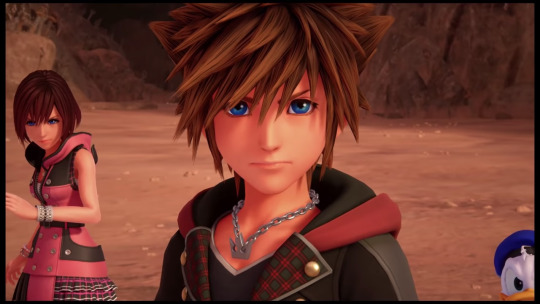
And the camera cuts to Terranort, making what I will call “the Xehanort look” from here on out:

We can see the Xehanort look exemplified by Xehanort himself here:

An eyebrow raised, head tilting forward, eyes looking up - a Kubrick stare to indicate he’s a little deranged.
An example of the Kubrick Stare for reference, from the film A Clockwork Orange. The Kubrick Stare was popularized by the director Stanley Kubrick for it showing up in a lot of his films:

That is a dramatic contrast from the types of faces Terra makes:
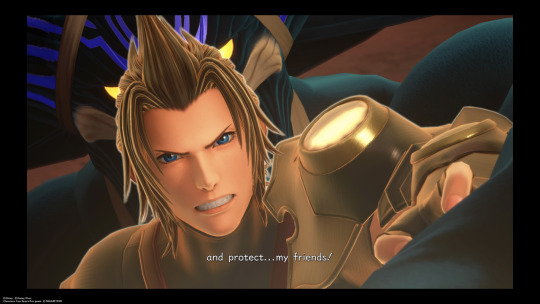
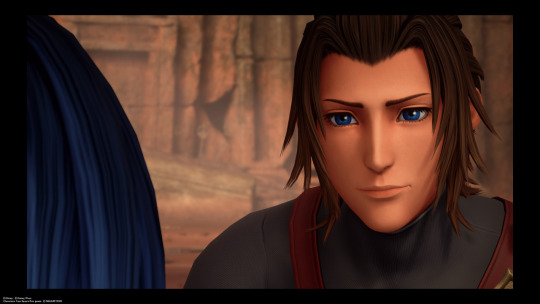


Using Xehanort’s expressions with Terra’s body makes it very clear Terra is not the one in control here, as to my knowledge Terra never makes the Xehanort look. It’s also very unsettling to see Terra acting like Xehanort. It just feels wrong, and that really comes through in how Terranort moves and reacts.
One moment, he’s there...
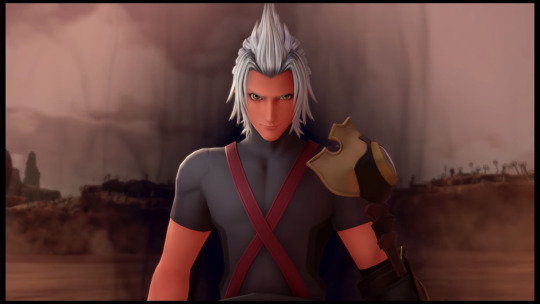
...and the next, he’s gone, indicated by a whooshing noise:

He can move lightning-fast, a fact the slow motion here in the next part obscures a little for dramatic effect. This has also lead to the impression that Aqua and Ven just stood there and did nothing. That’s not entirely true. It’s more like they didn’t have time to do much of anything.
Aqua does, in fact, react to his disappearance; you can hear her make a surprised noise here:

And then he suddenly reappears between her and Ven, indicated by another whooshing noise. Note Terranort’s posture, how he is bending his knee to gather as much momentum to hit Ven with as possible. The scene also goes into slow motion for dramatic effect:
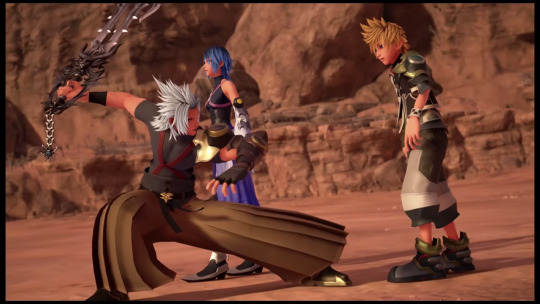
And the camera cuts to him swinging his blade and speeds up a little:

Again, Aqua barely has time to register that Terranort has moved because he’s moving so quickly. Ven is in shock because he would never imagine Terra hurting him. They didn’t have much time to launch any sort of a defense, and while I think Aqua expected Terranort to attack her, perhaps, neither she nor Ven expected Terranort to attack Ven.
Because Ven is like their younger brother, or even their son. In the Japanese version of BBS he downright said he was supposed to bring his parents to Disney Town when he gave Terra and Aqua the passes, not just grownups like the English version went with. And while Aqua and Terranort have fought before, Terra has never laid a hand on Ven. Not as Terra, not as Terranort. Ven trusts him to keep him safe, to protect him. So for Terranort to attack him, well...
It’s kind of like watching a father attack his own son as his wife watches on in horror at what’s unfolding.
The scene goes back into slow-mo as Terranort’s Keyblade connects with Ven, and Ven is folded over from the impact, Terranort hit him so hard. He makes a choked sound of pain, too, like he’s had the wind knocked out of him and can hardly breathe. Note how Aqua isn’t looking in their direction yet because she hasn’t had time to look yet:

We cut to a closer shot of Ven that puts the focus on him as he reacts, and you can see the pain written all over his face:
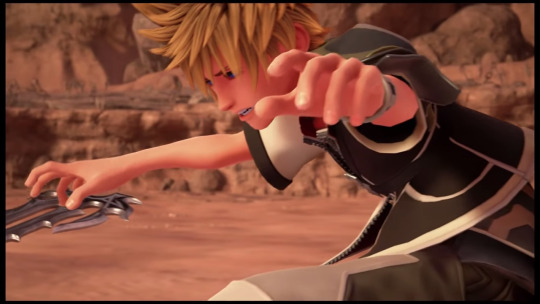
The scene is still in slow motion as he hurtles backwards:

And then the camera cuts to Aqua to show her reaction. She slowly turns her head (still in slow-mo, remember?), and the look of shock and horror on her face is heartbreaking to see:
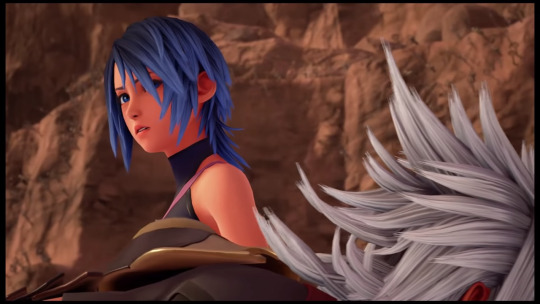

The camera speeds up to normal speeds as it shows Ven being flung backwards, as if this is from Terranort’s POV:
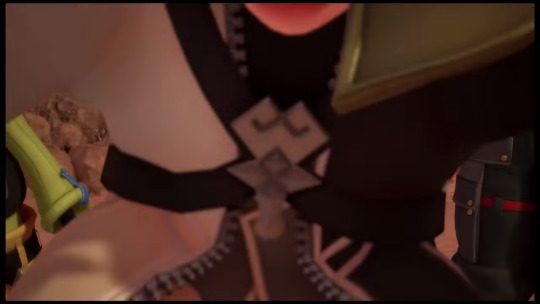
Note how Ven’s eyes are still open, he still seems to be conscious:

And then the camera cuts to a different perspective behind the characters, as if the camera is on the ground. Note how once again the ground is at an angle instead of forming a straight line in this shot to indicate how wrong this whole situation is. We can also see Ven landing on his back with his legs in the air...

...which provides enough momentum for him to tumble backwards:

His body settles on the ground in a cloud of dust, and he no longer seems to be conscious. Note his limp head:

My guess is that landing on his back like that/hitting his head is what made him lose consciousness, as he was conscious before when he was still in the air. Terranort wasn’t necessarily trying to kill him (though I’d argue hitting your head like that would probably be enough to kill you in real life if not in video games), he was just trying to incapacitate him so it would make it easier to take his heart out of his body later on.
Riku provides credence to this theory later on when he tells Sora that the hearts of their friends are still in their bodies. If Ven had died here, that probably wouldn’t be the case.
The camera cuts to Terranort, and he has a downright smug expression on his face over what he just did. The Xehanort look is back in full force:

And it makes for quite the contrast with Aqua’s look of shock and disbelief as she gasps:
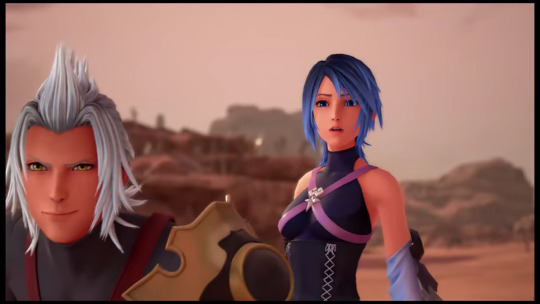
We get a shot from her POV, showing Ven crumpled on the ground:
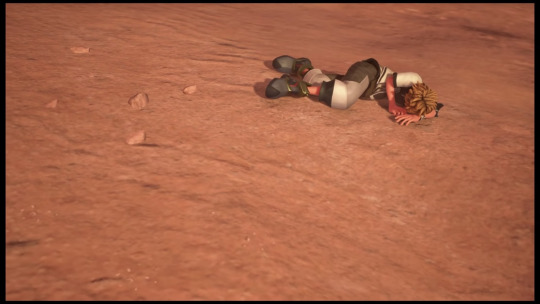
And then a close up shot of her reaction to what has happened to Ven that showcases her emotions, her feelings. This moment is framed in terms of her pain and loss and shock, showing that we as the audience are supposed to empathize with her:
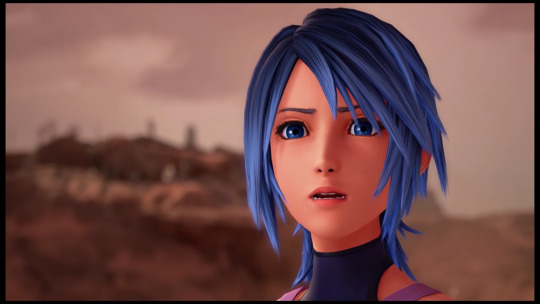
We get a closer shot of Ven that fills the frame, and Ven isn’t conscious:
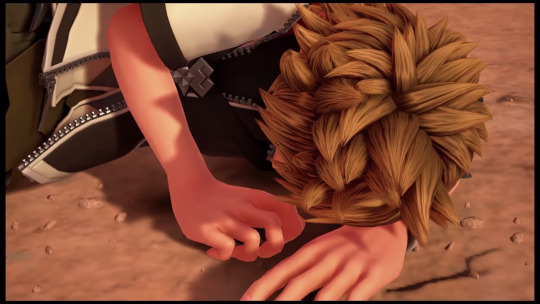
And Aqua has processed everything enough to finally be able to speak:

She calls Ven’s name in a downright panicked manner and leans forward as she does:
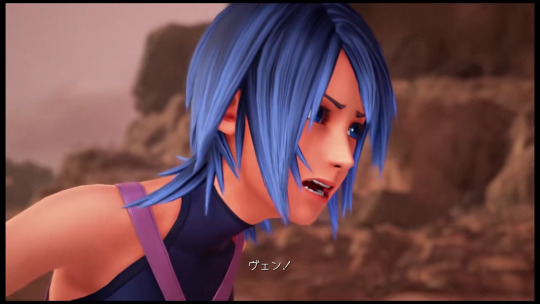
JP ヴェン!
EN Ven!
TR Ven!
To be continued...
#kingdom hearts#terra#aqua#ventus#kh3#kingdom hearts 3#wayfinder trio#terraqua#terqua#kh3 spoilers#kingdom hearts 3 spoilers#terranort#ven#sora#kh translation#kh analysis#kh meta#phoenix plays kh3#phoenix translates#long post#slight terraqua#tagging it just in case
178 notes
·
View notes
Text
2019 Best Japanese OST Press/Repress: Elfen Lied by Tiger Lab Records
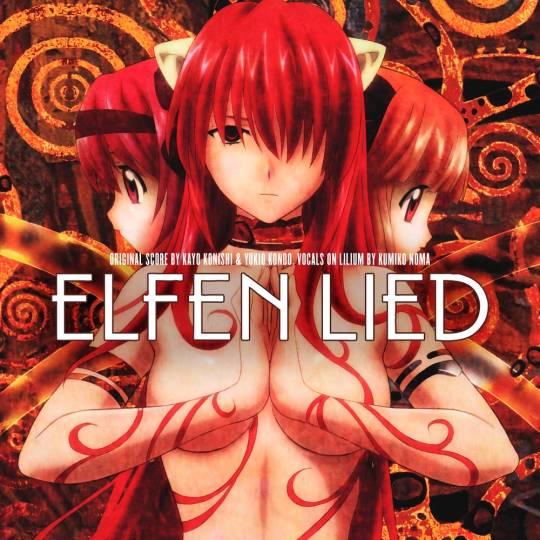
Like many late millennials with artistic pretensions, I used to have an “Anituber” channel back in the wild west days of youtube. From 2010-2013 — roughly corresponding with my first three years in university — I reviewed DVD releases from ADV, Manga Entertainment, Central Park Media, and Geneon — all the big players in Western anime releases at the time, all dead and gone now with the rise of streaming. Everyone but Funimation — a sad irony and perhaps telling about the nature of the dubbing industry that the studio with a serial rape problem and established casting couch was the only one to survive.
In the interest of maintaining my personal ethics, posterity, and sanity I’ve long since deleted that channel. While there was definitely a “moment” on the platform for a nineteen year-old cokehead film student in front of a MacBook webcam doing his best Slavoj Zizek impression, that moment has long since passed. I’ve long since cooled on “substantive” media critique anyway. The world doesn’t need another Eisenstein-aligned Marxist analysis of Neon Genesis Evangelion — or, a 6-part series on using Lacanian techniques to develop a leftist praxis for Fate/Stay Night. Media exists in the present moment to be a salve for the postmodern hellscape we inhabit together.
As an interesting sidebar, the most popular video on that channel — raking in just north of 10k views over its lifetime from 2011-2015, was a twelve minute video essay on the 1995 anime Elfen Lied, where I asserted that it was the ultimate expression of contemporary Japanese anti-modern rage. While I don’t find myself particularly nostalgic for any of the content on that channel, I’m actually kind of proud of that one in particular.
While most of my analysis was fixated on the visuals, narrative, and recent oeuvre of its mangaka, Lynn Okamoto, and series director, Mamoru Kanbei, I did lay out a framework on why I consider it to be one of the most successful soundtracks ever produced for an anime. I did not heap this praise lightly, as that roughly fifteen year period of 1995-2010 was bookended by the OSTs of Evangelion and K-On! — and certainly proved to be one of the most sonically iconic periods that the medium has ever produced.
it was also one of the first soundtracks that spurred my own history of Japanese OST collection.
And, then, almost a decade later, I found out that Tiger Lab was releasing a vinyl of Elfen Lied.
In spite of this, when I originally the news, I felt a tinge of trepidation. This is not to throw shade at Tiger Lab, however — but at the reputation of previous releases of the Elfen Lied soundtrack in Japan. A quick adventure with google translate across the Japanese net for various Elfen Lied OST roleases — especially on CD — will reveal for you a lot of contempt from Otaku and anime-enthusiast audiophiles for any number of reasons. Most hinge on the quality of the physicals. This is often because Japanese physical media releases of anime soundtracks are often laden with fresh, exceptionally crisp and clean-sounding masters for CDs, and usually exclusive posters and other content geared toward the “collector” nature of many Otaku. This has usually not been the case with Elfen Lied.
A friend of mine in Kanagawa quipped “Sometimes it sounds better on the DVD” in regard to a number of OST releases of soundtracks from anime produced by Studio Arms with CD releases published by VAP. Admittedly, some of it must have been born in resentment, but I’ve always trusted the man’s opinion — as he’s invested a small family fortune into building a shrine of sorts to that studio’s output. He chalks up the poor release quality to the studio’s inability or lack of funds to master the content properly for a CD or HQ digital release, and VAP’s decline in release quality during the early 2000s roughly corresponding to a sale to another Zaibatsu. “Studio Arms made hentai for many years to stay solvent, maybe they could not send a good master to VAP [the publisher]” he told me. While I can’t know if it’s VAP, Arms or another studio handling the CD-master work, a cursory check of their oeuvre seems to confirm confirms that claim of his — but I acknowledge I’m wandering into uncharted waters here.
In spite of all that — I ordered the wax from Tiger Lab and was duly impressed. In lieu of reviewing each track as per my usual review format, in the following section I want to talk about my listening experience from the two formats I own the soundtrack in — the SA/VAP published CD from 2004 and Tiger Lab’s release. Once we finish going into the core differences — and why this vinyl is absolutely worth your purchase over competing physicals — I’ll go into the virtues of the listening experience on the whole.
Part 1: Comparisons of Select Tracks
I suppose the expectation is that I start off by taking about the most iconic recording from the series — the OP, Lilium. In the spirit of defying expectations, I’ll begin with what I consider a better litmus test.
My personal shit-test for a good master and press is how well it can handle a track that is sonically robust and diverse, crossing genre and form — requiring an intensive, sufficiently wide mix and refined master. You don’t get that on every OST album — but Elfen Lied offers one such potential track in particular, and that particular track happens to be my favorite composition on the entire album. Uso Sora, composed by Kayo Konishi and Yukio Kondo is a truly magnificent piece, and it’s used brilliantly in the series — for those familiar, I only need to quote one line: “M-m-mommy…?”.
It begins with lulling piano chords that gradually build in tempo and energy with the addition of percussion, and then it undergoes a full metamorphosis in its last minute or so to become an aggressive, frenetic techno piece with distorted lows and an angry drum kit. Mirroring the evolution of its subject in the show with understated aplomb, and functioning as a robust and enjoyable composition divorced from its source — it really deserve more recognition than it receives, but I do not doubt it will ever step forth from the massive shadow cast from the haunting chorals of Lilium, and the brilliantly directed visual intro that accompanied it.
Needless to say, Tiger Lab more than passed muster here, to the point where I’m almost blown away by just how good it sounds compared to the rest of my Elfen Lied related physicals. I experienced a definite brightness from the vinyl master over my stereo that I don't get from a lot of other Western label releases, like say Milano, which tends to cash in on a Westerner’s preference for warmth. Tiger Lab deserves credit for this approach, because it genuinely feels like a more authentically “Japanese” sound. In my experience, the Western labels that care the most about the dedicated audiophile adhere to this sonic profile, and Tiger Lab deserves all due credit here.
Finally, I might as well include my thoughts on Lilium. In short, it sounds fantastic. The mix here really brings out the most of the chorals, and provides crisp and clean sounds where you want them most. It’s also one of those tracks where you can just feel the dynamic range before you even hear it. I ended up listening to these on my Cambridges, and I’ve got to say that’s there’s something in the way they treat this particular profile of song — strongly vocal dominated, extremely muted piano, and supporting string inhabiting the negative space — absolutely incredibly. It put the KEFs to shame. I’ve always asserted that you’ve got to pair certain songs with certain speaker pairs. I’ve never been a huge devotional music guy, and I’m not entirely sure that the Cambridge or KEFs provide ideal profiles for the track. That said, Lilium sounds great anyway.
But I can envision these on a pair of high end Yamahas, or a pair of vintage Blaupunkt bookshelves sounding as stone-cold killer as Lucy when Kouta’s threatened.
I sent a rip to my friend Hiroshi, the StudioArms Shrine man, who immediately snapped up a copy after listening. I also learned that it was actually the first vinyl purchase he’s ever made after two decades of serious collecting. So perhaps that is a testament in and of itself!
Part 2: Physicality
I rarely devote an entire section to talking about the vinyl/OBI itself, but then again, Tiger Lab has put out a release certainly worthy of this. First off, the cover, which pairs perfectly with the overall aesthetic of both the series and previous soundtrack releases. I can imagine this being a release that has already attracted some attention by Japanese collectors, as the cover seems to tap into a certain sense of continuity that I know are a huge hit with that community. It certainly pairs well with my two releases from VAP, and a laserdisc set that I have. They all opt for that very iconic Klimt Vienna Secession style with appropriate creative flourishes — but I like Tiger Lab’s take on it the most. The side characters populating the back in a choral array reminiscent of the Beethoven Frieze is also a really nice touch for any enthusiast of the fin-de-siècle style.
I picked up the pink vinyl on release, one of the few pink vinyls that I’ve bought that at least feels thematically consistent with the release and not just a default “vaporwave” or “city pop” or “future funk” styling. Diclonii rock the pink hair, after all. That all said, I’m wishing now that I got the “metallic gold” edition, as its another color that feels both apropos and stunningly beautiful. With all that in mind, this is also one of the better waxes that I’ve felt in-hand, and manages to feel robust. I’ve yet to find specific info, but it certainly feels like a 180g.
In conclusion, I’ve got to give immense credit to Tiger Lab for handling this release with a class and vigor that few Japanese publishers have given it. It certainly bodes well for the future of anime releases on vinyl, and makes me eager to fill out an emergent collection.
7 notes
·
View notes
Link
Crushing the romance stigma once and for all Romance novel sales tally in the billions of dollars every year. (That's right: billions. With a "b".) And still, literary critics and other various bookish snobs continue to malign the genre, loudly and with great disdain. Why is that? If you ask these folks, they'll tell you romance novels are nothing but badly written trash. So, y'all have read a bunch of romance novels before forming that opinion, I assume? Oh, no, they'll say, noses tipped heavenward. They don't read romance (with all the contempt in the world placed on the word "romance"). Huh. Now I'm confused. Why would people be so openly hostile to a genre they've never read? I think I can tell you why.The romance stigma and genre misconceptions are so deeply ingrained in us as a society that we have trouble overlooking them, even with glaring examples to the contrary. Heck, even bestselling romance authors like Nicholas Sparks hesitate to admit they write romance. Mr. Sparks insists that he writes “love stories”. On his website, Sparks lays out the difference between “love stories” and romance as follows: “It’s equivalent to the difference between a "legal thriller" and a "techno-thriller." In that instance, both novels include many of the same elements: suspense, good and bad forces pitted against each other, scenes that build to a major plot point, etc. But aside from the obvious, those novels are in different sub-genres and the sub-genres have different requirements. For instance, legal thrillers generally have a court room scene on center stage, techno-thrillers use the world or a city as their setting. Legal thrillers explore the nuances of law, techno-thrillers explore the nuances of scientific or military conflict. The same situation applies with romance novels and love stories. Though both have romantic elements, the sub-genres have different requirements. Love stories must use universal characters and settings. Romance novels are not bound by this requirement and characters can be rich, famous, or people who lived centuries ago, and the settings can be exotic. Love stories can differ in theme, romance novels have a general theme—‘the taming of a man.’ And finally, romance novels usually have happy endings while love stories are not bound by this requirement. Love stories usually end tragically or, at best, on a bittersweet note.” I’m sorry, no disrespect intended, but if you’ve written a story in which the romantic relationship between two characters is the focus, you’ve written a romance novel, Mr. Sparks. The rest is just splitting hairs and can probably be construed as you protesting a bit too much. Throwing in a depressing ending doesn’t completely excuse you from the genre. Sorry. So, let’s take a look at the most common romance complaints and see if there’s actually anything to them: Romance novels are badly written I don’t know if y’all picked up on the implied “all” in that sentence, but I sure did. I don’t know of any genre outside of romance where people feel comfortable saying “all” of it is badly written. Are there some stinkers in the bunch? Absolutely. But I’ve also read plenty of stinkers in the sci fi, horror and mystery genres. I suppose my response to critics who say romance novels are badly written would be: have you read all romance novels? No? Well…there you go. And further...if they’re so badly written, why are they selling so well? Romance novels are formulaic I suppose this might depend on how broadly you define “formula”. For example: 1 person + 1 person = love and happiness Is that how a formula is defined? Because if that’s the definition, it could be argued that romance novels are formulaic. It is a somewhat unspoken “rule” that romance novels end with a HEA (happily ever after). But in my opinion, there’s A LOT that can happen in the middle of that particular formula, and there’s about a gazillion ways that particular equation can be worked out. I’ve read romance novels about everyday people with typical problems, and I’ve read romance novels about vampires and witches and angels. All the lovely variations in which the “formula” can be worked out and twisted about sure can make for some entertaining reading. Romance novels are predictable Again with the implied “all”. Sigh. I’m pretty hard to surprise. I knew that Darth Vadar was Luke’s father well before Luke did. I knew that one of the dead people Haley Joel Osment was seeing was Bruce Willis way before Bruce Willis knew. I knew what was going on at The Red Wedding well before Talisa took that knife to the gut. But I can honestly say that more than a few romance authors have managed to throw me for a loop with their plot gymnastics. (I’m looking at you, J.A. Redmerski!) So, are there some predictable romances out there? Sure. Can it be argued that the HEA is predictable? Absolutely. But to those still arguing this point, I have to ask: is your enjoyment of a book dependent on your inability to predict the story’s ultimate direction? Even if you know where the story will end up, can you not just enjoy the ebb and flow of the story, the writer’s word choices, the snap of the dialog and crackling chemistry between characters? If not...well, that’s kind of sad! Why bother reading at all if that’s the case? There’s no plot; it’s all just about sex This is another one of those all-inclusive statements that should just be ignored. Are there some romance novels that are all about sex? Sure. And there are plenty of others that are intricately plotted (author Tarryn Fisher comes immediately to mind here) and meticulously researched. Beyond that, there’s even an entire subcategory of sweet and clean romances (even some Amish romances) that don’t contain any sex at all. Lesson to be learned here: As a rule, “all” and “never” statements are crap. “Real” writers don’t write romance Who gets to define what a “real” writer is? Was there some kind of specially appointed task force for this that I wasn’t aware of? As it turns out, writing is an art. So, just like any other art form, opinions on what is “good” and what is “real” will tend to vary greatly. Everyone is entitled to their opinion, and there are no wrong answers. And just for the record, Jane Austen wrote romance novels. Anyone care to tell her—and her legions of rabid fans—that she wasn’t a real writer? No? Didn’t think so. Romance novels are unrealistic The “unrealistic” criticism usually exists in a couple of different forms: 1. The heroes and heroines are all perfect looking It’s true that as a society, we like pretty stuff. For that reason, you will find an abundance of pretty, seemingly perfect people in romance novels (especially on the covers). But, you’ll also find plenty of people who don’t fit into a perfect Barbie-and-Ken mold. I’ve read romances about a paraplegic hero, a heroine with CP, and a heroine so unattractive the hero is uncomfortable around her until he gets to know and love her. 2. HEAs don’t happen in real life You know who doesn’t believe in HEAs? Unhappy people. It’s true that no one is happy all the time, but to assume that no one ever gets a HEA is insane. There’s plenty of happiness out there for those who are willing to reach for it. And on a less philosophical note, I think romance readers generally understand that “HEA” is just a phrase. No one assumes that the main couple in the story continued to live out their lives without ever having another care in the world. The HEA is just where the story ends. Romance novels are just “bodice rippers” This one stems from a trend in the 70s and 80s that had innocent virgins (mostly in historical novels) on book covers being accosted by burly, half-dressed dudes (often Fabio) who were pretty much forcing themselves on them. Much like clothing and hairstyles, romance novel trends have also changed quite a bit since the 70s and 80s. For anyone who believes that all romance novels are “bodice rippers”, I encourage you to change out of your velour leisure suit, shut off your 8-track player and lava lamp, and venture to your local bookstore’s romance section. You’re in for a big surprise. Romance novels promote abusive relationships I’ll let you in on a little secret, folks. (Come closer…wouldn’t want this one getting out to just anyone) Women sometimes fantasize about being overpowered by a man. It’s a pretty standard fantasy, actually. Some dude (who looks like Thor or Wolverine) overcomes all of her good-girl protests and better judgement with nothing more than the raw animal power of his overwhelming manly hotness. No consequences, no one gets hurt. Does reading about such a fantasy make women prone to asking their husband/partner/lover to abuse and overpower them on a regular basis? No more so than reading To Kill a Mockingbird makes people prone to becoming lawyers, or reading The Bourne Identity makes people prone to amnesia. Typically, readers are capable of distinguishing between fantasy and reality. Critics who spew drivel about romance novels promoting abuse against women seem to think otherwise, though. And further, as I’ve mentioned before, I’ve read a lot of romance novels. A. Lot. The portion of those novels that featured a man overpowering a woman amounts to maybe 2% of the total. It’s hardly fair to assume that all romance novels—or even a majority of romance novels, for that matter--promote that kind of relationship. It’s just “mommy porn” Sorry, but it’s just not statistically possible that all of the billions of dollars’ worth of romances sold each year were read by mommies. Women and men (yes, men read romance, too) of all ages enjoy romances. This statement is just a desperate attempt by critics to shame readers into buying the types of books theythink everyone should be reading. It’s like trying to convince people they should be watching PBS all the time. PBS is a great channel, but sometimes, you need a little HBO. And there’s nothing wrong with that. Anyone who tells you otherwise is just an egocentric bully trying to promote his/her own agenda. Romance novels are silly fluff I’m not going to argue that romance novels are doing their part to cure cancer or end world hunger. (And truthfully, neither are any novels) Some romances are about light subject matter, and others cover much deeper topics such as the grief of losing a spouse, kidnapping and child abuse, murder and even survival in a post-apocalyptic world. And those are just a few examples of the not-so-silly-fluffy topics you can find in romance novels today. There’s plenty more where those came from. Long-story-short, it would appear that nothing is wrong with the romance genre that isn’t also a problem for any other genre, other than what ignorant critics think of it. So, what can romance lovers do to help crush the romance stigma once and for all? Well, the first step is to admit, out loud and to anyone who asks, that you love romance novels. No more sheepishness. No more hiding your romance novels in speculative fiction dust jackets. No more refusing to let anyone see your Amazon browsing history or your Kindle’s contents. Be PROUD of what you read. The second step is to promote the books you read that help crush these myths. That’s what we’ll be doing here at Romance Rehab. What about all of you proud romance readers out there? What other romance misconceptions piss you off? Let’s talk.
8 notes
·
View notes
Text
Dissonance Chapter Three

Description: After spending a year studying abroad in America, Y/N returns to Seoul hoping to greet the familiar city as a new girl. But what will she do when she’s met with old friends she’d rather forget? It seems the strings of fate are determined to test her resolve…and her willpower.
Genre: Fluff and Angst
Pairing: Taehyung x (f) Reader
Word Count: 8.6k
Tags: Badboy!Taehyung, Non-Idol!Au, Rockband BTS!Au, Bassist Taehyung!Au
Warnings: Swearing and mentions of alcohol, although infrequently
A/N: Hello my loves! Here is the third chapter. I hope you guys enjoy it! I had a good time writing it. As always, please don’t hesitate to send me an ask if you want to chat! Talking to you guys brings me a lot of joy, so don’t be shy. I’ll answer all asks within a day of receiving them. And please send me feedback, critique, questions, comments, or really anything! Thank you guys for the support and I hope you all are having a peaceful weekend!
- Mercury
Previous Chapter – Next Chapter
Masterlist
“Emergency house meeting!” shrieked Yuna after a few moments more of gawking.
I stiffened in front of Taehyung and shoved him by the chest back into my bedroom, shutting the door quickly before he could resist me. Haewon set a dining chair in front of the sofa and the two sat down across from it, Yuna resting her chin atop her folded fingers as Haewon sat cross-legged beside her.
“I know you’re expecting me to say this, but I swear on my life it’s not what it looks like,” I said after a long moment as I settled into the dining chair.
Haewon suppressed a laugh and cleared her throat, adjusting the ponytail atop her head. “Um,” she began, eyeing me. “You said you didn’t know V.”
I shook my head. “I don’t.”
“Then who was that?”
“That was Taehyung,” I said, pointing towards my shut door.
Yuna rubbed her temples. “Y/N, I know you just got home and you’re having some weird quarter-life crisis or something, but you can’t bring handsome men to the apartment and undress them without at least giving us a heads-up,” she said with shut eyes.
I shook my head, vehemently waving my arms. “No! No, God. You’re-,” I began, then settled myself with a sigh. “You’re totally misunderstanding.”
“The only thing I don’t understand is why you’re out here with us when you’ve got a guy like that naked in your room-,” Haewon started to said through laughter.
“Enough of that!” called Yuna. “Y/N, explain.”
I nodded. Yuna never said my name more than once like that. “You know he’s an old friend. Kind of. We talked about this at work,” I said, pleading to Yuna’s memory to save me.
“Yes, but why is he wet and shirtless?”
“I told him to give me clothes he needed dried. I figured, like…a jacket. Or his socks. Not his whole…outfit,” I said, scratching my neck. I was beginning to feel like a criminal in an interview with the police.
Haewon cocked a brow. “How domestic,” she said with a smirk.
I gave her shin a sharp kick and she winced before crossing her arms. “Anyway, I’ll have him out as soon as I can. He just…I don’t know, he seemed like he needed someone.”
Yuna looked at me now with concern rather than contempt, and that made my heart ache tenfold. She sighed. “And where was he when you needed someone last year?”
I struggled with the memory that her words conjured, and chose instead to shrug. “One person being cruel doesn’t mean I have to be cruel too,” I said. “How he acts is independent from how I act, Yuna.”
She furrowed her brow and sighed. “As long as you don’t get hurt.”
I chuckled. “I’ve been hurt enough,” I said, and the statement hung between us like an ominous shroud of fog, hovering around at eye level as I excused myself to tend to my not-friend Taehyung.
After having his things dried, Taehyung was quick to exit the apartment. I supposed I hadn’t mentioned that my roommates were both girls, and pretty ones at that, so being exposed to them seemed to have spooked the guy enough not to cause problems. And after that foreboding conversation with Yuna, I was more than ready to wipe my hands of Kim Taehyung and whatever he brought with him. I was content to simply coexist peacefully with him as his sort-of-manager, and to never cross the line of history ever again.
Yuna was right.
And, anyway, I was right too.
I’d been hurt enough.
We parted ways, awkwardly and somewhat cordially, at the front door. I didn’t offer to walk him out, and as the sun slipped below the horizon, christening the advent of twilight, I let him leave with a wave and little else. He seemed frazzled, perhaps caught off guard, and as he left I could see the cogs in his mind turning quickly. I didn’t wonder what he was thinking about. I walked back into the apartment and, seeing the living room clear of all roommates, wandered towards my room, flicked off the light so my bed was bathed in amber and lilac, and fell into the plush comforter face first. I groaned into the pillows, a wordless lament for my own stupidity. Why had I brought him here in the first place? What had possessed me to presume any sort of relationship between us anymore? And why had I opened the door for him to enter my life again?
I rolled onto my side and glanced towards the wall. I registered the vague white outline of my door, the crevices catching grey long shadows as the day slowly, painfully, ended. The door in front of which Taehyung had approached me, that odd contemplation in his dark eyes. I couldn’t put my finger on just what he’d been doing, and when I’d returned to the room I hadn’t bothered to ask. I was rattled from the sincerity in Yuna’s concern, and if it were coming from anyone else I could have easily written it off as nothing. But Yuna…she’d seen a side of me that would scare most anyone.
My gaze drifted sideways until I hit the painting. I raised my brows. Was that it after all? I’d almost forgotten it, propped on the wall with a tack I wasn’t supposed to be using in a rented apartment. The only decoration that I always, no matter what, hung up with care.
Van Gogh’s A Pair of Shoes.
Or rather, a copy of the painting, printed on paper from my dad’s home office and set in a brown wood frame that matched the color of the worn leather shoes in the center. The painting featured a pair of worn leather working boots, and brought with it a sense of somberness in deep, cool browns and melancholy yellows. When I’d gone to America, I’d made it a point to visit the Met Museum in New York, intending to see the painting in person. I’d arrived there in December during the snowy season, utilizing my Christmas break not to return home but to go in search of the original piece. To my dismay, the painting they had wasn’t A Pair of Shoes, but rather just Shoes. A pretty piece, showcasing a pretty — but different — pair of shoes, this painting of Van Gogh’s didn’t inspire the same feeling as my printed copy did with its bleeding ink and uneven white borders.
I sighed, staring at the thing. Of course, that was what Taehyung had noticed after all. It wasn’t me. It had never been me to begin with.
“Y’know what Heidegger says about this painting?”
Taehyung tilted his head to the side, observing the print with great thought. “No.”
“He says it is an example of sublimity. That the painting means more than what it looks like,” I said.
He turned to me with a smirk. “That’s a little far for a pair of shoes.”
I shrugged. “He says that the shoes tell the story of the person who wore them, that they reveal something very deep about humanity. The toils and the struggles, the uncertainty of the working class. He says it’s an important piece.”
We stood in the dusty back corner of the art supply store at which he spent most of his free time working. They’d recently purchased a print of the painting and had mounted it in a frame, intending to sell it. But instead of being sold, the painting became fodder for two pretentious teenagers with a penchant for art. Perhaps not the intended use, but during that cloudy November day I was happy to be standing with my best friend, pontificating on the thing.
“I kind of get it,” said Taehyung. He was the real artist between us. He knew a lot about a lot of pieces, and he was a fan of Van Gogh in particular. “Like…after a long day working, this person kicked off their shoes without even propping them against the wall. They’re probably a very diligent person.”
“Let’s be like that.”
He raised his thick brows at me, his dark bangs tickling his eyelids. “What do you mean?”
“Let’s work hard for our goals. Like…let’s put our whole effort into it, so that at the end of the day when we kick off our shoes we can say that we did our best,” I said, contemplating as I stared up at the print, the dim lighting doing it no justice as it sat coldly behind the gauche paints.
He thought a moment before smiling slightly. “A bit idealistic…”
“There’s nothing you can’t do if you work hard,” I said.
He laughed and ruffled my hair, causing me to cringe and slap his hand away with a scowl. The frown slipped from my face, however, when I saw the bright smile on his face, the way his eyes squinted and his cheeks bloomed. I softened. “Alright. Let’s work hard together then, okay?”
I nodded, grabbing his hand and giving it a very firm shake. He laughed as he returned the gesture, big fingers wrapping around mine and holding them tightly for just a moment too long.
He was right though.
It was too idealistic after all.
“Bad night’s sleep?” asked Mijin the next day, looking at me with a sad smile as we sat beside the backstage vanity.
I nodded. “That obvious?” I asked, examining the long bags beneath my eyes in the vanity mirror, the ones my concealer did little to cover. She opened her mouth to reply, but I beat her to it with a sigh. “No, don’t answer that.”
She laughed and gave my shoulders a gentle squeeze, standing behind me as I sat, taking a short break from running around the venue cleaning and setting up equipment. “You look fine,” she said, then gave a wink. “Fine fine, you know?”
I rolled my eyes and stood, but couldn’t help the smile that touched my lips. I had put in a little more effort than usual. I was hoping that, with the help of his endorphins onstage, Hoseok might take notice of me, might see me in a different light or something like that. I’d dressed nicely, raiding my unpacked luggage and Haewon’s closet for something fun, flirty, and a little but edgy. It was a hard sell, but I felt like with the right attitude I could pass for a cool rock band’s manager.
“The guys won’t be here for another thirty. Wanna grab a snack or something?” she asked.
I raised my brows. “Is an hour enough time for a soundcheck and styling?” I asked.
She shrugged. “Not really, but they make it work.”
I furrowed my brow and rubbed my forehead. Another issue I’d have to take up with Sunny. “Alright. Um…and no. I’m okay. You go on ahead,” I said with a smile her way. Tonight, she sported bright blue contacts, dark eyes, and a blood red lipstick. I wondered how she managed to keep it off her teeth.
She nodded. “I’ll see you in a few then.”
“Will do,” I said, stretching and meandering out onto the stage where Sunny was fretting over where to place the boys’ water bottles so they wouldn’t stand out or trip anybody.
She backed away from a mic stand, still crouched as she adjusted the water bottle, and her bottom, clad with a white pleated skirt, bumped into Jimin’s guitar stand on which, of course, Jimin’s guitar rested. I was quick to act, sprinting towards the falling instrument with my hands extended. I landed in a heap, fingers splayed out on the concrete stage, guitar settling with a painful clatter into my arms. For a brief moment, all was still and silent. And then I exhaled, bowing my head down between my arms as I laid like a seal on my stomach.
“Oh!” exclaimed Sunny, turning to face me with wide, horrified eyes.
I glanced up at her and gave her a grin, shaking my head. “Don’t worry. I got it.”
She fell to her knees beside me and guided the guitar back onto its stand, leaving me to pick myself back up and sit in front of her. “Jesus! I’m so sorry. I was too focused-,”
“It’s fine. No harm done,” I said, laughing. “Kinda funny though. Not the sort of slide one normally does onstage.”
She smiled. “Well I’m glad you did it. You saved my skin.”
I laughed. “One of us in debt to Bangtan is bad enough. We don’t need another indentured servant.”
“Sunny!” screamed a voice from below, offstage.
We both turned to face the source of the call and found Mijin standing in front of the tall stage, thrumming her fingers on her thigh with a smile. “Snack run?”
Sunny raised her brows and shook her head. “Oh, no. I’m way too busy-,”
“Sunny it’s fine. I’ll set up the water bottles,” I said, shooing her with my hands.
She glanced at me. “Are you sure?”
“What are assistant managers for?”
She pouted slightly and nodded before sliding to the edge of the stage and hopping down to meet Mijin. I tried not to jump as her feet hit the ground solidly, and tried not to imagine the way her nerves might have traced a string of pain up each calf upon impact. The two girls gave me pleasant waves over their shoulders as I continued to sit in front of Jimin’s guitar. I returned them and, as soon as I was certain they were outside the dim building, I winced and gripped my left hand. It seemed that as I was falling, that particular palm had taken the weight of the landing. Some of the skin had peeled back, revealing pinkish flesh and dots of blood. I shook my head. What would the owner of A Pair of Shoes do? Would she lament her skinned hand and cry about it or would she get back to work?
I stood to my feet and positioned Jimin’s water bottle back a ways so it wouldn’t be in the way. I moved around the stage, settling things so they sat just so, placing bottled water here and there, making sure each member could grab for one when needed. It wasn’t a particularly riveting job, but it was a necessary one. The last thing we needed was Kim Seokjin toppling over from dehydration during the middle of a set.
It took me several moments of working around the stage, passing around in circles, to notice that after having moved certain things — a water bottle here, a drumstick there — some choice items were not as I left them. I furrowed my brow and looked down at Jimin’s water bottle, the one I’d placed meticulously just beside where his foot would be. It was now conspicuously askew, sitting nearly in front of his mic stand. I stared at it, trying to riddle out just how it had become this way.
“Poltergeist,” I whispered to myself with a nod.
“Not that I know of,” said a voice from behind me.
I shouted and turned around, hands raised to attack my aggressor. “Ah,” I breathed, lowering my hands as a smile took me over from the inside. “Hoseok.”
He stood before me dressed in a leather jacket, a long plaid scarf dangling around his shoulders and grazing his hips, a pair of black Doc Martens on his feet and a black cap atop his fluffy brown hair. “Hey there, Miss Manager,” he said with a bright smile.
I laughed and shook my head. “Assistant manager,” I said, then pursed my lips. “Co-manager if you’re generous.”
He laughed at this and took a deep inhale, grinning. “You were working so hard I had to tease you.”
“You followed me around the stage?”
“I was seeing how long it would take for you to notice,” he said.
I smirked. “And how long did it take?”
“Two minutes and,” he consulted a watch on his wrist. “Thirty-seven seconds.”
I raised my brows. “Dang. Am I really that unobservant? I’m ripe for the murdering,” I said as I crossed my arms in thought.
Hoseok shook his head, adopting a stern expression. “Hey! Nobody’s murdering you if I’m around.”
My stomach fluttered with butterflies and I grinned. “Why are you here by the way? You don’t need to be here for another twenty minutes.”
His smile turned bashful and he led the way to the edge of the stage where he sat, swinging his long legs out over the side so they dangled. I joined him, falling beside him and letting my heels hit the front of the stage every now and then. “Well…I feel like I haven’t been able to really talk to you much since you started working with us,” he said, turning to face me with a sly wink. “I wanted to make sure you felt welcome!”
I laughed and averted my eyes to my lap, face warming at his words. “Well thank you. I feel very welcome now.” I wrung my hands as they rested atop my thighs, but winced at the tender skin on my left palm rubbed against my right.
“Oh!” said Hoseok, quick to grab for my hand. “Are you hurt?”
I flushed and looked towards him with rounded eyes. “Um…,” I began, unable to form a proper sentence with his dark brown eyes on my hand, his warm skin on mine, his soft brow furrowed. “N-Not really.”
His eyes flashed up to meet mine and he shook his head in disapproval. “You are,” he asserted with a scowl. “God, Y/N, how did this happen?” he asked, running a thumb gently over the raised skin.
I cringed a little in pain and shook my head. “It’s nothing. Just…fell.”
He sighed and, using one hand to keep my palm elevated, rifled through his front pocket with the other. Quickly, he produced a bandaid from the depths of his light jeans and turned back to me with a determination in his jaw. “Here,” he said, blowing on my skin and causing it to ache. “There’s dust in it,” he scolded, giving my wrist a light chastising tap.
I couldn’t help but find him adorable as he pored over my injury with all the seriousness of a surgeon. “You just happened to have a bandaid for me?”
He nodded, still too focused on cleaning out my wound to look at me. “Always do.”
I raised my brow. Something so simple revealed an awful lot about a person. Was he someone who was that caring and thoughtful towards others? I began to wonder with insatiable curiosity with what colors he saw the world. “Thank you,” I murmured as he finally smoothed the bandaid over my skin, his long fingers grazing over the rest of my palm before letting it drop to my lap.
He met my eyes and gave a bright smile. “Don’t mention it,” he said, shaking his head. “Wouldn’t want our manager getting hurt.”
“I’m not your manager and I was already hurt to begin with,” I said, laughing.
He gave my forehead a light flick. “You’re awfully sassy!”
I shrugged. Had it always been so easy to talk to Hoseok? The other day it had been downright awkward. But now, somehow, it felt natural. Was it the lighting? Perhaps I really had done a good job choosing my outfit? “And you’re awfully thoughtful.”
His smile faltered and, for the briefest second, I saw a flash of something I couldn’t identify. “I’m not really,” he said with a shy laugh, looking down towards his feet below, dangling above the ground. “The other guys are much more thoughtful than me.”
I raised my brows. “Oh, I promise you they’re not,” I said, laughing. “I know most of them pretty well and I can guarantee you the only thought in Jeon Jungkook’s mind is how many days in a row he can wear the same white shirt.”
Hoseok laughed, a guffaw really which echoed with great force around the room. “How did you know that? Do you have a camera in our apartment?” he asked with an accusing finger poking my cheek.
I laughed with him. “Damn! I’ve been caught!” I said, scooting away from him slightly to get some distance.
Except when I backed away he advanced closer. I kept pushing myself further and further until there was no more further at all, my right side hitting the wall adjacent to the stage, Hoseok’s body pressed close to mine, thighs touching, arms squished close together. I felt myself becoming hotter beside him, a blush warming my entire skin. I turned to look at him slowly, as if any sudden movement may ruin the moment, may awaken me from the daydream. Only when I did look at him, I found him already looking at me with a smile. He’d trapped me against the wall, leaving me with only one option of escape: jumping off the stage like Sunny had.
He leaned closer to me, our faces nearer than they’d ever been before. “No spies,” he said lowly with a smile.
I blinked rapidly, lids fluttering as I struggled to maintain such intense and playful eye contact. He had a sort of energy that was difficult to match, and while I liked to play around a fair bit myself, I was much too serious to keep up with him. Even inches away from me, I felt nothing but an innocent mischief from him, no longing, no lust, no…anything. But my own heart began to race at our proximity, and that heart — dangerous, treacherous thing — conjured an image of Taehyung in my mind, standing even closer than Hoseok sat now, his eyes distant, his body emanating a heat I hadn’t felt in years. I shook my head, wishing I could just give myself a firm slap and banish all thoughts of Taehyung from my head altogether. Especially when I had a guy like Hoseok sitting in front of me, looking me right in the eye with a smile I’d never seen so close-up before.
“Whoa!” shouted a voice I recognized immediately.
Thank God for Park Jimin. Both Hoseok and I turned to face Jimin as he stood below the stage, gawking at us as he laughed and clapped Jungkook’s shoulder. I flushed as I noticed that not only had Jungkook and Jimin been present to witness Hoseok and I together, but Taehyung was standing beside them as well, arms crossed and brow set straight, jaw taut against his neck. What sort of expression was that?
“Children!” shouted Hoseok, quick to hop off the stage like Sunny had, landing squarely on his feet and rushing towards Jimin before throwing his arms around the younger boy’s shoulders.
I could see Jimin’s face contort with feigned discomfort as Hoseok clung to him, and his eyes beseeched me from below. I could do nothing but smile and laugh, following the pace that Hoseok set as he played with the others. Perhaps I’d been too serious after all. He seemed just as touchy with Jimin as he had been with me. Perhaps I was reading too much into it, just like I’d done with Taehyung.
The very same Taehyung who looked up at me now with a frown.
I met his eyes with an indignant stubbornness, raising my brows and crossing my arms as if to ask what his problem was. As I did, Jimin began to moan about Hoseok being too close, pushing the boy away by the chest as Hoseok, persistent, continued to grapple with Jimin’s limbs to find purchase somewhere.
“Hoseok likes me too much!” he shouted, eliciting a laugh from me.
“You’re a likable guy,” I said, making my way to the stairs on the side of the stage so I could join the guys.
Jimin was still caught in an uncomfortable tango with Hoseok who, having found a victim, was unwilling to relent. “Hoseok,” whined Jimin.
Jungkook chuckled and took up my left flank. “Panicked gay,” he commented in my ear.
I thought I’d been the only one to hear it, but Jimin turned to us with a gape. “Excuse me! If I’m panicked gay then what are you?”
Jungkook’s teasing smile turned to a proud smirk as his spine straightened and he crossed his arms. “Confident het.”
A long moment of silence passed between all of us, Jimin’s gaze switching from Jungkook to me and then to Hoseok who by then had stopped squirming, his arms hooked around Jimin’s neck. Even Taehyung, standing at the edge of the group, had widened his eyes to stare at Jungkook. The quiet was incredulous from all angles.
Until one of us, I can’t say who for sure, began to laugh. At first, it was breathy, cough-like laughter that they tried to disguise, but before long all of of us were laughing like a pack of wily hyenas. Hoseok even released Jimin to grip his side with the force of his laughter. I glanced towards Taehyung in the fray and saw that even he had a smile on his face, one that seemed almost painful on his face as if he were trying to push it back down.
“Confident het,” repeated Hoseok, wiping beneath his eyes to keep from crying.
Jungkook, visibly affected and visibly offended, turned his scowl towards me. “It’s true!” he defended, his words elongating at the end as he complained. “I took a quiz online!”
This only caused our laughter to grow in volume and intensity. Wordlessly, we’d completely dismantled Jungkook, and we couldn’t help but laugh more at his reactions. Of course, predictably, he was rushing to each of us, pushing our arms with knitted brows and insisting that, yes, Buzzfeed was a legitimate method of classification.
We continued to laugh, none of us able to sate the amusement, until the front door of the venue opened, letting twilight pour into the room. Mijin stood beside Sunny, two plastic bags of snacks in their hands, and pointed laboredly towards the boys.
“You’re here! Good! Get to the back and I’ll start on your makeup,” she commanded with a smile.
The guys shuffled past me towards the stage. All of them but one. Taehyung hung back, hovering beside Sunny as she spilled the contents of her plastic bag onto the ground, sorting through it as she crouched.
“Oh! We got you a drink, Y/N,” said Sunny from the floor.
I approached, gingerly at first so as to avoid Taehyung’s eyes, and crouched beside her. “You didn’t have to do that,” I said, laughing.
She shook her head and extended a carton of banana milk towards me. “Nonsense. You’ve been really helpful,” she said.
I grabbed it and tried not to let it show how pleased I was. It was odd, but receiving recognition for my efforts made my heart feel warm and tingly. It always had. “Thank you.”
“Can I talk to you?”
I glanced up to see Taehyung still standing nearby, staring down at me with seriousness in his dark eyes. I sighed. “You need to get your makeup done-,”
“Mijin can’t do four people’s makeup at once. Let’s go.”
“And what if I say no?”
He sighed and set his jaw, staring down at me with a loaded gaze. “Come on,” he said simply. Two words and I was disarmed. He knew I wouldn’t say no.
I swallowed, staring at the banana milk in my hands, begging to be drank. I glanced at Sunny too who was still too occupied with sorting her snacks to pay me much mind. I wanted nothing more than to sit beside her on the cool concrete floor, chat about nothing, drink my milk and thank her properly for taking the time to buy it for me.
I stood, setting the milk on a chair near the stage. “Fine,” I mumbled, following him with crossed arms towards the back of the venue, concealed in shadow and lacking in foot traffic.
It was in the dark, quiet corner that Taehyung finally showed me something I recognized. Unfortunately, it was an expression that I wished could have been replaced with something else. His jaw was set, his mouth screwed to the side, his eyes focused on something distant behind my head. It was the look he had when he was about to tell me something hurtful.
“Stop hanging out with Hoseok,” he said.
I scoffed. “Don’t be a cliche, Taehyung.”
He shook his head, catching my eyes briefly before he looked down. “I’m not. I’m saying this for him, alright? Not for me.”
“What…why would me avoiding him be a good thing for him?” I asked. “You’re not making sense.”
He huffed and shifted his weight from foot to foot. “If you’re just spending time with him to get to me you’re being stupid and it’s not gonna work,” he said.
I exhaled and let a sad smile part my lips. “Ah,” I said. “Finally, it comes out.”
He shook his head. “Nothing came out, it’s just the truth. We both know you have complicated feelings for me. Using Hoseok to rile me up is childish and it won’t work.”
I rolled my eyes. “Did it ever occur to you, like ever, that not everything in the world is about you?” I asked quietly, trying to keep my tone from rising.
“You’re being defensive.”
“I wouldn’t have to be if you weren’t attacking me,” I said. “Things change, Taehyung. Whatever feelings I had for you have become much less complicated since I’ve been away.”
He raised his brows. “Then why are you always looking at me?”
“Because you’re always looking at me!” I shouted, throwing my hands in the air. Before I could become too upset, I took a steadying breath and gripped the bridge of my nose. “Alright, listen,” I began again. “I have every right to be friends with Hoseok or not be. That’s my choice. And to be frank, I’m pretty offended that you take me for someone who would use another person like that. After everything we’ve been through together, I figured you’d at least have…some loyalty towards me. I figured you knew me at least a little bit.”
At this, Taehyung paused and his body went still. His eyes shifted towards me, softer this time, and his arms fell to his sides. “So…you just like him? It’s not some…weird revenge?”
I nodded. “I think he’s a nice person. And what I think of him beyond that is not your business,” I said, surprising myself with the sternness in my voice. “I don’t have time to waste being petty and trying to get back at you for something you did a long time ago. As far as I’m concerned, we’re nothing to each other. So I’d appreciate it if you just…leave me alone.”
He sighed. “Wait, Y/N-,”
“No,” I said. I laughed to myself, not because anything was that funny but precisely because it wasn’t funny. Not at all. “You don’t get to come at me and accuse me of something awful and then pull that innocent face like you did nothing wrong.”
His face, although innocent in the roundness of his eyes, the knitting of his brows, revealed something else. Perhaps a somberness? Melancholy? “I’m sorry. I shouldn’t have been so quick to assume. But you have to understand, Hoseok’s circumstances aren’t something you want to play with if you’re not serious.”
I tossed a look towards him, searching for any insincerity in his expression, and found nothing but a dimly lit boy who looked like he had a lot to say. “You’re…this scared for him? You’re scared he’ll get hurt?” I asked.
He nodded. “He’s my friend,” he said. “Of course I am.”
I felt a pang in my stomach, a painful one, and nodded my head. Many things were becoming clearer the more time I spent with the new Kim Taehyung. “I see,” I said. If this was how he treated his friends, then…
Maybe we’d never been friends after all.
Yuna and Haewon met up with me after the concert, having ordained that tonight was the night we’d finally go out together and get some food together, maybe have a few drinks, catch up properly. I stood in the venue’s back parking lot, swaying side to side as I awaited my friends and felt an arm drape around my shoulders before I could register who’d done it. I turned to see Jimin smiling beside me, or at least I thought he was smiling. He sported a black face mask which concealed what I assumed was his smile and was peering down at me through squinted eyes.
“Hey,” I said.
He tossed his head back toward the venue. “The guys are coming. You eating with us tonight?”
I shook my head and sighed. “No,” I said. The thought of sharing a table with Taehyung had me nauseous. “I’m meeting Haewon and Yuna.”
He pursed his lips. “Aw,” he pulled his face mask down to reveal a pout. “But we’ve been wanting to eat with you. To celebrate.”
“I don’t know if it would be much of a celebration with me there,” I said, letting my smile falter.
He squeezed my shoulders and shook me a little. “Hey! You’ve been gloomy since before the concert even started. And we performed really well too! What’s wrong?”
I briefly considered telling him everything, all the details I’d spared him from over the years for fear of influencing his friendship with Taehyung, but held back as the back door swung open and Hoseok walked out, arm hooked around Namjoon’s neck. Perhaps it was a deus ex machina, and I didn’t realize it. Sharing the story with Jimin might have done him more harm than it did me good.
“Oh! Y/N!” exclaimed Hoseok, brimming with post-concert energy. He approached me with a bright grin. “Are you coming out with us?”
Once again I shook my head. “No. I’m meeting with my friends.”
His brows raised and he tilted his head to the side. From above, the streetlight cast a yellow glow upon his skin and, even though the color was harsh, the way the nighttime reflected in his eyes and the light caught the browns in his hair made my heart flutter just a little. He looked at me like he was looking at a peculiar painting, one that caused the wheel in his mind to turn. I’d never been looked at that way before: like I was interesting.
“Well, they can come too!” exclaimed Hoseok.
“No, no. We’re okay on our own-,”
“Come on! It’ll be fun! And I wanted to chat with you a bit more,” he said with a wide smile.
Namjoon shrugged his friend’s arm off of him and gave me a smile too. “I should buy you a drink or two to apologize for roping you into all of this,” he said, his tone insisting.
I glanced between Hoseok and Namjoon, then looked back at Jimin whose face was squished into a pleading pout. “I…,” I began, taking a look back at Hoseok who by then was nodding his head to encourage me to speak. The door swung open once again and out walked Jungkook, Jin, and Yoongi followed by, of course, Kim Taehyung. He looked like a dream, wearing a big sweatshirt and ripped jeans, eyes still dark around the corners from stage makeup. “I don’t think it’s a good idea.”
“What’s not a good idea?”
I turned towards the parking lot to see Yuna standing in front of a distracted Haewon, both of them dressed for a night out. I shook my head. “Nothing. Let’s go, hm?”
“Come out for drinks and bar food with us!” whined Jimin in my ear, sending the plea towards my roommates.
Their will was weaker than mine. “Oh! Can we?” asked Yuna, looking at me. Her expression was so gentle, so innocent. She looked like wanted nothing more.
And I was an obstinate old stick in the mud. “Yuna…,” I started.
Haewon saddled up beside me, taking up my left shoulder and placing her chin atop it. “Come on! We can’t say no to drinks with seven handsome guys,” she said, casting a look somewhere in the distance.
I rolled my eyes. “Can’t we just-,”
“So it’s settled!” called Jimin, releasing me so he could clap his hands a few times. “To the bar!” He began tromping through the parking lot like a captain leading his crew through difficult waters.
The group followed easily, keeping pace with the small Jimin. I was left standing beside the door alone under a lonely streetlight. Even Mijin and Sunny emerged from inside and took up the back of the large group. Large…
Perhaps it was large enough now to avoid Taehyung.
I sighed and slung my satchel across my chest, jogging to catch up with the others and easing into conversation with Sunny and Mijin about which of the Big Three K-pop companies was the least evil.
“I think YG is pretty good.”
“But remember when TOP had that weed scandal?”
“Weed scandals aren’t the same as all of SM’s lawsuits,” defended Mijin.
Sunny scoffed. “Explain NCT then, hm? Handsome, talented, nice-,”
“Y/N, what do you think?” asked Mijin, not even entertaining Sunny’s talk. Sunny gaped before quickly focusing on me. “YG right?” she said.
“I like DEAN,” I said quietly, my mind elsewhere.
“No! Y/N, DEAN’s an artist and we’re talking about companies-,” started Sunny, launching into a lengthy explanation of the Big Three which, of course, I was already aware of. I was content, however, to let the two of them talk so long as I could settle into thought, taking up the back of the group and staying far, far away from Taehyung.
“No!” yelled an inebriated Kim Seokjin, holding the cap of our soju bottle close to his chest, clutching at the white fabric of his shirt.
We’d spent the better part of a half hour playing flick the cap, a Korean drinking game I’d learned through Jimin in high school. We’d worked through several bottles of soju this way already. The objective was to not be the one who flicked the extra plastic bit off a soju cap, because if you were the unlucky one with a strong finger, you’d be forced to drink a shot you might not be ready for. Such was the preferred method of getting drunk amongst Jimin, Jungkook, Yoongi, Taehyung, and me. Jin was already five shots deep and slurring his words. The drunker part of me with a bleeding heart wanted to offer to be his Black Knight, taking the drink off his hands. But the sober me reminded the drunk me that I’d have to take more drinks for him if I took on the role, since Jin had an alarming propensity for losing games.
“Here, here,” I said, reaching for the bottle before he could get his hands on it. We sat cuddled together in a narrow, long, stout table at a bar I’d never been to, sharing several plates of food and several drinks. “I want a shot first,” I said as I eyed Jin, hoping that by stalling I could give him an out.
“No! He lost the game!” shouted Jimin from my right side, shaking his head vehemently. “It’s rules!”
“Ancient rules!” added Jungkook, sitting beside Hoseok and Jin on the other side of the table.
“Soju caps haven’t even been around that long,” murmured Yoongi. Of all of us, he was holding his liquor the most gracefully.
I shrugged and poured myself a shot, conveniently emptying the soju bottle entirely. “Ah,” I said, swirling the clear liquid around my shot glass. “Looks like we gotta order another!”
Dissent rose among the crowd, and Haewon even suggested I give Jin my shot instead of taking it myself. I slammed my hand down on the table, causing a few glasses of beer to tip bits of their contents onto the table. “No! I grabbed it first!”
“She grabbed it first!” said Jin with a dopey smile.
Before anyone could take it from me, I pressed the glass to my lips and tilted it back, letting the soju blaze a burning trail down my throat. I didn’t like drinking in excess like this, but better me slightly too drunk than Jin incapacitated, right? A few around the table offered claps of encouragement towards me as I finished the shot quickly, and before long conversation picked up again and, such was the nature of insobriety, everyone seemed to quickly forget Jin’s shot. He met my eyes across the table and tilted his head down in a thankful nod. I returned it, but I felt my head go unsteady, light. I’d had too much. That shot had pushed me over.
Music blared from fuzzy speakers, booming through the lively bar as people shared overpriced food and overshared stories. At our table, Yuna was striking up an arm wrestling match with Jungkook, Sunny and Mijin were still discussing the Big Three, although decidedly more drunkenly, Jin was staring at the ceiling and munching on a perilla leaf while Namjoon, at his side, rubbed his friend’s shoulders. Across the table beside Namjoon sat Taehyung who was whispering something in Haewon’s ear. Haewon laughed, but I had a feeling whatever he said wasn’t really all that funny. Jimin sat beside me talking animatedly about the show and how he’d been more nervous than usual, saying even his fingertips were sweating as he tried to hold the strings down. And on my other side leaned Hoseok who was, with an arm slung over the back of my wobbly wooden chair, staring down at me with a lazy smile.
“Hey,” he said, his breath carrying with it the sharp scent of alcohol.
I blinked a few times, heavily, then turned to him with a smile. “Hi.”
He leaned in closer to talk over the music. “You’re a really good manager,” he murmured, his gaze falling to the table. He was drunker than I was.
I shook my head and patted the top of his. “No,” I said. “Ah, you did well tonight. You looked like Jim Morrison.”
He laughed, that loud, booming laugh that made everyone notice him. “Jim Morrison was the lead singer!”
I nodded, my eyes shut now since it was too much work to keep them open. “Charisma,” I said, drawing the word long. “J-Hope has charisma.”
I heard that melodic laugh again and, vaguely, felt the press of fingers against my neck. Slowly, I opened my eyes to find Hoseok supporting my head as it had begun to slump towards the table. I quickly righted myself and gave him a smile. “Tell me a story about America,” said Hoseok.
I thought. What stories did I have to tell? A thought came to me as I searched my mental banks for a memory. “Ah,” I drawled, and I noticed Taehyung’s eyes had shifted towards me. “Well I had one of the worst nights of my life in America.”
Hoseok laughed. “Yeah? What happened?”
I straightened up and took a sip of water, a bite of rice cake. I then turned back to Hoseok and smiled. “December thirtieth.”
“Okay,” he said, still laughing. “What happened?” he repeated.
“I was in New York. I went to the Met Museum. I wanted to see a certain painting, but they didn’t have it,” I said, pouting to myself as I remembered how rudely the docent had responded when I’d inquired about A Pair of Shoes.
“Why didn’t you check if they had it first?” asked Hoseok, thoroughly amused judging by the way he beamed at me.
I nodded. “I did. But I misunderstood,” I said, then sighed. “So I was in New York staying at a hotel I couldn’t afford,” I said.
He nodded. “Okay?”
“And I decided that I wanted to do something special anyway, since the painting was supposed to be the special thing and I couldn’t see it,” I said, clearing my throat. “I went out during the night to try and find something special to do. I was staying by Central Park so I went there.”
His smile was an urge to continue, but I had been overcome with the reverie. “What happened?”
I nodded my head and refocused. “I forgot that the last time I went to a park it was nighttime too. And that had been the worst night of my life. Not just one of them. It was the worst.”
He seemed to have noticed the somber shift in my voice and leaned closer to hear me. I was talking loud enough, but I thought perhaps he just wanted to show me that I had his full attention. He was thoughtful after all. “I’m sorry.”
I shook my head. “I’m waiting for an apology, but not one from you,” I said, smiling his way. “Anyway, I went to Central Park and I sat down on a bench all alone and it was cold and I could see my breath.”
“New York in the wintertime,” said Hoseok with a well-meaning laugh.
I nodded. “Yeah. And I looked up and saw one of those pretty, detailed streetlights. You know? The rounded ones? The ones you see on Gossip Girl?”
At this, Hoseok gave a long, loud laugh. “Yes.”
“Well I saw one and…Hoseok…it was too bright. It was so bright,” I said. “It was bad for my eyes to look at it, but I looked at if for so long.” I felt tears pricking my eyes and I fought them back. Even drunk, I didn’t want to cry. Not here. “It was so bright that I couldn’t look away.”
Hoseok digested this, gauging my reaction as he furrowed his brow at me. “Why was that the worst night of your life?”
I sniffled and shook my head. To explain it would be to validate it. And I wanted to leave those painful thoughts in the past, give them back to the girl I used to be before I left for America. I didn’t want to carry them with me. They were heavy, sorrowful, pitiable. I didn’t want to tell him why the bright light meant so much to me, and on that day. I couldn’t tell him why it was so important that I went to the Met Museum on that day, to see that painting. I couldn’t tell him anything about it.
“There’s policemen on horses in New York and I stepped in horse poop on the way home,” I said, shaking my head. It wasn’t a lie. It wasn’t the reason I regarded the night with so much sadness, but it hadn’t been pleasant either. Hoseok erupted in laughter, boisterous as he clapped his hand against his knee.
“That’s all?” he asked.
I nodded. “Yup.”
I caught movement out the corner of my eye and managed to catch a glimpse of Taehyung standing from his seat, wandering back towards the bathrooms. Perhaps he had to relieve himself. But as he walked away, he cast a look over his shoulder, meeting my eyes only briefly before turning once again to walk through a dark, smokey hallway.
I rubbed my eyes and turned to face Hoseok. “Thank you for listening to me.”
He raised his dark brows and shook his head, smiling in such a way that gave him dimples. I wanted to run my finger over them. “I’ll listen to you any time.”
I nodded. “And I’ll listen to you too,” I said with a smile. I caught myself imagining how it would feel to give him a long hug, to hold him close. But as the thought came to me, so did a memory. Taehyung had said not to get too close if I wasn’t serious… “I think I’ve gotta go to the bathroom.”
He chuckled and scooted away slightly so I’d have room to leave my seat. I gave him a thankful grin and walked, stumbling slightly on the first step but steady on all the subsequent ones, towards the hallway where Taehyung had disappeared. I had no intentions of finding him. In fact, I was hoping I could sneak into the bathroom and sneak out again unnoticed by him. I just wanted to buy myself some time, just like I’d bought Jin time. I needed to think a little. The hallway was cramped, with overflowing bulletin boards on either side and a scent that was simultaneously nondescript and distinguishable. I came upon the bathroom doors: two twins situated beside each other. They were single-toilet bathrooms, so when the first door was locked I huffed and resolved to try the second. If nothing else, I could splash some water on my face like they did in the movies and get my head on straight.
I pulled the metal handle and it gave way under my touch. I thought myself lucky as I pulled the door towards myself, eyes half-shut as I braced myself against the bathroom’s harsh white light. But as I adjusted to the brightness, I came upon a scene I wished I could burn from my mind altogether.
Sitting atop the sink with her hair an unruly mess and her eyes pinched shut was Haewon. And standing with Haewon’s long legs wrapped around his waist and her arms grasping at his sweatshirt was Kim Taehyung. My cheeks flushed at the sight, and all at once I was horrified and disappointed. Taehyung’s broad back was turned to me as he worked his lips against Haewon’s neck, her head tossed back against the mirror in which I could see my own face reflected, shocked with lips parted in a gape.
“Huh?” murmured Haewon, eyes opening quickly as she felt my presence. She met my gaze and scrambled to clamp her legs together, shoving Taehyung away so she could see me properly. “Y/N!”
Taehyung turned around quickly with eyes blown wide and face flushed from exertion. His hair was fussed into clumps around his head and I could already see dark bruises forming along the skin of his neck. I’d never seen him in such a state. Haewon either. The two of them looked at me as if I was their hunter and they my captive prey. Only it felt like the roles were completely reversed. None of us said anything, none of us moved. The only sounds in the white-tiled bathroom were that of Taehyung’s labored heavy breathing and Haewon’s quiet utterances, possible starts to sentences which she never finished.
And then, in a split second, I felt a hand clamp over my eyes and my body was yanked back into the hallway by a force I couldn’t see. Had I been slightly less drunk and slightly less shell-shocked, I’d have screamed. But my back collided with someone’s chest and somehow I knew who it was.
“Let’s leave them alone,” said Hoseok in my ear.
I blinked against his fingers and attempted to turn around to face him. “Wh-what are you doing?”
He hummed beside me, but I could feel in the way he held me against him that he was serious. “You don’t need to see that.”
I wanted to fight him, to turn around and tell him I could make my own choices and if I wanted to be a horrible cockblocker then I reserved the right to do so.
But he was right.
I really didn’t need to see that.
#bts#bts fanfic#bts fanfiction#kim taehyung#taehyung#taehyung fanfic#bts v#bts imagines#bts scenarios#bts au#bts reader insert#taehyung fluff#taehyung angst
176 notes
·
View notes
Text
Retrospective: Star Wars Episode IV: A New Hope (1977)
🤖“A long time ago in a galaxy far, far away…” 🚀
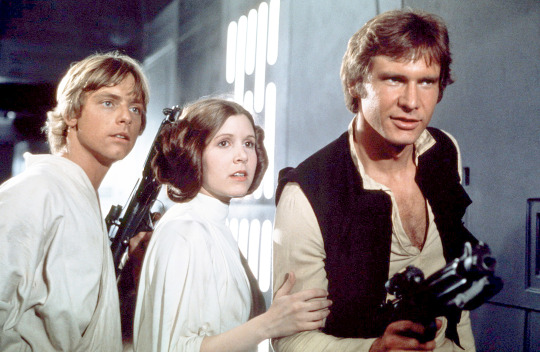
A lot of us either are a Star Wars fan, or we know someone that’s a huge fan. Either way, there’s no real way to avoid coming across it; it’s so ingrained in the collective conscience of the entire cinema frequenting world, that we all are familiar with the basics of its universe.
I’ve managed to avoid it until now during my 20 years on this planet, but I have a friend whose brother was an enormous fan of the franchise and owned multiple Star Wars sweatshirts that his sister would “borrow” but watch it she never could, because she found the whole world so far out there, that she thought it was hilarious.
But alas, one day her brother convinced her and she decided to just give it a watch and actually ended up liking it. Ever since she’s been trying to get me to watch it, without much success in her endeavor.
Until I recently got me curious about it myself, I thought if so many people love it there has to be a reason for it. And my experience was a huge success, I loved it on the second watch that is.
The very first time, I actually ruined my experience. By really not paying too much attention to it and even talk during…
My problem was the attitude with which I approached it, I was expecting to not connect to it beforehand, I had a preconceived of what Star Wars was, which is a silly blockbuster that later became a money-making machine.
Alas, I was wrong, and I deprived myself of a fantastically fun experience, because of my own preexisting conceptions.
I admit to most of the time being inclined towards and maybe respecting, so-called deeper and intellectual films more, films that I can really sink my teeth into.
I wouldn’t say I had a contempt for blockbusters and big studio films, I just generally don’t like them as much, I tend to find them over the top, too dramatic and sometimes a bit lacking in the emotional department.
But the longer I’ve been watching films, and my recent experience with Star Wars, really has taught me something, there’s nothing with a film being innocent fun and just an adventure throughout.
Afterward, I realized how ridiculous it is that I do value Jurrasic Park, which is also a huge blockbuster, but looked down on Star Wars, just because it all overall seems more plausible and is set in a world that’s still recognizable.
There’s merit in building an engaging fantasy world, and in creating characters that are instantly likable and that the audience can care about.
Star Wars (the whole franchise) has now become a piece of pop culture, and especially that first film, allows us to travel back in time, to the 70’s a particular period in cinema history, to the time of the first so-called blockbuster.
My main beef with “blockbusters” is that I’m not talking about each and every single one, there are ones that I enjoy.
But they’re often so formulaic and so played into what people will automatically like and be attracted to, and sometimes that results in something that I find lackluster, not spontaneous enough and without a fun, beating heart though.
And while Star Wars is the so-called first blockbuster, one of the films that changed film history. My dislike of it was completely unjustified. And the joke was on me because I missed out all those years.
Whilst it is a big film and expanded into something even bigger over the years: a franchise. No one really knew whether there would be sequels, but George Lucas did set up the possibility for them.
It really made marketing for these big films into a huge thing, the company in charge of making the action figures for Star Wars (Kenner) initially was unable to keep up with the demand, every kid that saw this at the time wanted one.
Now that’s something normal, but Star Wars was really the first film to start that. and it’s mostly relatively unknown cast at the time, apart from Harrison Ford (who had previously starred in the George Lucas directed, American Graffiti) were propelled into superstardom and into 70’s icons.
Everyone knows names like Carrie Fisher and Mark Hamill, even if they’ve never seen a single Star Wars film. And everyone knows terms from the film, everyone knows what a lightsaber is and has a vague idea of what a Jedi is.
So aside from all of its technical merits, and there’s quite a few, it’s above all else a historical document almost as well as a darn good piece of entertainment, and that’s more than enough in a film sometimes.
And unlike some later blockbusters, Star Wars really is a charming and fun film, with a beating heart. You can see and feel the love that went into them, and the fun people involved were having.
Its dialogue is super cheesy even corny, but it works because of the way the actors deliver them and their enjoyable chemistry with one another, also the cheesy dialogue is quite charming in its own right.
The film is obviously more about what’s happening visually on screen, than any dialogue. And I think that was my problem initially, I always took it way too seriously… the terms didn’t make sense to me and annoyed me, and the world with all its creatures felt perplexing.
This time I decided to just sit back, watch and not think too much and allow myself to be absorbed by it, really allow myself to be swept into the world. And it was a radically different experience.
There are still terms of which I thought wait what is that, or what is that thing supposed to be? The truth is that doesn’t matter for one’s enjoyment of the film at all, once you stop trying to make too much sense of it, and look at it too rationally it becomes incredibly rewarding. It’s not about being realistic. the whole thing takes place in a fantasy world, Star Wars is like a surreal dream come to life. And it’s really a matter of suspending any disbelief and logical questioning and just accept that stuff is called the way it is, looks the way it is, and that it’s a world with giant slugs and rats that look tiny kangaroos.
I was never before able to just let that element of it slide, and once you do start analyzing it, it can almost become funny. This time I set to myself: you’re gonna watch this, you’re not gonna question anything or laugh at anything. And I’m certainly glad me, myself and I had a stern talk.
I generally don’t dig stuff set in space all that much or with intricate fantasy worlds. But Star Wars felt different, yes it’s in space. But it doesn’t feel confined to one space, nor does too outrageous…
There’s something so familiar about that world, something we all instinctively know of how it works and that’s almost comforting and cozy to disappear in.
It reminded me of when I would dive into comic books when I was younger, and just disappear into them an entire afternoon, Star Wars really brings back some of that childlike wonder and awe, and in that sense, it really is a purely magical film.
I watched A New Hope, whilst feeling a little under the weather, and the afternoon passed incredibly quickly, which is what good films do: they make you unaware of time and space. It’s over two hours run time, actually felt quite short this time. And I can’t wait to check out the other ones as well.
But to return to my previous point, part of why it’s so fun to disappear in and probably part of its enduring appeal and popularity is its coziness, the really lived in vibe of it all. The title also helps in this, by adding Episode to its title, it feels like being into introduced to a world that has always been there and that we’re just stumbling into it.
It also doesn’t present us with any storylines, or conventions that are hard to grasp. You get an instinctive feel of the world and its rules and conventions. When it comes down to it, it really is a simple story of good vs evil, with the classical plot point of saving a princess thrown into the mix.
The fun thing is that it does subvert some of these classical conventions, in any other story princess Leia would have waited passively for her rescue, whilst here she actually consciously chose to fight and resists until the end. At least in the first one, you don’t exactly find out why the empire is precisely so evil and why they want to rebel against it, but I figured it was just some sort of space equivalent to a fascist regime that wants to rule each and every one of the territories around it. Imperialism in space, heavy…
The first time watching this, I questioned all of that too much, but this time I was like, okay the empire is run by some evil bastards in space, there are rebels fighting against them and they’ve got plans laid to destroy their massive weapon of mega-destruction. Which is what the empire wants to recover from the rebels, but of course, we all know Leia hid them in R2D2.
Speaking of the robots, aside from their designs being super cute, as well as all the bleeps and blips. I loved how positively they were portrayed, no the robots are gonna take over and destroy all of us!
That kind of film can be good, but it would be way too negative for Star Wars. Here they’re really seen as equals by the characters, and even worthy of being friends with. As well as having a personality as defined as the humans, the whole dynamic between R2D2 and 3CPO is both hilarious and heartwarming.
And that’s again why it works so well, the lightness even the humor and all. There are moments of light bullshit almost that defy logic, like R2D2 and 3CPO talking the stormtrooper into letting them go, with the excuse of R2D2 having to go to maintenance, it’s like an almost ridiculously simple solution to the situation at hand. Lucas knows it’s nonsense, but just doesn’t care. After all, it’s part of the genre.
If you really want to dig deep (well actually not that deep) but if you insist on an intellectual side to cinema, you’ll have realized that the force is actually one big metaphor for religion, a higher power. And that some believe in it and others don’t. Han Solo literally talks about the force in terms of: “I don’t believe in any of that hokey religious stuff”.
But essentially it’s a metaphor for believing, for believing in something bigger than ourselves, that helps us overcome obstacles along our way.
The whole given of The Force is actually incredibly well handled. At first sight, it seems like mumbo-jumbo - "The Force is an energy field that flows everywhere, you have to become passive and let yourself be led by it." In other words: relax and just watch what happens.
That’s not exactly a very profound philosophy, given that it was apparently used for hundreds of years as a basis for peace and quiet in the Milky Way.
Yet it’s not bad that Lucas keeps it simple (and purposefully vague, you can see whatever you want in it) The Force is just The Force and no further bullshit. Everyone has an instinctive sense of what it is, but there are no long, pretentious monologues needed to make it work and have people grasp the concept.
Seventies icons Mark Hamill and Carrie Fisher have the nominal main roles, and don’t do a bad job at all, their friendship comes across as believable and is very enjoyable to watch.
The chemistry between Harrison Ford and Carrie Fisher, also reveals hints of what’s to pass between the two later on in the story. The whole cast overall has fantastic chemistry with each other, you can’t really imagine that any of them got along badly in real life, they seem to be having too much genuine fun. But it is Harrison Ford who steals the show as Han Solo. It is only with his entry into the film, 45 minutes after the beginning, that everything really comes to life. All other characters are quite serious and have serious motivations.
Princess Leia tries to save her people (although Leia is a really enjoyable character because of her boldness and sassiness), only to see her entire planet explode before her eyes. Heavy. Luke Skywalker, in turn, grew up without parents, with his uncle and aunt, who are also murdered at the beginning of the film.
And Obi-Wan is of course little more than a wisdom-spouting old man who must stay serene at all times while scratching his beard. Han Solo, on the other hand, has absolutely no melancholy background.
He is a mercenary, who is only out for money, and that gives him the freedom to spit out one-liners as much as he wants, to put his crooked grin on display and insult the other characters whenever he feels like it. 'Star Wars' is a series that keeps going in the direction of the bombastic.
Perhaps that is inevitable considering the genre film. The function of Han Solo's character is that he pierces through that bombast. Whenever it threatens to go all over the top, you just have to give him a scene, and immediately the atmosphere becomes lighter, more pleasant and enjoyable.
Another thing that can’t be avoided when talking about Star Wars, is just how beautifully worked out and brought onto the screen the whole universe is. While it’s all undeniably a product of its time and feels decidedly 70’s, it still holds up incredibly well and feels really realistic for its time.
The different locations are all incredibly gorgeous to look at, and the special effects absolutely splendid. The colors and lights of some scenes is an absolute joy. Whilst John William’s beautiful score, adds grandiosity and epicness as well as emotionally complementing certain scenes.
Star Wars is undeniably a piece of film history that can’t really be avoided. I wouldn’t have called it a masterpiece before, rather a very well made piece of entertainment. But now I’d have to change my view: a film can be a masterpiece, precisely for being an incredible piece of entertainment.
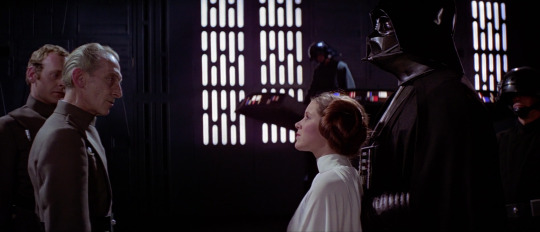

"Someone Has To Save Our Skins. Into The Garbage Chute, Fly Boy."
#I think I’ll be reviewing the two other films in the original trilogy soon#star wars#star was 1977#star wars a new hope#star wars episode IV: a new hope#70’s cinema#george lucas#mark hamill#harrison ford#carrie fisher#movies#films#vintage review#reviews#retropsective#movie review#film review#cinema#filmista
23 notes
·
View notes
Text
my favorite take on “Christian rock” comes from the essay Upon This Rock by John Jeremiah Sullivan
For their encore, Jars of Clay did a cover of U2's "All I Want Is You." It was bluesy.
That's the last thing I'll be saying about the bands.
Or, no, wait, there's this: The fact that I didn't think I heard a single interesting bar of music from the forty or so acts I caught or overheard at Creation shouldn't be read as a knock on the acts themselves, much less as contempt for the underlying notion of Christians playing rock. These were not Christian bands, you see; these were Christian rock bands. The key to digging this scene lies in that one syllable distinction. Christian rock is a genre that exists to edify and make money off of evangelical Christians. It's message music for listeners who know the message cold, and, what's more, it operates under a perceived responsibility—one the artists embrace—to "reach people." As such, it rewards both obviousness and maximum palatability (the artists would say clarity), which in turn means parasitism. Remember those perfume dispensers they used to have in pharmacies—"If you like Drakkar Noir, you'll love Sexy Musk"? Well, Christian rock works like that. Every successful crappy secular group has its Christian off-brand, and that's proper, because culturally speaking, it's supposed to serve as a stand-in for, not an alternative to or an improvement on, those very groups. In this it succeeds wonderfully. If you think it profoundly sucks, that's because your priorities are not its priorities; you want to hear something cool and new, it needs to play something proven to please…while praising Jesus Christ. That's Christian rock. A Christian band, on the other hand, is just a band that has more than one Christian in it. U2 is the exemplar, held aloft by believers and nonbelievers alike, but there have been others through the years, bands about which people would say, "Did you know those guys were Christians? I know—it's freaky. They're still fuckin' good, though." The Call was like that; Lone Justice was like that. These days you hear it about indie acts like Pedro the Lion and Damien Jurado (or P.O.D. and Evanescence—de gustibus). In most cases, bands like these make a very, very careful effort not to be seen as playing "Christian rock." It's largely a matter of phrasing Don't tell the interviewer you're born again; say faith is a very important part of your life. And here, if I can drop the open-minded pretense real quick, is where the stickier problem of actually being any good comes in, because a question that must be asked is whether a hardcore Christian who turns 19 and finds he or she can write first rate songs (someone like Damien Jurado) would ever have anything whatsoever to do with Christian rock. Talent tends to come hand in hand with a certain base level of subtlety. And believe it or not, the Christian rock establishment sometimes expresses a kind of resigned approval of the way groups like U2 or Switchfoot (who played Creation while I was there and had a monster secular radio hit at the time with "Meant to Live" but whose management wouldn't allow them to be photographed onstage) take quiet pains to distance themselves from any unambiguous Jesus loving, recognizing that this is the surest way to connect with the world (you know that's how they refer to us, right? We're "of the world"). So it's possible—and indeed seems likely—that Christian rock is a musical genre, the only one I can think of, that has excellence-proofed itself.
(bolding mine)
Yall ever heard white church music? Christian rock is one of the most gratingly generic and repetitive genres of music out there by a mile. It sucks so fucking bad. I am talking about this now because someone is sitting in front of the hospital and blaring “how great? Is our god?” As loud as the speakers in his truck can handle
57K notes
·
View notes
Audio
New interview with Trupa Trupa on at The Quietus!
It’s been something of a long slog for me this week – a new job, packing up and moving out of the one-bed rising-damp-and-arsehole-neighbours flat I lived in in South London for four years and moving into a new place in the dark heart of Nottinghamshire, all with a mewling three month old girl in tow. This isn’t me complaining – it’s all context. Because when I finally get hold of Grzegorz Kwiatkowski, member of Polish post-punk-no-wave-psych-rock malcontents Trupa Trupa, I am heavily laid down with mucus and medication, rundown and broken. We have been trying to get our planets to align for a couple weeks. I expect frustration, anger, disdain, contempt. Instead, I get gracious civility. “This is the most important year of your life, no? So you need to take your time to make sure your baby grows up to be the best she can be.”
A tenuous analogy here (and one I’m sure my daughter won’t especially enjoy when she gets older) but Kwiatkowski and the other members of Trupa Trupa - Tomek Pawluczuk (drums), Wojtek Juchniewicz (voc, guitar) and Rafał Wojczal (keys, guitar) - must feel the same. The four-piece have spent five years crafting an aesthetic that spans genres and eras, from Sonic Nurse-era Sonic Youth to an electrified and frothing Pere Ubu, an esoteric Slint or a Lynchian take on Siouxsie & The Banshees, which culminated in the critically acclaimed second album Headache in 2015.
That album, pushed out into the world by the normally avant garde/ electronic/ noise/ ambient trail-blazers Blue Tapes, was an immediate slice of melted influence and frayed synapses, traipsing manically from 60s rock deconstructions to post-punk pealings and no-wave wrecking balls, all tied together with intelligence and brio. It was a truly breathtaking album as notable for its breaths as for its blusters, and the world (well, the chosen few) held its collective breath to see what would be borne forth next.
Yet as any creative tends to look at their work as something of a birth and Jolly New Songs (also through Blue Tapes) has been gestating for quite some time, almost two years, the excitement and anxiety and relief that comes with such labours of love lie heavy on Kwiatkowski as its birthday looms – October 27.
Grzegorz Kwiatkowski: We liked Headache and we still like Headache, so we are not so arrogant or self-assured enough to believe that anything that came afterwards would live up to it. There was so much positive feedback for Headache, so it was a joyful time for us. That said we were very tired because there was so much that came along surrounding that nice feedback, a lot more than we ever expected, and it was great but it really took it out of us. We started to write new songs, then one year exactly after the premiere of Headache we said to each other, “Are we ready for another baby? Another Headache?” We respect the Headache baby but we felt it was too exploited in a way. So this time we tested this new album on many people first, on our friends and journalists, people at festivals, as because it is part of us it is difficult to see if we were making Headache part two. We see us as evolutionary, not revolutionary. We didn’t want to change outright – but we wanted to step forward, evolve.
Jolly New Songs could take on many different meanings as a title. The phrase itself could be seen as jocular, even pantomime-esque, certainly here in the UK anyway, and yet it’s something of a misnomer as many of the tracks on here aren’t joyful at all. How then do you think that phrase encapsulates what’s happening on the album?
GK: In the past we have always had problems giving names to our albums, mainly because we find that things could mean different things to each of us. So we refused to name them – our first EP is called EP, our first album is just called LP. Our second album was called ++ or Cross Crossbecause it was the (image on the) cover. When Headache arrived we couldn’t see how we couldn’t give it a name, so came up with a new challenge – whatever we all thought was the best track would become the name of the album. So with Jolly New Songs it wasn’t anything intentional. On the other hand we often have done things unconsciously without considering the step, so it has transformed into something else. Not only is it paradoxical – it isn’t jolly at all, but sad – but it is somewhat lighter an album that Headache is, as those songs carried a lot of darkness.
Can you elaborate on the darkness of the songs? Is it in the composition, the rhythm…
GK: Some of the songs we see as march songs. ‘Never Forget’ obviously. ‘Jolly New Song’ also. There is this movement we really like, Franz Schubert’s Lieder Winterreise (Winter Journey), very short German songs, and I thought aspects of the songs on the album have this aspect of fighting, yet in the same way full of energy and full of joy.
There is a clear disparity between the albums on the first listen; with Headache there was this restless sense of urgency, something that has somewhat been laid aside on Jolly New Songs. Yet nothing is truly joyous or indeed clear-cut on the new album, which undercuts any sense of immediacy. Headache really hits you sonically, a kinetic blast, while this one is far more insidious that gets under the skin. Was that part of that evolutionary process, to take what was successful with Headache and juxtapose it with more subtle, dissimilar methods? It is imbued with unease, therefore making it difficult to describe the journey it takes you on.
GK: While we were testing this new material on everyone – friends, family, musicians, journalists, owners of labels – it isn’t common that 95% of the feedback is the same, yet with Jolly New Songseveryone says that there wasn’t the aggression that was in the last one, that you needed to listen two, three times, maybe even four times, to truly get it. But not because it was hard to understand but because there is an atmosphere built into the songs that is hard to describe, and it lingers. Conclusions change about the album the more it is listened to. But strangely we as members faced the same problem. In the past making a track listing has been really easy, it falls into place. With this, every member envisioned the track listing in a different way. The songs lend themselves to interpretation far more than Headache does or even could. There is this book by Julio Cortazar, an Argentinean writer who lived in France, where you could read it in any order you want (Hopscotch) . So to settle it for the album, we chose the track listing in alphabetical order. So the listener can see that. But really our producer (Michał Kupicz) sent us the masters in alphabetical order and that spoke to us in another way, to choose the order as accident. A very strange compromise but we were satisfied. This shows that it is a strange album, and we respect it, but of course are really open to other voices (to interpret it).
Some of the songs feel quite nebulous; not that they are half-formed, more like a spectre or ghost, haunting the listener. Songs seem to be getting going, building, exploding, and then they are gone again. Yet the next song starts and the whisper of the last doesn’t leave you, your mind is still processing what has happened beforehand.
GK: I think that most things that happen in the band come through accidents. We promise ourselves never to be bored at rehearsals and to be satisfied with that. I think we are testing many things all of the time, so nothing becomes fixed in place, we are always shifting. There are four members of Trupa Trupa but it is really rare in the band that there is a fully democratic idea from the band. For us we see ourselves something like Fugazi, where every member is a composer, every member has a distinct voice, every member is author and owner of their lyrics. Every member has particular tastes and listens to different kinds of music. For me, the most important music is the classical style of music you know, Glenn Gould, as well as the Beatles and the Velvet Underground. For Wotjek who also is singing it is the Swans, Fugazi, Sonic Youth, more the New York avant garde scene. Rafal (guitar) is more a fan of Elliott Smith… So when we meet each other, we never have time to make one proper vision, so we are carrying these backgrounds with us. Maybe that is why what we are catching is very strange. We can come together with a song but it is just the body, like architecture, like sketches. We build from the musical blocks that we have.
It is such a diverse melting pot musically, but you are also well steeped in things literary seeing as you are a recognised and published poet. In the press notes it’s stated that Walt Whitman was an influence on the last song on the album, ‘To Me’. Were there other literary or political influences that helped with the building of these songs from architectural sketches to Jolly New Songs?
GK: There are many paths taken, and can be taken, through the lyrics of this record. They come often from very dark and very pessimistic situations, and the people of Gdansk where we are from. It is in the north of Poland by the sea and is best known because the Second World War started here. On the other hand the solidarity that came about for the people of Gdansk informs it as well. On the other hand one of the world’s greatest pessimists in Arthur Schopenhauer was born here. These are all influences without even thinking about them. And for many years, centuries, Gdansk was not part of Poland but more of a free city, a port, with these shipyards, a gateway to the world, something like Hamburg or Liverpool. So Gdansk has always had a history of spreading new ideas. But there are many other influences on this album, most of which take things at a dark angle. ‘Never Forget’ – there are not many songs about the Holocaust and Shoah. My grandfather was a prisoner in a concentration camp not far from Gdansk, and many Polish people were in or have direct relationships with people who were in concentration camps. Poland is the site of the world’s biggest genocide. On the other hand my grandfather was also a German soldier in Wehrmacht, so there are very complicated histories here and they leave impressions on us, they mark us. But again, these are just songs. I would like people just as much to treat the songs just as songs. I don’t like to talk at length about famous artists or events in history because it may inform me and what I do but it may make a song into a situation that can only come at in a particular way or with a particular idea in mind.
Even if you divorce the songs from these totemic influences, the sonic palette you have created is not so discerning that anyone will be led down the same aural path. The genre staples – post punk, psych rock, noise rock, the avant-garde, the influences you have mentioned already – can lead to very different interpretations. Christian Eede, from tQ, reviewed ‘To Me’ and described it as “triumphant”, and the presser from Blue Tapes & X-Ray Records describes elements as “anthemic” – and outside the slipstream of the album perhaps it is. But for me the album subverts those mainstream signifiers to the point where ‘To Me’ comes across more as a sly counterpoint to what we would expect crossover songs to be…
GK: See, it is what you want it to be (laughs). The word anthemic – what does it mean? To me I don’t – is it religious? A national anthem? ‘To Me’ could be powerful, and I don’t want to say it isn’t, but to me it isn’t. Others have compared us to psychedelic music and no-wave, or mentioned bands like Swans, Shellac, Slint, Beak>… Nothing we do is conventional, like a rock song structure, which is what I think of as anthemic. But then what do I know?
You write the songs!
GK: It’s not what I think, I think we are a deconstructive rock situation. But people hear what they hear.
Very pragmatic of you! Well let me tell you how I listened to this album. You sent me a couple different versions of Jolly New Songs quite a few months ago now, so I have listened to it often. So the final listing has been somewhat disorienting to me, because after the dark journey that you take me on, ending with ‘To Me’ – I can’t work out if it’s a tip of the hat to hope, or if it’s more of a brainwashed downer denouement, something Orwell or Bradbury or Levin would concoct, like Rosemary’s Baby (which incidentally I watched on mute while listening to this album a couple months ago), where such a landscape of murkiness and uncertainty breaks you down in a sort of “if you can’t beat them, join them” kinda way. I can’t shake the unnerving feeling that, in the context of the album, having these moments of pop lightness only serves to subvert notions of hope, a sucker punch ending to a dystopian story where the protagonist hasn’t broken free at all but is very much a cog in the machine. Now I may be in a totally unique position in how the album makes me feel, but that unsettling nature makes me return the needle to the beginning. That sort of grotesque emotion and the Self, it’s unnerving yet utterly transfixing.
GK: Yes! To be truthful I have been pushing for such a hypothetical outlook (in the music) because ‘To Me’ becomes a sly wink, a slap to the audience to wake up, you’re wrong, there is something else going on here. Michael Haneke, a great Austrian film director, for me the album is positioned in this downward position so that the ending comes out like a Haneke film. It could be seen as one thing, but hopefully it can be seen as a perverse version of something more conventional. You mention Rosemary’s Baby and to me this is very much a movie album. ‘Love Supreme’ for example is very much similar to Roman Polanski, offering sound for a creepy horror movie. It’s cinematic in a very graphic sort of way.
I have been really floored by this album, but it is one that has crept up on me, like the best paranoid slowburn horrors of Haneke, Polanski and even Ti West of recent times, a subliminal listen. It feels like a slanted way to appreciate an album…
GK: As band members we had really similar reactions to how the music was coming about. We were coming up with ‘Only Good Weather’ and we looked at each other and said, “What the fuck? What are we singing, what are we playing? It’s stupid!” But we felt there was something to it, so we kept it. And then we came up to the second part of the song, the disaster part, and we were even surer that there was something to this, even if we didn’t know what ‘this’ was. Which made us happy because it isn’t easy to make not obvious guitar based psychedelic music anymore. What we have ended up with on Jolly New Songs are songs that are kinda traditional, but on the other hand are soundtrack songs, on the other hand they are like ‘Never Forget’ with this strong story about a death camp, on the other hand they are ghost songs for a kitschy horror film. I know I shouldn’t be so positive about the songs because I cannot be objective, but I can say we liked it but we were really interested in what everyone else’s reactions would be, in the way the songs kinda freaked us out also.
2 notes
·
View notes
Text
Psi phenomena are problematic precisely because they involve events in the real world and thus become candidates for a physical explanation, yet at the same time they are critically bound up with certain states of mind. Thus they cross the dividing line between objectivity and subjectivity which normal mental phenomena do not.
–John Beloff
One can study UFO reports and abduction tales for decades and remain more or less convinced these are physical beings from other worlds who must possess something like Arthur Clarke’s advanced technology that is indistinguishable, to us, from magic.
But what kind of magic? Of the ritual…or of the stage?
As Jacques Vallee and John Keel long ago pointed out,[1] retaining an “ET spaceship” framework as a UFO-report investigator requires one to ignore much relevant information from witnesses that enters high strangeness: instances of telepathic messages, psychokinesis, apparitions, and coincidences that verge on synchronicity.
In other words, the sort of “magic” that the materialist epistemology of science currently denies exist.
If you embark on a comparative historical research course into fairy and djinn stories, poltergeist accounts, ceremonial magic, mediumship, NDEs, OBEs, shamanism, and world mythology, the UFO material tends to either assume a wider context of shared meanings or shrink in its unique significance…You might realize you’ve been fixated on one narrow band in a spectrum of very similarly-structured experiences involving “alternate modes of consciousness” that are as old as humanity itself.
After such a study course, at least for me, the belief in technological ETs succumbed to attrition in the face of this historical evidence. In other words, the hardware proponents lost the fight. I became interested in exploring the raw phenomenal experiences (as far as that’s possible) of otherworldly encounters. What prior to that was a side-interest (the occult/folklore in general) to an interest (ufology) has become my central focus. The two are intertwined in astonishing ways.

Curious Timings? In 1848, the Fox family are plagued by a poltergeist in their house in Hydesville, New York. By using handclaps, raps on the wall, or clapping, sisters Margaretta, 15, and Katie, 12, learn to communicate with the “spirit” in a manner that mimics the dot-dash of the telegraph in a primitive way.
After causing a sensation throughout upstate New York, the two children are separated but the rappings follow both girls. The news spreads, and within four years, hundreds of thousands of people worldwide are attempting seances with the same results. Some persons attending séances claim the rappings occur at their own homes upon their return; sometimes a person even merely reading about them or deciding to attend a séance spontaneously causes the activity to arise in their surroundings.[2]

But even before the (in)famous Fox sisters’ experiences, the Shaker communities from New York to Kentucky experience an explosion of interactions with the spirit world. The “Era of Manifestations” that begins in 1837 doesn’t directly involve poltergeist-like rappings, but trance-states (lasting sometimes up to 9 hours) in which Shakers’ founder Mother Ann Lee, “angels,” “ladies in white,” spirits of the dead, and unclassifiable entities visit congregants, mostly young people, in visions. These episodes show all the signs of what would come to be called out-of-body experiences and “astral travel.” Glossolalia, epileptoid fits, spontaneous unconscious preaching, and hallucinated music are exhibited during these attacks; during many trips, “movements” are “learned” then mimicked by bystanders then taught as divine motions that would become incorporated into the Shakers’ ritual dances.[3] Often, the entranced claim to visit rooms in which conferences are held with the passed-on Shaker leaders and congregants, who admonish the experiencer to repent further and reform themselves; in one of these accounts, 14-year old Ann Goff witnesses “indescribable” chairs and a huge book upon a table as the Shaker elders, dressed in white robes with crowns, exhort her to pass on a message to the community to curb their worldly behaviors. Messages from beyond that demand human behavioral change and redemption—so prevalent in “ET entity”-inspired communications regarding our treatment of the earth—have always been a part of trance communications.
By 1841, the affected Shakers’ trances include the spirits of Indigenous peoples, “antediluvian giants,” and ineffable apparitions, and by the next year so many “outsiders” are coming to witness the spectacles that the community leaders cease having open meetings.[4]
Anyway, by 1860 Spiritualism has exploded into a fragmented but huge quasi-religion of many brands that mostly exclude Christianity. Those with genuine talent at mediumship become “psychic superstars” over the next five decades: Andrew Jackson Davis, Stainton Moses, Daniel Dunglas Home, Leonora Piper, Gladys Osborne Leonard, and Eusapia Palladino. While most of the “controls” used by the American mediums are the famous dead like George Washington or Beethoven, others are claimed to be spirit-guides, angels, or even extraterrestrials, who explain the workings of the physical and aetheric universes.

Two years after the Shaker experiences and four years before the events in Hydesville, Andrew Jackson Davis engages spontaneous trance using Mesmeric techniques. Considered “slow” as a child, by 1845 Davis is successfully diagnosing medical problems, just as several of Franz Mesmer’s and his protégé’s subjects were earlier able to do.[5] In a trance vision he signs a document offered by “an old Quaker man,” then Galen and Swedenborg appear and teach him. After having a vision of “Galen’s staff” (which we can surmise was a caduceus) he diagnoses people while magnetized. At 19, he dictates The Divine Revelation.[6] This same type of “edificatory” channeling occurred in many dozens of subjects under Mesmeric trance in France, Belgium, Switzerland, and especially Germany, from 1810-1850.[7] Documented, veridical displays of clairvoyance and telepathy were regularly demonstrated by Mesmerized persons as well.[8]
But Davis’s trance led to more: his dictated speeches produce a huge 1847 book, The Principles of Nature. At one point he speaks of the inhabitants of the planets in our solar system, singling out Saturn as the home of advanced beings.[9] He also apparently prophesies the coming Spiritualist tsunami of 1848 onward:
Davis paved the way from modern American spiritualism in four ways. He accustomed a wide public to the idea that a clairvoyant somnabule might engage not just in medical diagnosis and traveling clairvoyance, but in the transmission of social, religious, and cosmological teachings; he propounded neo-Swedenborgian doctrines about the future state and the spirit spheres and about the features and inhabitants of the planets; he propagated the view that some new and stirring revelation was about to rock mankind; and he implied that this revelation would involve a bursting of the barriers that separate our world from the spiritual one.(emphasis added)[10]
As Alan Gauld notes, the claims were very similar to those of Emanuel Swedenborg (1758). Swedenborg, Davis, John Newbrough (in OASPHE, 1882), and Helene Smith (1897) were the only well-known mediums who speak at length about physical or spiritual beings from other worlds during the Spiritualist period.
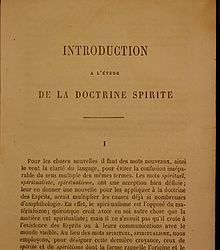
In France, education reformer Hippolyte Ravail becomes fascinated with mediumship, establishes general rules for distinguishing true clairvoyance from impostures, draws up a list of literally a thousand questions, puts them to his best mediums, and publishes a book of the answers in 1857 under the pseudonym Allan Kardec, founding the “religion” that will eventually be called Spiritism.
In 1905, author Sara Weiss publishes the “scientific romance” (as science fiction was then known) Journeys to the Planet Mars, or, Our mission to Ento (Mars): being a record of visits made to Ento (Mars) by Sara Weiss, Psychic, under the guidance of a spirit band, for the purpose of conveying to the Entoans a knowledge of the continuity of life. Despite its genre association with science fiction, Weiss is a medium and claims the book is one of genuine contact. It is a channeled work, complete with phonetic dictionary of Entoan.
By 1890, one would think, with the onslaught of ET-inspired messages that would come 60 years hence, much more would have been said about them by the many mediums or channelers of the Spiritualist period.
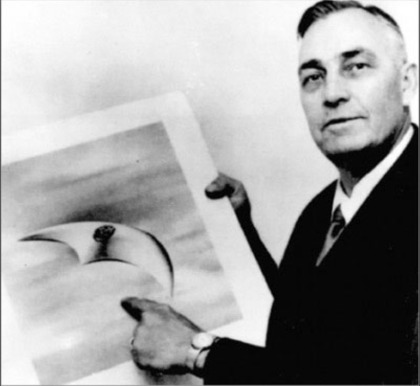
Then… Exactly 99 years after the Hydesville events, 1947: UFOs begin to show up in our skies (and backyards and seas). Investigator Meade Layne claims in 1952 that these are interdimensional ships and their “aetherial pilots” can be contacted through trance mediums.[11] From 1948 onwards, dozens of individuals like George Adamski and George van Tassel claim friendship with “Space Brothers,” whose advice to humanity differs little from Kardec’s spirit-channeled philosophies of 1857-1868…Shorn of the incredible Theosophical history lessons he provided, the same applies to Guy and Edna Ballard’s I AM cult, which began in 1930 when Guy encountered “Venusians” in the presence of the “immortal ascended master” Count St. Germain on Mount Shasta, California.
A Paraspiritual Control System?
Culturally, the Spiritualist phenomenon of 1848 may be considered the right cure at the right time. It was the first modern split-off from all religions towards a direct-experience approach to the divine. The spirits of the other side would teach humanity, even if the truths they offered were old wine in new skins.
When Spiritualism broke upon the world, Darwin had yet a decade to publish his evolutionary theory, but the impact of mechanistic science was everywhere felt in America, the UK, and Europe. Machines were inspiring wonder and contempt alike. Helped by the new mass media, beliefs in a clockwork universe needing no creator deity were gaining adherents in the academies and inundating popular consciousness, undermining the religious faith of millions. The geological work of James Hutton and Charles Lyell suggested the earth was much older than the 6,000 years the Bible taught, further eroding Judeo-Christian faith. Electricity became a dominating metaphor for life, for vigor, for magic like mesmerism—and we would harness it for health and longevity.
Then, just at the long tipping point in mass consciousness towards despair over a de-enchanted universe, along came inspiring messages from one’s departed relatives in seances, psychokinetic magic in table tilting and ectoplasm, prophesies and promises. A great emotional need for certainty and meaning in the continuity of spiritual life was filled by the Fox sisters’ fame and the widespread folk adoption of seances.
So, what parallel happened socially and culturally in the decade just before the UFO craze began? Well, as many have pointed out, it might have had something to do with the terror and despair over 20 million deaths in a World War whose final punctuation marks were the bombing of two cities with a superweapon that could turn human beings into dissipated energy in a split-second. By 1947, the US Navy had tested the survivors of those two cities and discovered the lingering damage that the Bomb infected in those exposed to it, and by 1950 the US was engaged in a game of mine’s-bigger-than-yours with the Soviets over these evil weapons.
A part of humanity definitely wanted new saviors—preferably of a non-human, more evolved kind.
This was just what was needed in the popular imagination, especially the fact that the Space Brothers and many of the reported individually-encountered ufonauts preached against nuclear weapons…
But curiously, by the mid-1990s, UFOs were no longer putting on dramatic close encounters of the first, second, and third kind “performances” as they had since 1947. No more reported up-close (-500 feet) sightings of structured craft, no more buzzing cars and stopped engines, no more observedsky-to-ground landings and “explorers” zapping and burning witnesses with beams of light, etc. Night-time bedroom abductions largely seemed to become the method of intervention.
In other words, it seems that enough of the populace had come to believe in extraterrestrials visiting the Earth that since 1995 a hundredth-monkey effect had been taking place and thus the ETs no longer manifested geologist-biologist-like behavior (space-suited beings taking soil samples and zapping witnesses with “flashlights”). Such trappings were of the Space Age 1960s-70s, in line with expectations of ET space explorers…Most interesting is that once the international treaties banning the testing of nuclear weapons were instituted (by the 1990s), the aliens’ message had dropped the explicit nuke warning and they began preaching about the environmental degradation of the earth.
Again, it is a message that meets a popular need and tracks with cultural change.
There was a parallel to this change of manifestation (or even “decline effect”) within the Spiritualist movement. By the 1910-1920s, Spiritualism as a world religious movement had run its course (except in Brazil, where the Kardec Spiritist church is still popular). By the 1930s, reports of the most spectacular physical effects that can occur during séances had declined. It was as if the contacted spirits were no longer compelled to tilt tables and raise ectoplasmic spooks as they did in the 19th century; it was as if a certain number of people believing in them had reached a critical mass—so these supernatural displays were no longer necessary.[12]
Many Mesmerized persons from 1780-1850 produced astonishing, well-documented examples of “traveling clairvoyance” (remote viewing), telepathy, distant healing, and diagnosis. The same decline effect can be said for the population frequency of extraordinary individuals such as Friedrike Hauffe, brothers Adolphe and Alexi Didier, and many of the reported “somnambules” associated with Mesmerism and “phreno-mesmerism.” That is to say, the number of mesmerized individuals prone to demonstrating spectacular feats of psi declined as Spiritualism ascended, then new spirit-virtuosos appeared within a few decades using self-entrancement methods without the Mesmeric trappings.
As Spiritualism became a worldwide craze, the core ideas of Mesmerism passed from the scene by 1850, but hypnotic states continued to be explored by laypersons and the early psychologists. For the next five decades, psi feats seemed to limit themselves to individuals “in the Spirit,” those suffering extreme conversion disorders, “hysteria,” dissociation, or those under hypnotic trance, as evidenced by the research of physicians Jean-Martin Charcot, Charles Richet, psychologist William James, and philologist Frederic Myers. As noted above, the spirit-mediums of the late 19th century needed no “operator” to entrance them; they could spontaneously entrance themselves, perhaps through self-suggestion, to “speak via the denizens of the Other Side.” The most famous extemporaneous acts of remote viewing and telepathy in which the offered information could be verified were thoroughly checked and verified by Society for Psychical Research (SPR) members such as Richard Hodgson and Frank Podmore, the former who started out a hardcore skeptic yet eventually became convinced of the human personality’s survival after death.[13]
From 1884 to the 1920s, the SPR and its American counterpart preserved, annotated, and analyzed much anecdotal and experimental evidence for apparitions, telepathy, bilocation, and psychokinesis. By the 1920s, they had published many volumes of this evidence on mediums and psi phenomena.[14] By the time the Spiritualist craze had apparently met its need and served its purpose—providing just enough evidence of a world beyond the material—Upton Sinclair published a book on telepathy in 1930, Mental Radio. The title says it all: Technology has increasingly become the lens through which we analogize psi phenomenon and prescribes the preferred method of verifying its existence: a machine…In other words, if it doesn’t show up on the scientists’ screen, or needle, or graph, it doesn’t exist.
And thus what we think of as “reality” constricts a little more.
It was also in 1930 that psi effects first came under strict scientific scrutiny in the laboratory experiments of J.B. and Louisa Rhine, eventually followed in the next decades by Charles Honorton, Hans Bender, Helmut Schmidt, Charles Tart, Robert Jahn, Brenda Dunne, Russell Targ, and Hal Puthoff, who indisputably proved the existence of psi. Through tight experiments that probed dice-throwing influence (psychokinesis/PK), random number generator control (PK), autoganzfeld (telepathy), and remote viewing (“traveling clairvoyance”), they demonstrated cumulative average statistical results against chance for these phenomena by factors of hundreds of billions to one—to any reasonable person willing to examine their experiments.[15]
Case studies of extraordinarily talented mediums like D.D. Home or Leonora Piper became very rare. Where they did pop up in the 1920s onward (like “PK-boy” Rudi Schneider or “poltergeist girl” Eleonora Zugun or remote viewer extraordinaire Stefan Ossowiecki), the ratio of skeptical greyfaces ready to declare “bullshit!” prima facie to the open-minded scientific investigator was probably ten to one, so you tabulate the odds of “standard science” studying anything further in those fights.
But by 1950, say, mediums who communicated with the dead had mostly gone shut up to the cultural attic.[16] Why? Had the spirits on the other side abandoned this world? Mediums still practiced but it took the new, very “physical” flying saucer to re-fit the metaphysical messages of the seance room, and since these were ostensibly independently existing beings, anyone could potentially see and interact with a UFO. At least this is how the main narrative at first seemed.

Ships are meant to float and move upon the waters; they are animated by the living force that animates all things here, and if we wish to move them over the water we have but to focus our thoughts in that direction…Our host handles his craft skillfully, and increasing and diminishing its speed he could create, by the different degree of movement of the water, the most striking alternations of color and a musical sound, the brilliant scintillations of the sea showing how alive it was. It responded to the boat’s every movement as though they were in complete unison—as indeed they were.
-medium Anthony Borgia, Life in the World Unseen, from 1914.[17]
Change “ship” to “craft” and “water” to “atmosphere” or “space” in this declaration and it could read as part of a UFO contactee’s narrative, or even from an alien abduction account.
So what is this all about? Spirits and aliens are the same?
Not exactly, but close. The same, but different.
Jacques Vallee’s conditioning-stimulus “scheduled reinforcement” process hypothesis provides a framework for understanding the changing face of the Otherworldly:[18] we get accustomed to one mask that appears to undermine our general orientation to reality; a numerical tipping point of humans come to believe in the phenomenon; then it changes its form, but ever reminds us of its presence—and symbolizes a further mystery we shall perhaps never explain but are goaded into coming to terms with.
Vallee points out that the UFO experiences (as much as we can be said to know them) cannot be separated from the media filters through which they pass, much like the signal-noise model of information he studied in his career as a computer scientist. Distortion of the actual phenomenon is inevitable for the human mind; these deformations are culturally shaped, and in turn feed back into society and help shape further instances of the phenomenon, whether it is conceived as entirely “physical” or “psychological” in origin. The distortion is always present, and the one definite factor certain to be in play.
The phenomenon itself is not directly observable, but its effects certainly are—specifically on cultural concepts of the “Other/Alien/ET,” by either creating “new” religious beliefs or altering existing ones. Both the phenomenon itself and the resultant forms created by the media feedback fulfil societal needs (and can also thus be manipulated by cult leaders or governmental agents).[19]
Vallee has many times pointed out the self-negating nature of UFO contactee’s claims, the always-ambiguous authenticity of landing traces, or the obvious fact that there has been a vast zoo of differing ET appearances and behaviors that are many times in conflict with one another. Parasychologist John Beloff addressed this very problem of intractability (and perhaps absurdity, as Vallee so often puts it) when analyzing the history of parapsychological research:
One truth about psi phenomena which every parapsychologist learns the hard way is that they are not just elusive, in the sense of being difficult to pin down, they are, or at any rate they seem to be, actively evasive. One well-known contemporary experimentalist (William Braude) has spoken of the “self-obscuring” aspect of psi…By the 1940s mediumistic séances were “old hat” and the new respectable and sanitized parapsychology that J.B. Rhine had introduce at Duke University was all set to take the academic world by storm. But Rhine’s new science soon ran up against the same obstacle that had beset traditional psychical research—the evasiveness of the phenomena. The “new era” which Pawlovsky thought so imminent is still pending. Time and again since then it has looked as if parapsychology was poised to sweep away all the familiar doubts and objections, overcome all prejudice and opposition and take its rightful place in the spectrum of human knowledge but so far this aspiration remains still-born… What is it that makes psi so evasive? One possible answer lies in the fact that, more perhaps than any other psychological phenomenon, psi appears to be extremely sensitive to situational factors. It is more than just a question of the subject being in the right frame of mind. The whole cultural milieu in which the subject operates might influence decisively what is or is not possible for the subject to achieve.[20](emphasis added)
Beloff’s is the tack Vallee has often taken with regard to UFO interactions and their aftermath: the matrix of cultural information (scientific, religious, social, material) plays a determining and invisible part in what is regarded as an anomalous message that transgresses the norms of that matrix. Incorporating the raw message, which to the contactee is entirely subjective or even “spiritual,” into the existing matrix is impossible without diluting/translating it—but this drawback is only possible through the current epistemology (and something we will address in the latter part of this essay). Beloff continues with a metaphor that parallels Vallee’s idea of the control system operating as a thermostat that is “seeking equilibrium” with itself by altering human behavior and conceptions of reality:
Let us, then, think of nature as one vast immune system. Paranormal phenomena, on this metaphor, correspond to infections comparable to the intrusion of viruses or bacilli into a healthy body. A new paranormal phenomenon for which there was no precedent, say table levitation or metal bending, would correspond to a powerful infection of this kind. The immune system of nature would go in to action with the result that such phenomena would thereafter be eliminated. But nature would still be helpless in the face of a new infection, and so a constant search for novelty would become the sine qua non of successful attempts to demonstrate whatever lies outside the normal course of nature or violates the laws of physics. Pursuing this metaphor, we may say that another method that would allow us to get away with the paranormal would be to introduce it in very dilute doses. In that case, the immune system of nature need never be activated just as in our own immune system very minor infections, as occurred with the vaccine, need not elicit any symptoms. This, indeed, seems to be the logic of much in current experimental parapsychology, such as attempts to bias the output of a random event generator. The drawback of that strategy, however, is the difficulty of a rousing any interest in such marginal results among those who are not professional parapsychologists.[21] (emphasis added)
The same of course applies to the subject of the ufologist: how can one gain the interest of “real scientists” to study what amounts to an entirely unpredictable apparitional event?
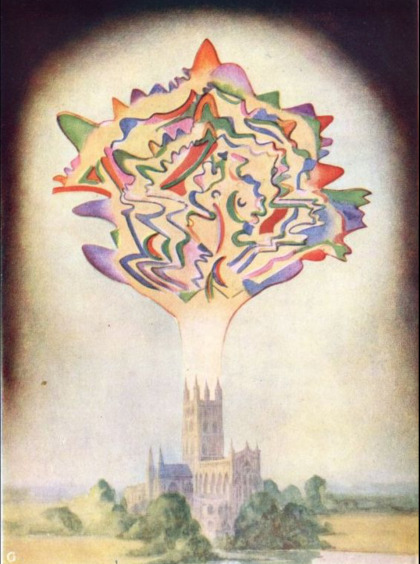
The Hermetic Take on Guides from the Other Side
As Havan Blomqvist and others have noted,[22] Theosophists always claimed to have knowledge of—or even direct contact with—the Great Mahatmas of the Himalayas and other diversely named yet similar “ascended brotherhoods” (the Yucatan, the Great White Lodge, the Ellora, etc.) that are said to intervene in human affairs at times to guide our evolution. Hermetic scholar Jocelyn Godwin discusses the “hidden hand” of these intelligences at work in the phenomena of Mesmerism, Spiritualism, and Theosophy, who also, by extension, continue to influence our culture through the UFO Space Brother.[23] This myth posits that these beings—or spirits—are said to take whatever form is needed and communicate cosmic truths via both traditional mediums and anomalous experiences (such as UFOs, synchronicities, angelic visitations). One can attempt contact with them through conventional methods such as meditation or entrancement, but as Vallee might argue the mode of contact for the technological West is now one of disruption of our materialist worldview via what appear to be technological marvels that defy physics and almost all known science—UFOs and how they alter our worldviews.
Contact with Other intelligences was once an accepted part of the natural order of social life via shamanistic practices, before various totalistic systems such as cults, religions, science, and social pressures reframed and marginalized those worldviews and techniques. Now contact is mediated through several layers. One cannot call upon aliens (Steven Greer’s claims notwithstanding) in the way séances once called upon the passed-on.
Betty Andreasson-Luca’s depictions of her experiences
By 1995, alien abductions had overwhelmingly become the media focus of the contact experience; abduction-related books outnumbered in both publishing and sale numbers all other aspects of the UFO phenomena.[24] Seeming genetic experiments upon percipients replaced “space exploration hardware” as the dominant narrative of these books.
In many abductions, the person undergoes a bedroom visitation by greys or other beings and is taken through the house walls into a circular room; many times, an ET-like craft is not even seen, but only inferred by means of previous experiences, or the accounts of other experiencers.
The Others’ scientist-like activities tracked with advances in reproductive technology (see essay on alien transhumanism), yet the frequency of this particularly medical manifestation has apparently dwindled in public reports over the past decade.[25] Contact has become entirely a matter of myths that use our technological metaphors of “upgraded DNA” and psychic “downloads” of information—what was once called spiritual evolution and “reading the Akashic record” in the 19th and early 20th centuries.
After studying the history of paranormal events, many investigators have noted that the persons who experience alien abductions unequivocally also experience poltergeist-like elements. In poltergeist events:
–there is usually a single focus person.
–the experiences often follow this individual around from location to location.
–a sense of a conscious, often malicious presence in a room is experienced prior to “main event” (it may produce bangings, flying objects, etc.)
–apparitions may be seen that are generally human-like in form.
–physical marks are left on the body and environment, i.e, presences that pinch, prick, or scratch the individuals. Fingerprints, “claw marks,” and scrape marks are sometimes seen in dust, furniture, clothes, or bed dressings, during the poltergeist attack.
–electrical interference occurs; lights, televisions, or radios will turn themselves on/off, lightbulbs burst, flicker, or strobe.
–levitation of objects (and, rarely, even persons) occurs.
–balls of light, often blue, are seen; blue flashes and “cold breezes” accompany some mediums’ trance states, such as Stella Cranshaw’s, that were accompanied by poltergeist-like physical effects, studied by the SPR in 1923-26.[26]
–hazes, often blue in color, are seen. –objects may disappear (sometimes from locked or hidden places) and reappear in the open or in incongruous places (teleportation). –objects, most often stones, seem to materialize or pass through solid objects such as walls. Often they are found to be warm or hot to the touch.
–“teleported” or “apported” objects (such as stones, cups, plates, etc.) are seen to make all sorts of impossible maneuvers mid-flight as they fall, such as zig-zags, parabolas, leaf-like motions, corkscrewing, hovering in mid-air—much in the manner many UFOs are observed to move in the sky.
–buzzing, crackling, or bell-like sounds may be heard; sometimes incomprehensible speech, groans, or screams.
–rarely, and perhaps circumstantially, animals have been found mutilated in surgically precise manners during poltergeist manifestations, suggesting a tentative connection to the link between UAP activity and animal, especially bovine, mutilations.
These poltergeist-specific phenomena parallel only some of the superficial features of abductions and UFO sightings…Nevertheless, these parallels are clear.
There is usually no “story” to a poltergeist infestation (a contrary view by sociologist Eric Ouellet can be found here).[27] Abductions, on the other hand, involve a distinctive narrative that over time can acquire a deep meaning to both experiencer and their auditor(s) alike.
The important point is that both poltergeists and abductions involve escalations of the paranormal activity. In the poltergeist the intensification occurs in a short period of time, months at the most, while for the abductee it occurs over years, decades, or a lifetime. The latter seems to wane with the experiencer’s age.
Following Alan Gauld’s and A.D. Cornell’s criteria of comparison,[28] hauntings may contain some or even all of the poltergeist elements listed above, but they are location-specific, not person-centered.
Seeing apparitions is rather rare in poltergeist episodes, so there are general boundaries between hauntings and poltergeists. Yet alien abductions also unequivocally contain apparitional/haunting-like elements. In both:
–the entities/apparitions appear either suddenly or gradually “materialize” into sensible form from a “haze” or light; often the percipient feels “their” presence before sensibly interacting with the Others.
— buzzing, crackling, bell-like, or humming/vibrating sounds may be heard at the outset of an abduction (this has occurred in a small minority of apparition appearances); conversely, a total dampening of sound often precedes or accompanies the apparition/alien.
–a sense of unreality precedes and accompanies the apparition; in abductions or UFO entity sightings, this depersonalization or derealization has been noted in many dozens of cases.
–a change in ambient temperature is very often noted.
–paralysis of the percipient is sometimes experienced in apparitional sightings, especially crisis apparitions wherein the “hallucinated” person has just died or is near death; in abductions, the experiencer almost universally finds themselves paralyzed while in bed.
–apparitions appear fully clothed, and sometimes with accompanying accessories (canes, sticks, bags, even horses, etc.); Otherworldly beings are almost always clothed and carry devices (“boxes,” “guns,” “wands,” etc.).
–apparitions, whether of the living or those near death, may appear imbedded within hallucinatory scenes that are veridical, that is, they are later verified as the actual surroundings of the “sender” at the time of the percipient’s experience; similarly, abduction experiencers report holographic or televisual scenes that float as if being emitted from “disembodied screens,” or are immersive, augmented-reality-like programs. (Sometimes these screens’ appearance precedes the abduction, and in some reports incongruous beings or people, like figures of Jesus or a similar protective deity, have been reported to show up in the midst of an abduction).
–a message is often transmitted from the apparition, aurally or telepathically.
–conversations with apparitions can either be aural or telepathic, but mostly the latter.
–many times, UFOs or apparitions are seen by only a few persons present in a group setting of potential percipients; in UFO sightings (and even abductions), sometimes only the abductee(s) in the group see(s) the UFO (and may subsequently undergo an abduction experience). There are many cases of apparitions that appear to one or two people within a group of more potential percipients.
With their massive study Phantasms of the Living (1886), SPR investigators Edmund Gurney andFrederic Myers came to speculate that apparitions (especially of the crisis-type that occur within 24 hours of the “ghost’s” death) were the result of a telepathic transmission from the “crisis agent” to the friend/acquaintance percipient (and even multiple percipients).
Mathematician and physicist G.N.M Tyrrell further developed a hypothesis that involved the conception of an idea-pattern[29] that is projected from the agent that may affect one or more targeted persons in a “drama.”[30]
Tyrrell’s idea of the apparitional drama is based upon studies of hallucination and a crucial distinction he makes between the sense-data that is perceived by the brain and the physical objects that may cause the sense-data; in his scheme, physical objects may or may not produce sense-data, despite their being within one’s sensory field.
Tyrrell’s conception is meant to be a general philosophical basis for the astonishing examples of hallucination of which the human mind is capable, as Oliver Sacks describes in his book on the subject. For Tyrrell, our subjective experiences are simply the sense-data that appear in the mind, regardless of whether they are physically caused by objects in the outer world or not. On his definition, dreams, hypnagogic imagery, daydreams, and hallucinations are all sub-groupings of possible sense-data. These seemingly disparate states may or may not help the successful management of meeting life’s needs; that focused “center” that primarily assists in self-preservation we call the ego is, for Tyrrell (and Myers) at once more akin to a stream with multiple subconscious ideas and affects active within it at all times.
An apparition for Tyrrell is not physical but a construction of sense-data co-created by sender (agent) and the percipient(s). It may behave in every way like a physical object, interact with the environment, even be touched, but is not physically present. Any interaction between the apparition and its environment that may leave a physical trace Tyrrell tentatively puts down to possible psychokinesis on the part of the percipient.
During events in which the apparition appears solid, elements of the percipient’s environment mustbe hallucinated as well—in this case, it is called a “negative hallucination” and plays a crucial part in the perceived “ghost” (this accounts for how an apparition can block out the space/objects behind it to conform to the percipient’s three-dimensional space).
Tyrrell’s idea was further developed by parapsychologist Celia Green into the concept of a metachoric hallucination,[31] in which the percipient’s mind might generate the whole of one’s surroundings—sense-data that “overwrite” the direct perception of the environment, attitudes, and even actions while perceiving the apparition. This peculiar state can make the sense-data amenable to drastic alteration by a force other than the percipient’s conscious ego. According to Green, it is conceivable the percipient is simply still lying down, still in a chair, or even standing, mildly entranced, while unconsciously producing the entire experience. Essentially, it is as if one suddenly enters a waking dream state…
The force that shapes these alterations, which may be conjectured to also be the force behind UFOs, apparitions, images of the passed-on, otherworldly beings, has not yet been specified—for our present stage of science lacks a developed vocabulary of “topological” concepts to bridge and map the mental, physical, and third space in which such events may be said to occur (which has been given countless names over the centuries, from the realm of Forms to Myers’s “metetherial field” to the Imaginal world).
Apparition experiences may seem random, although 90% of the time the apparition’s identity is not unknown to the witness (and the connection to a crisis for the “sender” has been noted). Poltergeist victims may seem random as well, but psychological explanations have been put forward regarding unconscious and overwhelming psychological stress on the victims, especially for pubescent children and teenagers, as the source of the psychokinetic events in as many as half of the solid cases.
In both cases, for the witnesses/victims, neither willpower nor choice is apparently involved. What, if anything, may be conjectured to connect the two manifestations?
There is a class of person that bridge the two manifestations: the physical medium. Discounting the many hundreds of frauds that have been uncovered by investigators, there remain four compelling individuals whose careers attest to the concept of “controllable PK”: Daniel Dunglas Home (1833-1886), Indridi Indridason (1883-1912), Rudi Schneider (1908-1957), and Nina Kulagina (1926-1990).
Home’s performances were witnessed by thousands of persons, including eminent scientists and heads of state across Europe. He was never caught in fraud and his phenomena never seriously debunked. Indridason unfortunately died at 28 after six years of strenuous and spiritually taxing physical mediumship. His seances were witnessed by a few hundred persons, the core of these being a small investigative society specially set up to study him.[32] Both Home and Indridason produced spectacular light manifestations; poltergeist-like rappings, poundings, flying objects; full and partial bodily materializations of “spirits” who interacted with the present séance sitters; wind gusts in closed rooms, some lasting as long as 20 seconds; physical contact by invisible hands; and, most spectacularly, full bodily levitation (in both cases their bodies rose above six feet into the air before witnesses)…Home and Indridason claimed the “possessing” spirits were wholly responsible for the observed phenomena, using the men’s physical “energies” to produce the psychokinetic displays. Physical and mental exhaustion resulted after these long seances in which they produced a spectrum of the activities.
Schneider was examined and tested by under some of the strictest controls imaginable (total physical restraint in many cases) and still he produced PK effects around him.[33] In several instances, infrared beams were used to detect any attempt at his releasing himself from the restraints and moving objects in the lab. The beams were broken while he was still trussed up and at the same time his control announced the projection of PK energy to move the target object.
At the more extreme ends of pseudoskepticism, debunkers put forth mass hallucination by the witnesses as an explanation, or some kind of “group hypnosis” on the mediums’ part. Such waving away the problem is almost as supernatural an explanation as purported spirit manifestation.
If we grant that people with these talents exist, can exhibit and, to a degree, control psychokinetic manifestations (whether by subconscious energies or “spirits”), what is the likelihood that certain persons exist (and always have existed) who can create, say, lightforms that are actually a type of thought-form? What if these psychic forms can exhibit an independence of their creators?
At the more extreme ends of debunking, mass hallucination by the witnesses was put forth as an explanation, as well as some kind of group hypnosis on the mediums’ part. Such waving away the problem is almost as supernatural an explanation as purported spirit manifestation.
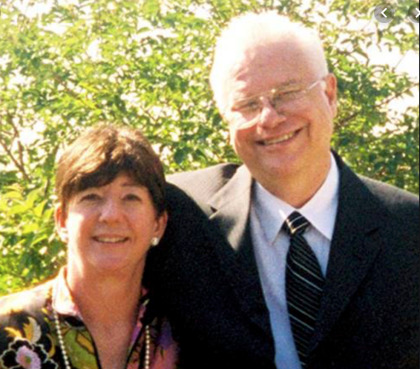
Anne Strieber had been helping her husband Whitley read through the thousands of letters he’d received after the publication of his bestseller Communion in 1987. They found that many people were mentioning encountering “aliens” during Near Death Experiences, or images of their passed-on loved ones during abductions. Anne said, “this is about the dead”—giving her husband a founding revelation as to the meaning of his strange experiences.[34] Eventually Strieber remembered seeing a childhood friend who had passed on during his first recalled abduction experience in 1986, and, although he never has considered himself a medium, has had extended interactions with the passed-on and “ghost-like persons”[35] for 40 years.
From then onward he looked at the Visitors (as he has always called them) as some sort of communication conduit to our evolution—again, what has become a common idea in the experiencer and channeling communities.[36]
In Part 2 of this essay, we will examine how technology has now become an dominant metaphor for the transmission of messages and humanity itself.
—————————-
[1] See Vallee’s Passport to Magonia and other works, and Keel’s Operation Trojan Horse.
[2] For even one of these reports to be taken as the truth, we have to conjecture that a very strong form of mental suggestion was at work at the least. Fair enough. But if multiple good witnesses were present at such a display, what are we to make of the physical manifestations?
[3] This “vocabulary of divine movement” is, strangely enough, echoed in the series The OA, in which the protagonists’ magic motions are learned during near-death experiences.
[4] See The Shaker Experience in America by Stephen J. Stein, Yale University Press, 1992, pgs. 165-200.
[5] Gauld, Alan. A History of Hypnotism, Cambridge University Press, 1995, 41-49, 53-57, 62-64, 79, 103, 107, 143-44, 165, 252-53.
[6] See Brown, Slater. The Heyday of Spiritualism, Pocket Books, 1972, pgs. 84-110.
[7] Gauld, pgs. 141-155.
[8]Ibid, pgs. 85-86, 103, 137-38, 146-9, 151-53, 182, 234-39.
[9] Saturnine spirits or “gods” figure as the focus of many religions, like the Nommo, teachers of the Dogon of Mali. In their case, the Dogon claimed the Nommo are now in “hibernation” in a vehicle or moon around Saturn but originally came from Sirius.
[10] Gauld, 1995, pg. 191.
[11] UFO researchers who believe that physical ET craft are visiting earth are mostly astronomers, engineers, physicists, etc.—those who adhere to the materialist mindset. They predictably scoffed at Layne’s explanation for the ET interlopers. Most of our religious and physicalist-oriented society ridiculed both camps of ET believers. A hierarchy of the damned (as Charles Fort might have put it) came into being regarding the origin of UFOs, and in the 1950s, the lowest in the food chain was the quasi-Theosophist channeler of ET wisdom.
[12] This has a parallel in general psi studies, called the decline effect, which occurs to individuals who may initially score high against chance in tests, then eventually revert back to the average. The decline in spectacular séance phenomena, at least as recorded by parapsychological associations, seems to be a collective manifestation of this same statistical effect, and plays into Vallee’s idea of an intermittent schedule reinforcement.
[13] Excluding today’s popular spirit channels such as John Edwards (who never submit to SPR-like experimental strictures), where are such persons who, were they test subjects, would by all accounts easily challenge the physicalist paradigm? One could make the case that Edgar Cayce, Stefan Ossowiecki, Uri Gellar, Ted Owens, Ingo Swann, Hella Hamid, Joseph McMoneagle, or the talented SRI remote viewers have been our contemporary equivalents, but none except Cayce (and sometimes Gellar) required a trance. Most achieved their psi-conducive states either consciously, that is willfully, or through self-suggested mild trance. In the 1970s-1990s the US military and intelligence agencies secretly entered the psi research field via the Stanford Research Institute/NASA/CIA remote viewing programs and the DIA’s Project Stargate (of which McMoneagle was the central psychic). This originated partly in reaction to similar Soviet programs at the time—a clandestine “psychic arms race,” as SRI coordinator Russell Targ put it. I’d submit these projects are still ongoing, and thus the most talented individuals have been sought and vacuumed up (perhaps even on a worldwide scale) by these secret programs for the intelligence/military agencies’ exclusive use, probably for significant remuneration as “contractors.”
[14] For anyone inclined with an open mind to read through this voluminous case-study research and analysis, it is pretty clear that the strict materialist model of reality must be bullshit.
[15] Carter, Chris. Science and Psychic Phenomena: The Fall of the House of Skeptics, Inner Traditions, 2012, pgs. 63-65, 70-71, 76-77, 82-104.
[16] Seances were old hat and wouldn’t make good television. Is this transformation to invisibility just an artifact of how radically media changed forms? An “information glut,” although of a slower pace, existed before the internet threw everything at us at once; thousands of magazines competed for attention, mass market paperbacks made home libraries cheaper, and television flooded the living room with visions of what life was supposed to be like. Invisible though were its electromagnetic means, radio and TV mass media were compelled by market forces to focus on the tangibles of the world: war, politics, economics, scandals, social movements, etc. Combined with the unspoken embargo on promoting religious views, the media offered no outlet to the “alternative altars” of countercultural spirituality that nevertheless existed (and flourished in some places).
[17] Anthony Borgia, Life in the World Unseen, Corgi Books/Transworld Publications, 1970
[18] Vallee, Jacques. Dimensions: A Casebook of Alien Contact, Anomalist Books, 2008, pgs. 271-281; The Invisible College, Anomalist Books, 2014, pgs. 194-206.
[19] See Vallee’s Messengers of Deception: UFO Contacts and Cults.
[20] Beloff, John. Parapsychology: A Concise History, pgs. 231-32.
[21] Ibid, pg. 233.
[22] https://ufoarchives.blogspot.com/2019/02/the-esoteric-intervention-theory-updated.html
[23] https://ufoarchives.blogspot.com/2016/04/paranormal-phenomena-and-academic.html
[24] The Gods Have Landed, State University of New York Press, 1995, James R. Lewis, ed.; from the essay “Religious Dimensions of the UFO Abductee Experience” by John Witmore, pg. 66.
[25] Although there continue to be self-published abduction memoirs, by the millennium the mainstream publishing industry had moved on. Another reason for this may be that since roughly the year 2000, abduction experiencers have shunned reporting the experiences to scientists or psychologists or therapists and turned instead to the communities of other experiencers on the internet.
[26] See Wilson, Colin. Poltergeist! A Study in Destructive Haunting, Putnam, 1982, pgs. 278-79, and the case of Icelandic mediumIndridi Indridason.
[27] That is, unless some “deceased person” is found to be associated with the site or attached to the focus person, or a crime against the focus person is revealed by subsequent/concurrent therapeutic procedures with the focus. One theory holds that a discharge of repressed psychic energy through therapeutic abreaction often causes the poltergeist activity to cease. But it does cease, unlike those abduction experiencers who report the events continuing for years or even decades.
[28] Gauld, Alan and Cornell, A.D. Poltergeists, White Crow Books, 2018, pgs. 176-180, 188-89, 202-207, 283-84.
[29] Tyrrell, G.N.M. Apparitions, Collier Books, 1963, pgs. 110-114.
[30] Tyrrell, (1963) pgs. 102-127, 131-34.
[31] Green, Celia, and McCreery, Charles, Apparitions, Hamilton Press, 1975; Green and McCreery, Lucid Dreaming, Routledge, 1994; UFOs: The Final Answer? Ufology for the 21St Century, Barclay, David and therese Marie, eds., Blandford Press, 1993, pgs. 130-153.
[32] See Haraldsson, Erlendur and Gissurarsson, Loftur R. Indridi Indridason: The Icelandic Physical Medium, White Crow Books, 2015, for a full account of Indridi’s short but astounding career.
[33] Schneider
[34] Strieber, Whitley and Kripal, Jeffrey J. The Super Natural: A New Vision of the Unexplained, Jeremy P. Tarcher, Penguin, 2016, pgs. 37, 53, 82.
[35] See Strieber’s book The Key, in which, while on a book tour in 1998, he had a late-night visit from an anonymous man who communicated to him revelations, not unlike a spirit-guide or Carl Jung’s daemon Philemon.
[36] We might examine the overlap between poltergeist/hauntings and fairy/djinn encounters (the evidence for which there is plenty), but that would involve a monumental cross-cultural comparison. All we can say is that the maturation of scientific classification systems from the 18th to 20th centuries allowed for distinctions to be made between apparitions, hauntings, fairy/djinn encounters, and the poltergeist. And for the past 70 years we have had UFOs and “alien beings” to add to the unexplained. The folk division between the fairy-daemon and the dead was always indistinct, from antiquity to the beginning of the 20th century. (See the works of Katherine Briggs, Thomas Keightley, Reverend Robert Kirk, and W.Y. Evans-Wentz). Fairies’ status as the “dead awaiting salvation” (one fairy in an encounter tale openly admits such) caused the Protestant elite no small manner of discomfort, because it paralleled the Catholic belief in a purgatorial existence between life and heaven or hell. The middle ground between binarities must be excluded, in religion as well as science. Let’s just say that what always distinguished human ghosts from the Good People was the fairies’ interests in partying and dancing, staying aloof from humans who disrespected them, and kidnapping people to marry or—especially—have sex with them to hybridize a new kind of being, one perhaps closer to full corporeality.
Old Wine in New Skins Part 1: Timed Cultural Interventions & Jacques Vallee’s Paraspiritual Control System Psi phenomena are problematic precisely because they involve events in the real world and thus become…
#apparitions#Communication#Contact Modalities#hermeticism#Jacques Vallee#Mediumship#NHI#Non-Human Intelligence#parapsychology#poltergeists#psychology#seance#Spiritualism#Theosophy
0 notes